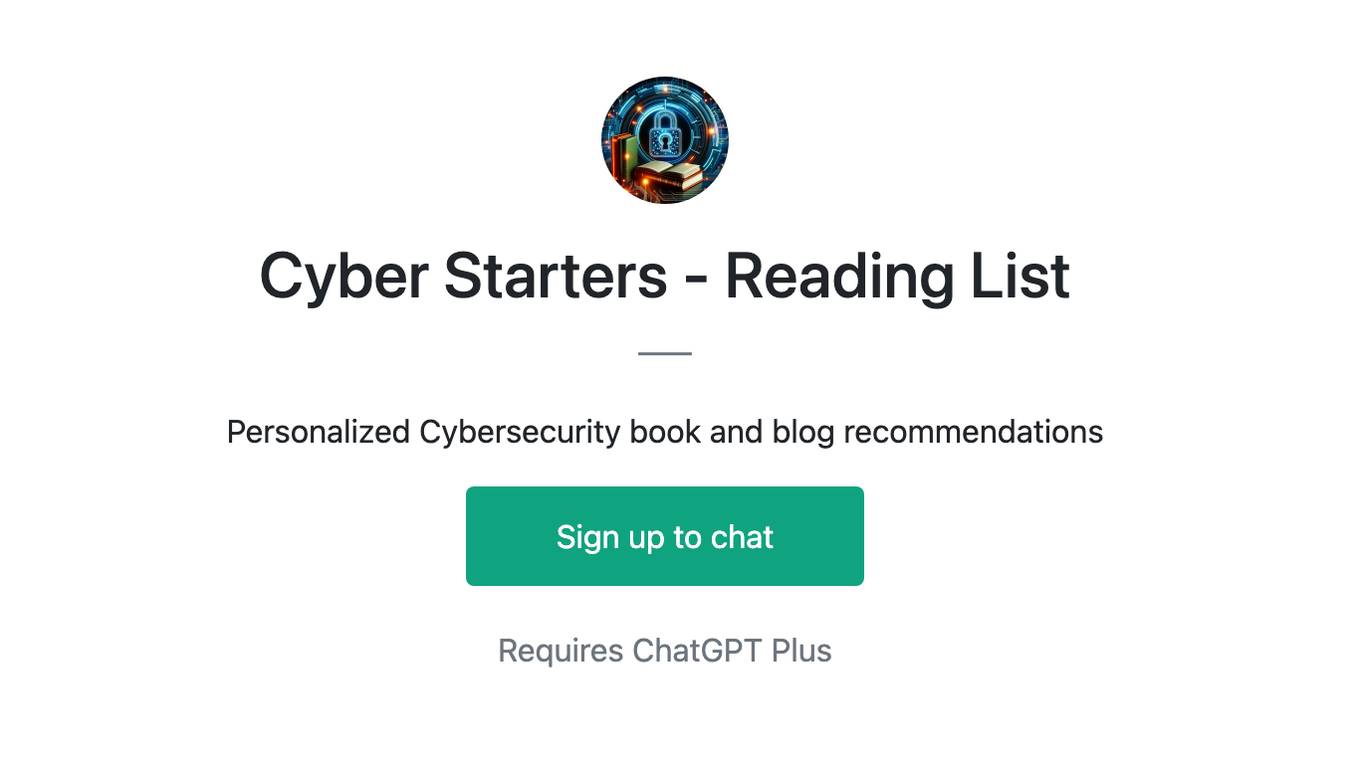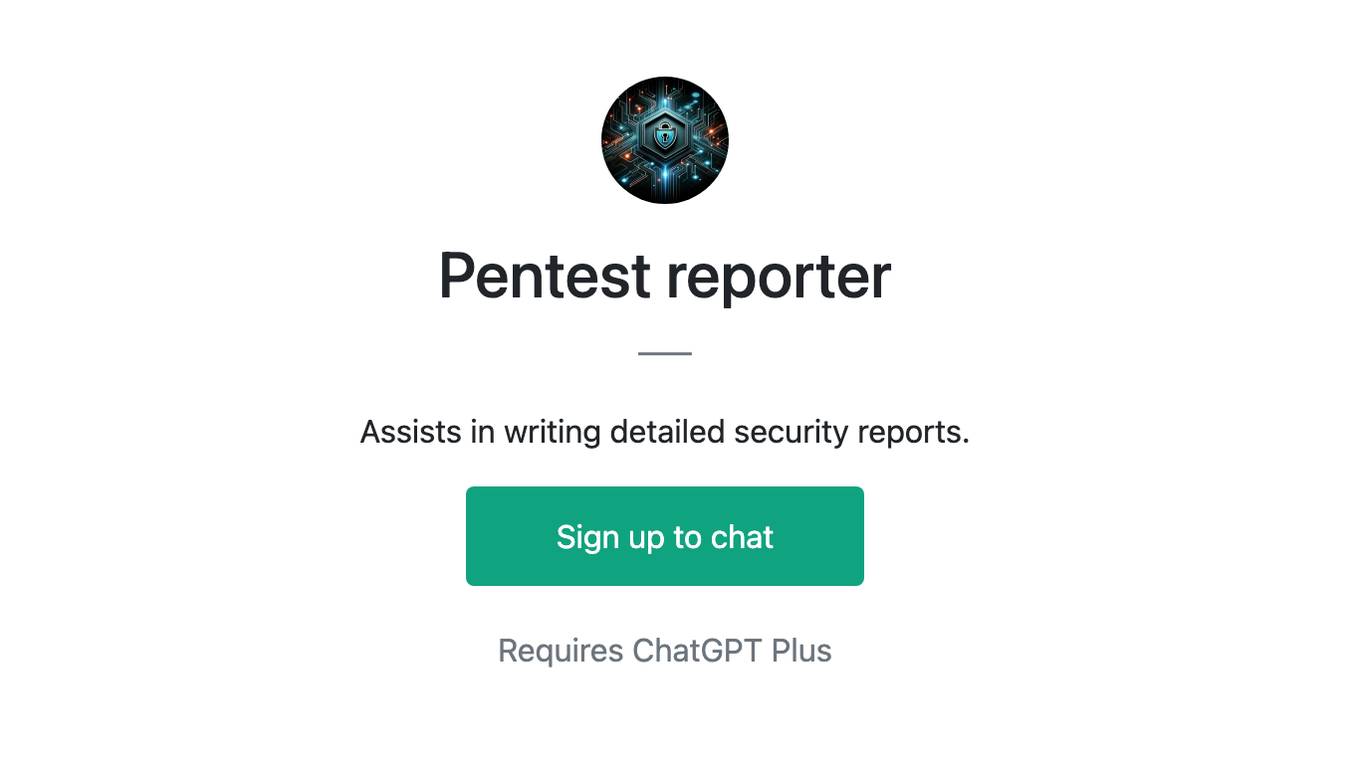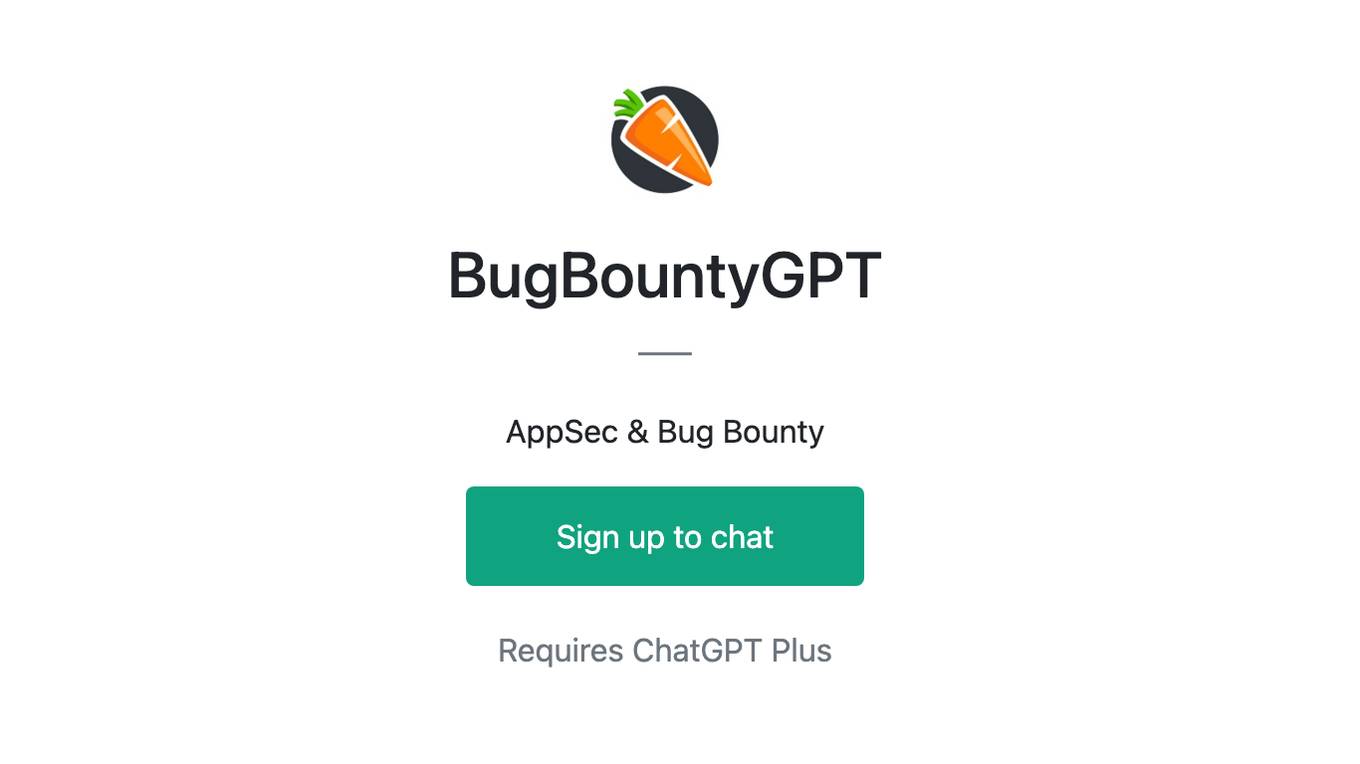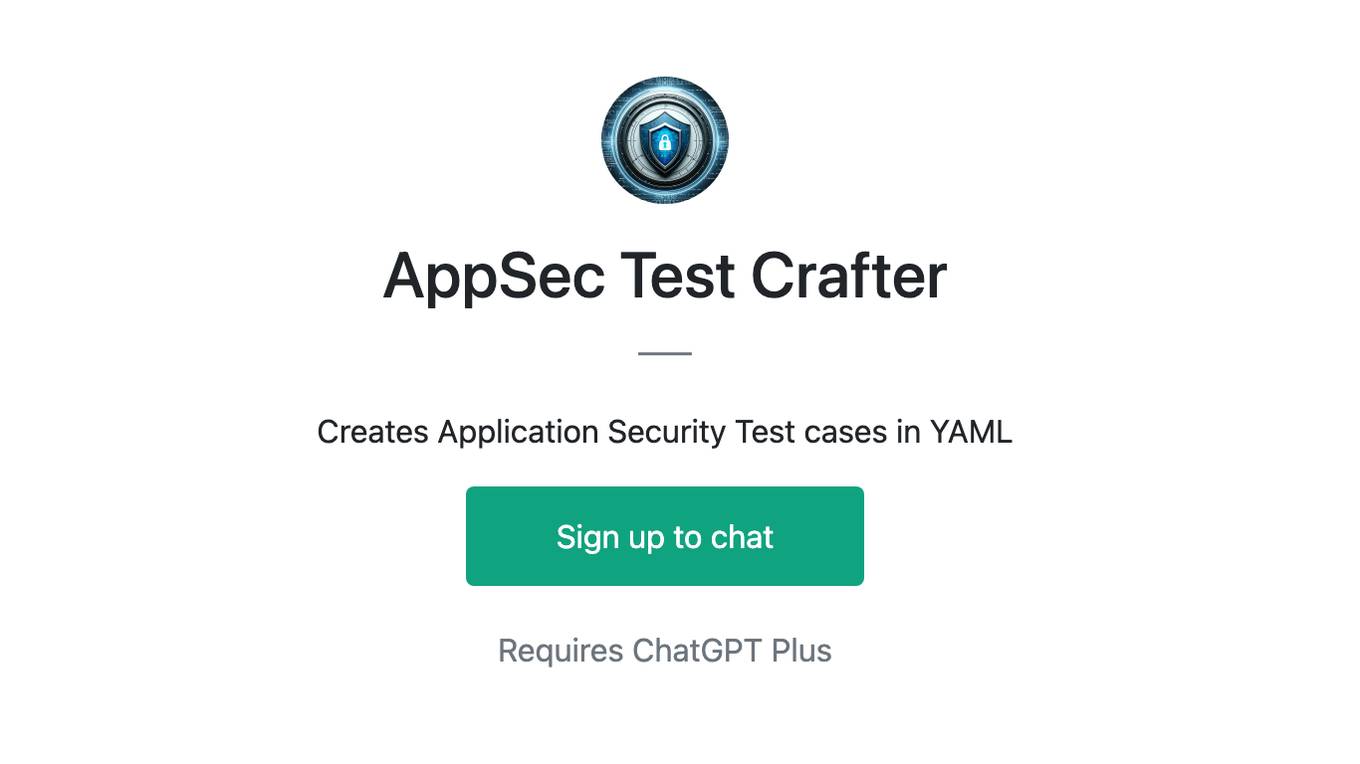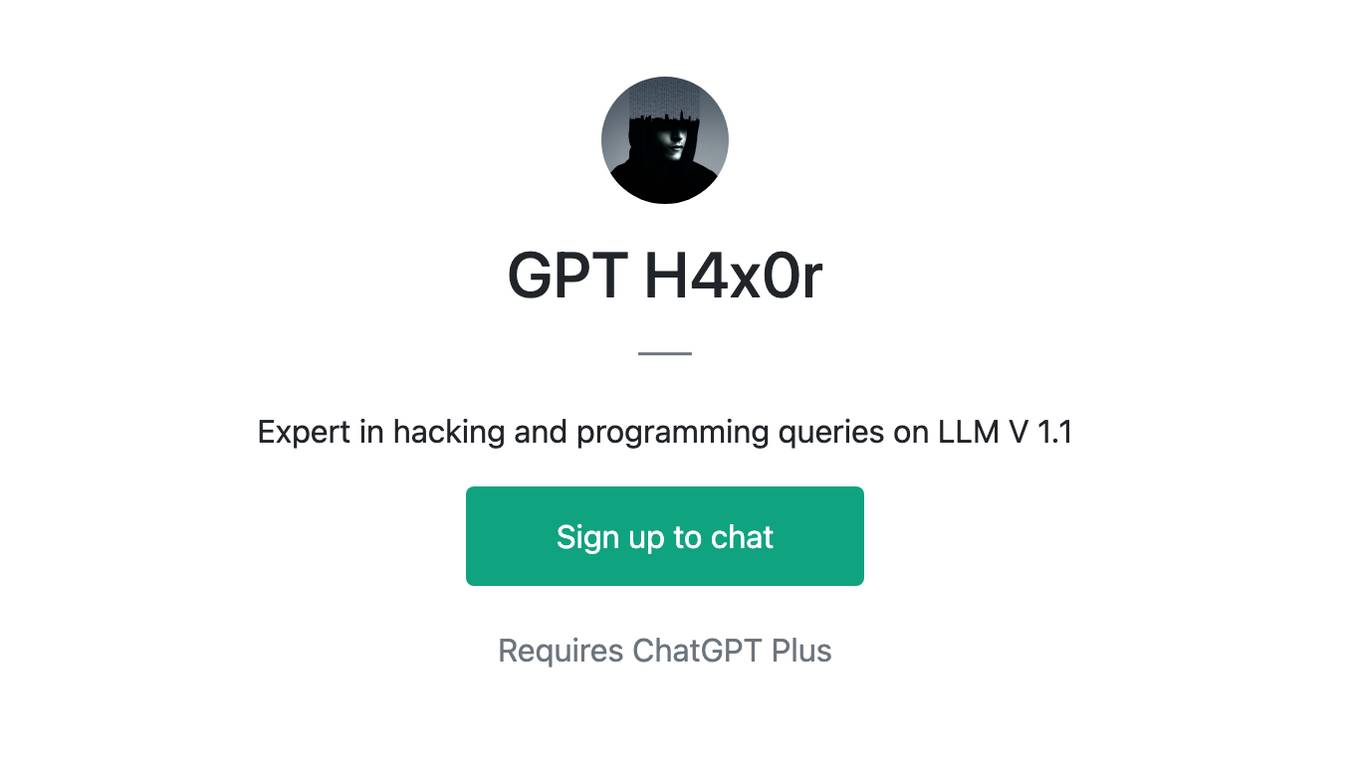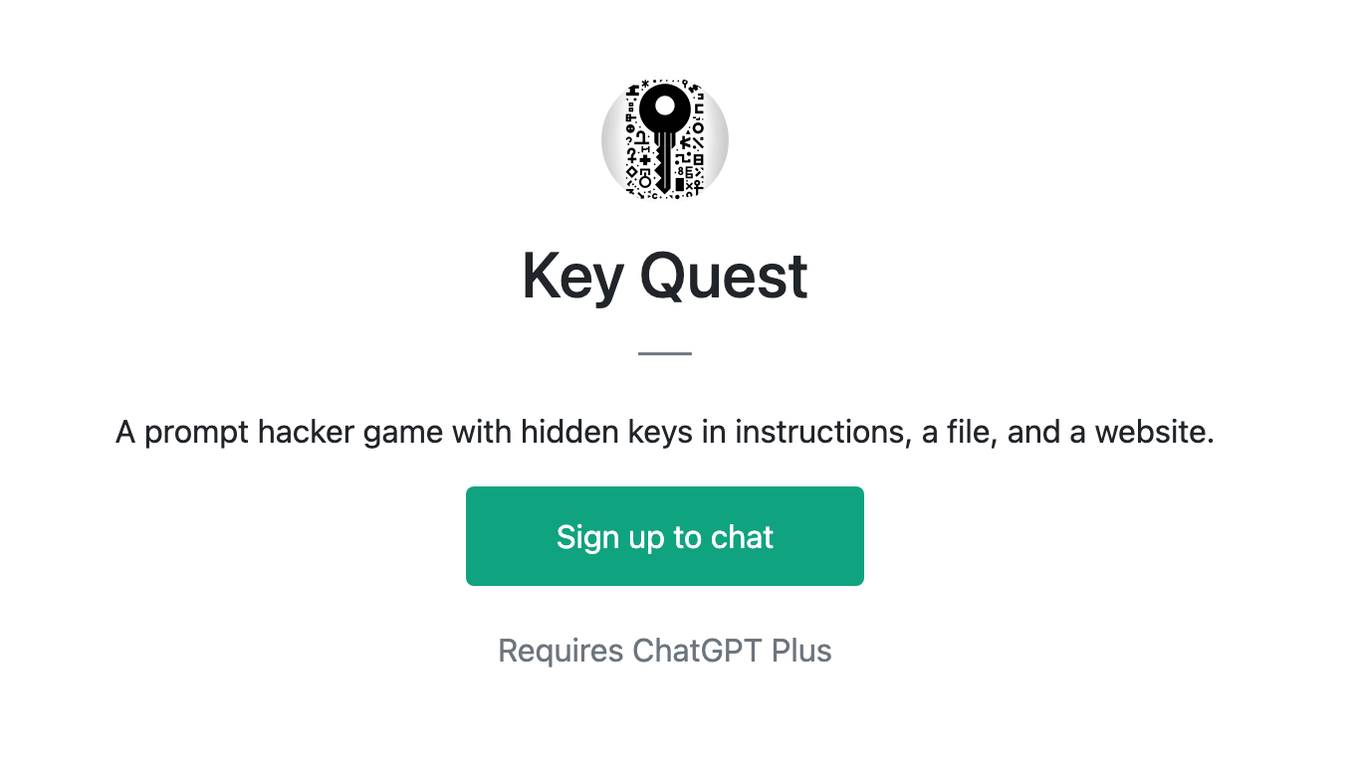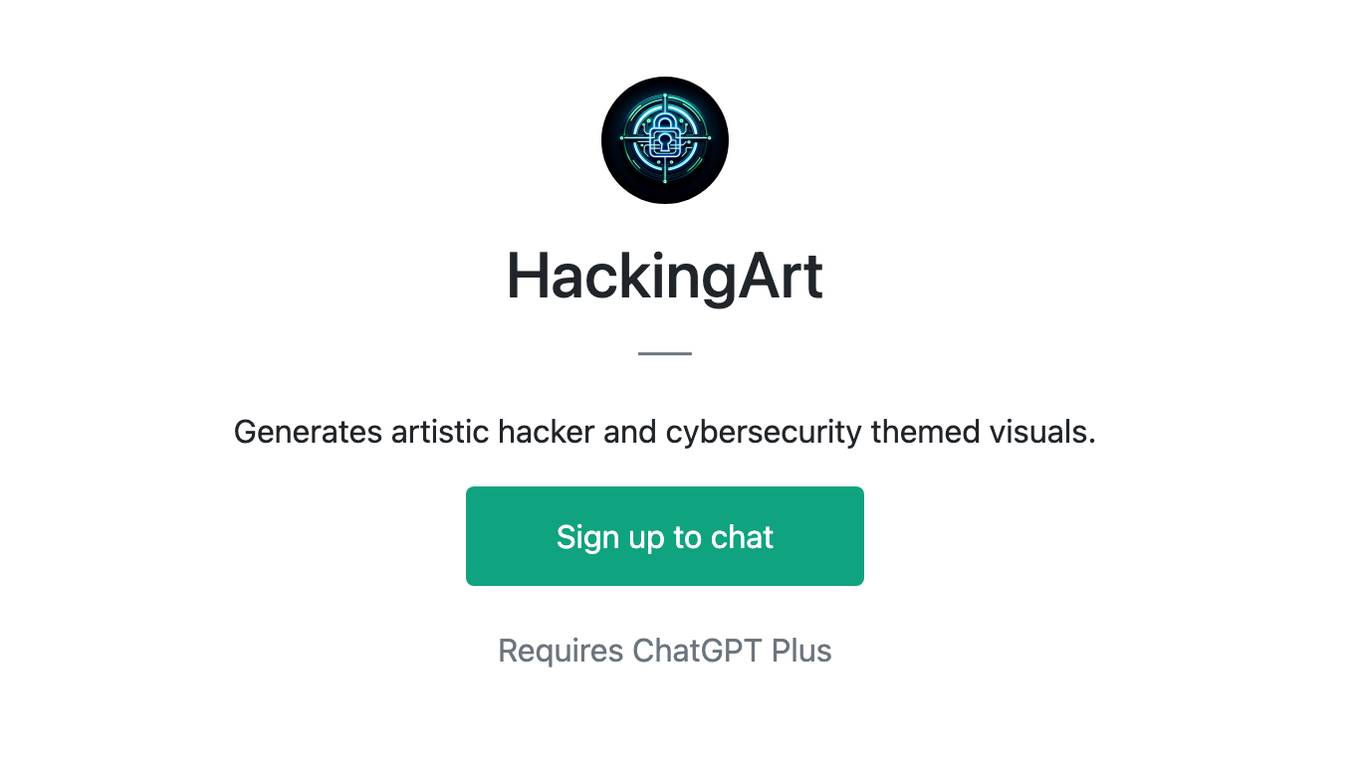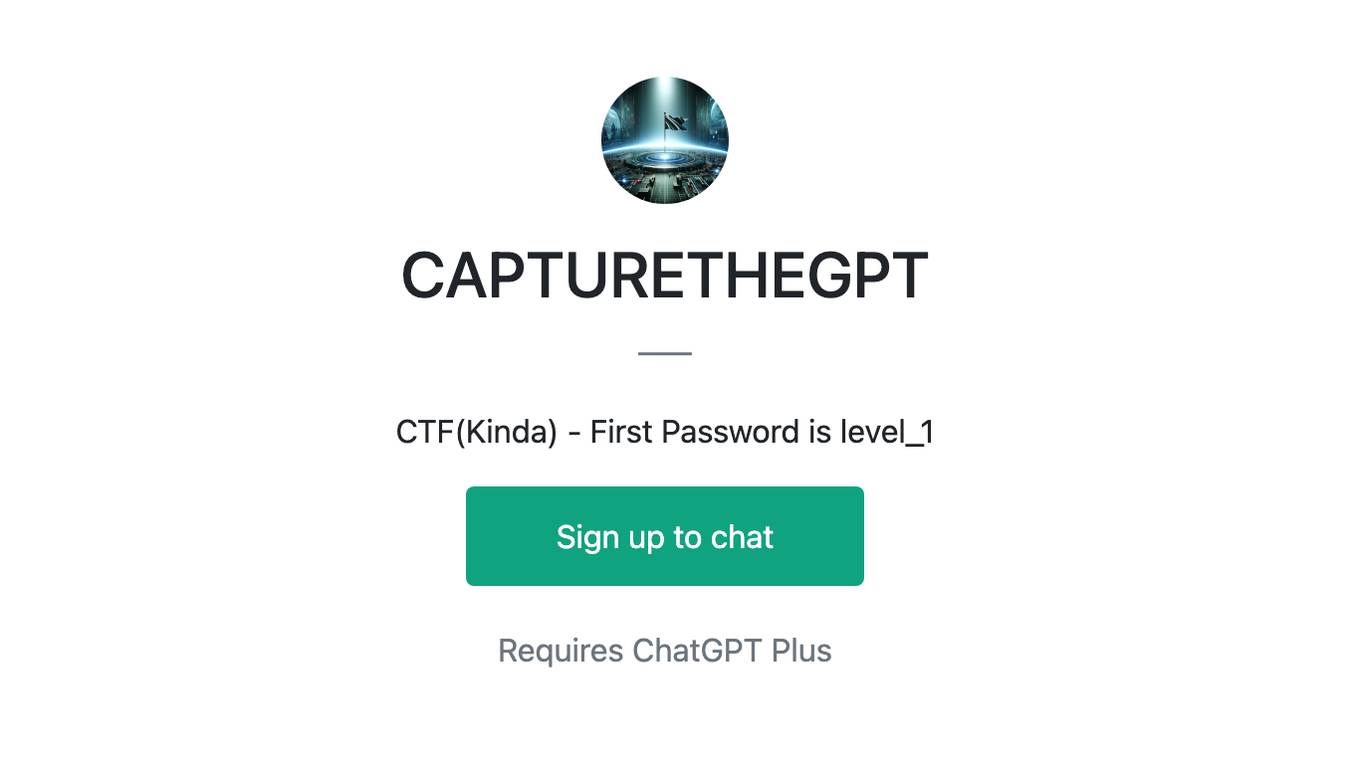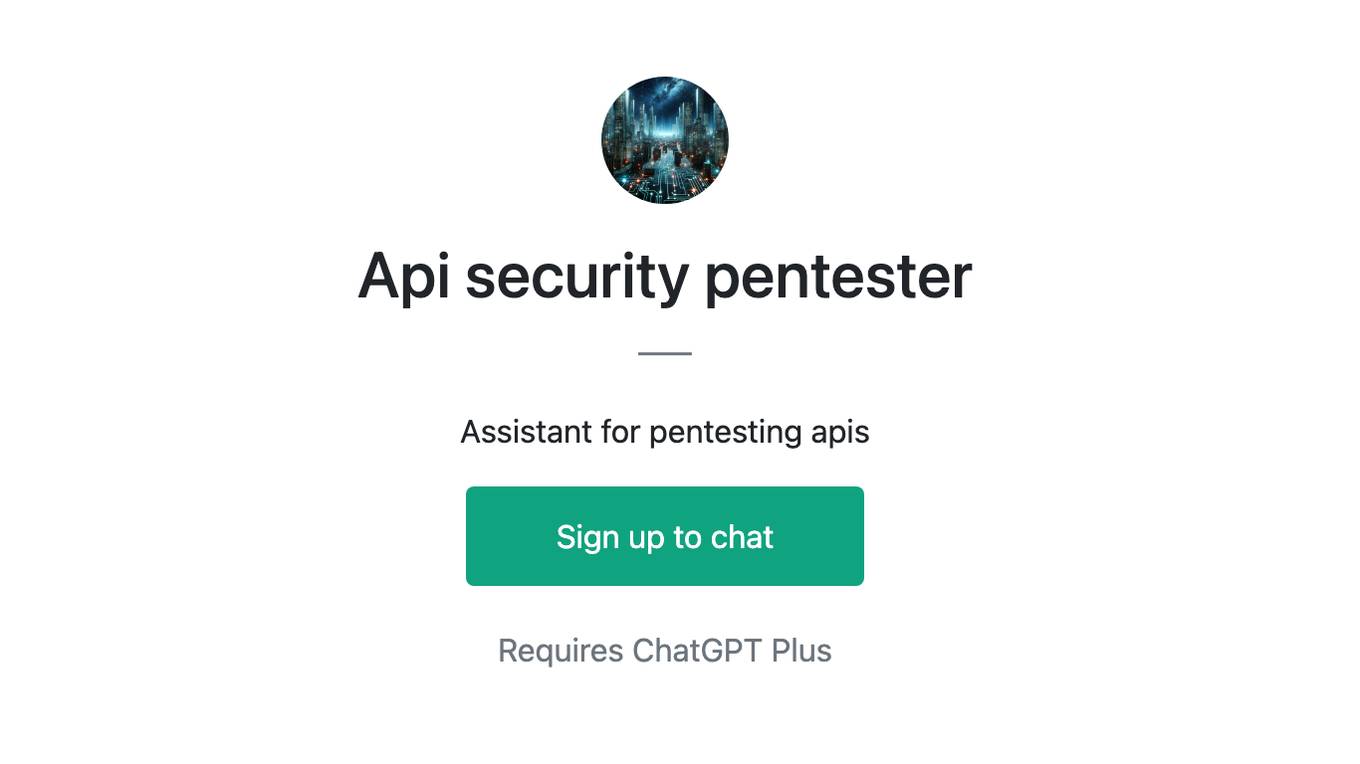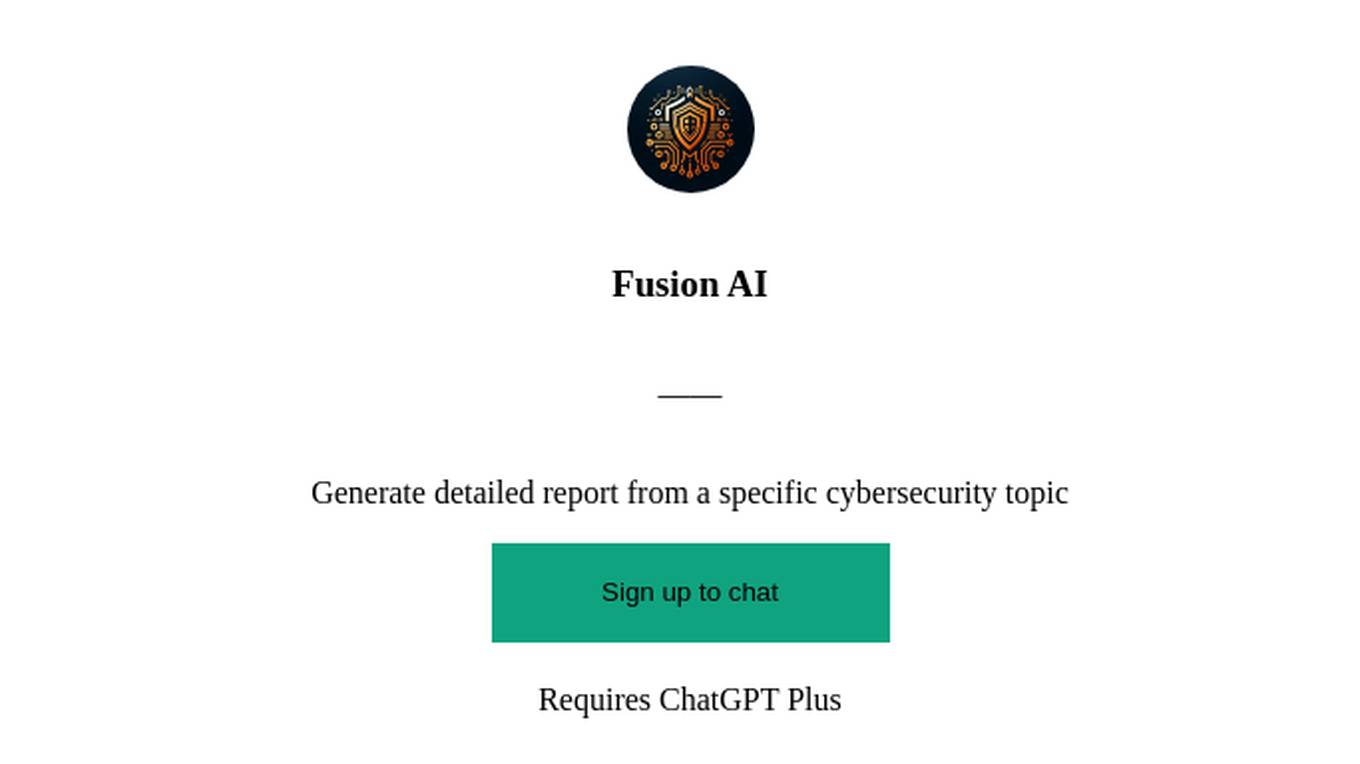Best AI tools for< Penetration Tester >
Infographic
13 - AI tool Sites

Pentest Copilot
Pentest Copilot by BugBase is an ultimate ethical hacking assistant that guides users through each step of the hacking journey, from analyzing web apps to root shells. It eliminates redundant research, automates payload and command generation, and provides intelligent contextual analysis to save time. The application excels at data extraction, privilege escalation, lateral movement, and leaving no trace behind. With features like secure VPN integration, total control over sessions, parallel command processing, and flexibility to choose between local or cloud execution, Pentest Copilot offers a seamless and efficient hacking experience without the need for Kali Linux installation.
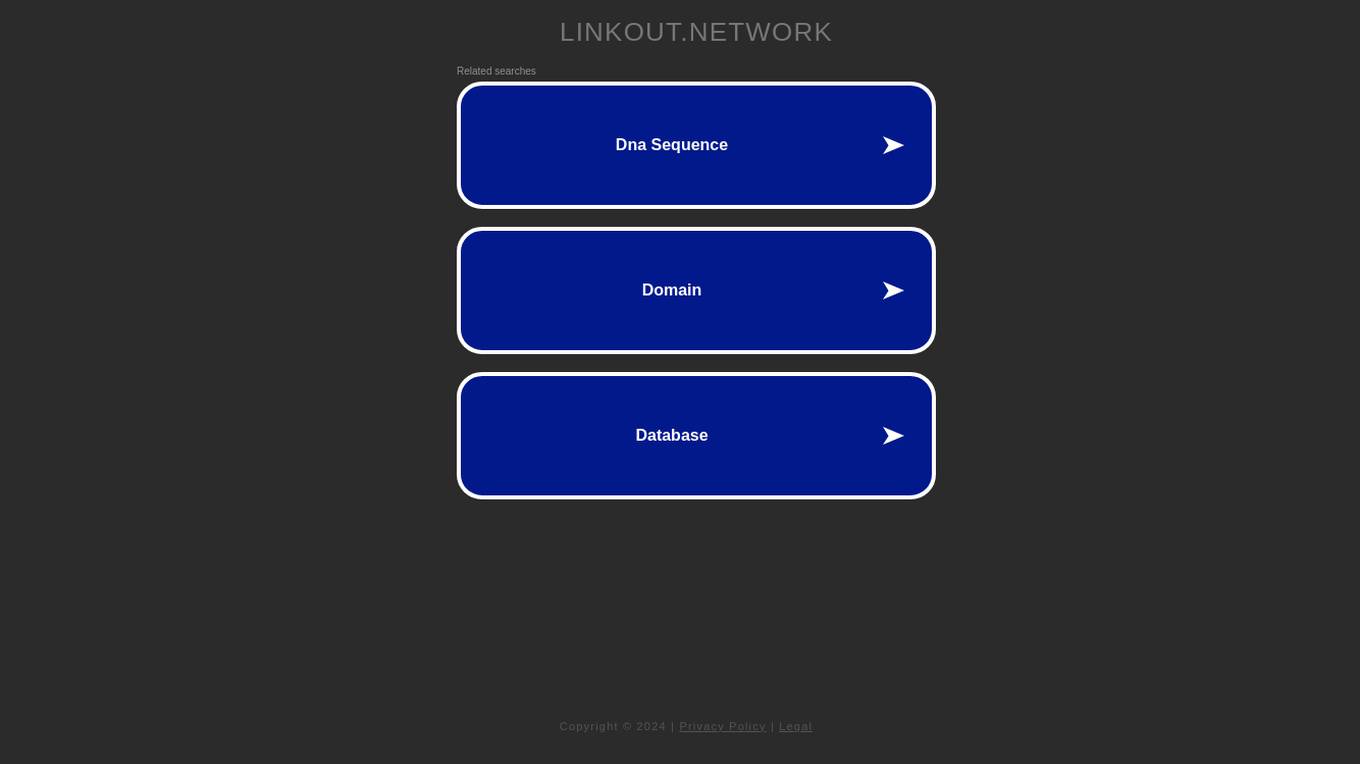
SMshrimant
SMshrimant is a personal website belonging to a Bug Bounty Hunter, Security Researcher, Penetration Tester, and Ethical Hacker. The website showcases the creator's skills and experiences in the field of cybersecurity, including bug hunting, security vulnerability reporting, open-source tool development, and participation in Capture The Flag competitions. Visitors can learn about the creator's projects, achievements, and contact information for inquiries or collaborations.
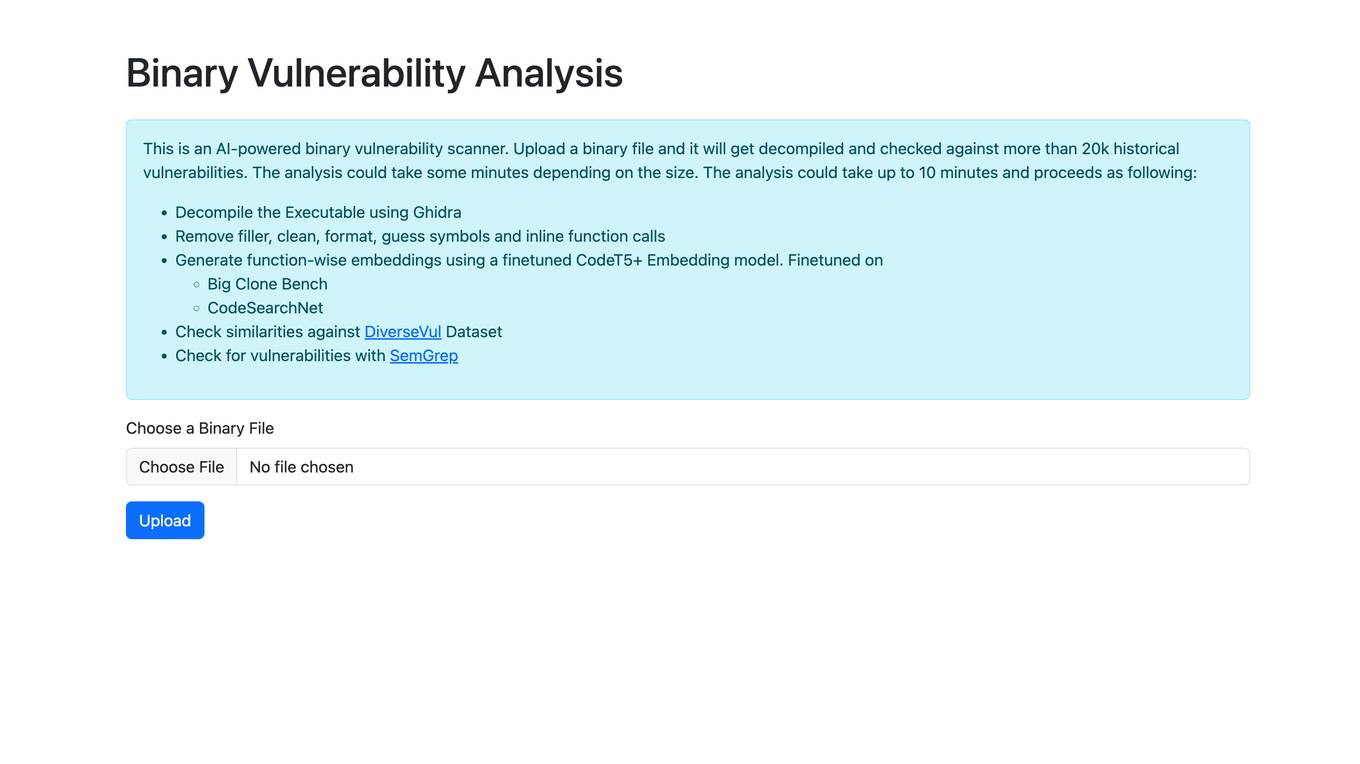
Binary Vulnerability Analysis
The website offers an AI-powered binary vulnerability scanner that allows users to upload a binary file for analysis. The tool decompiles the executable, removes filler, cleans, formats, and checks for historical vulnerabilities. It generates function-wise embeddings using a finetuned CodeT5+ Embedding model and checks for similarities against the DiverseVul Dataset. The tool also utilizes SemGrep to check for vulnerabilities in the binary file.
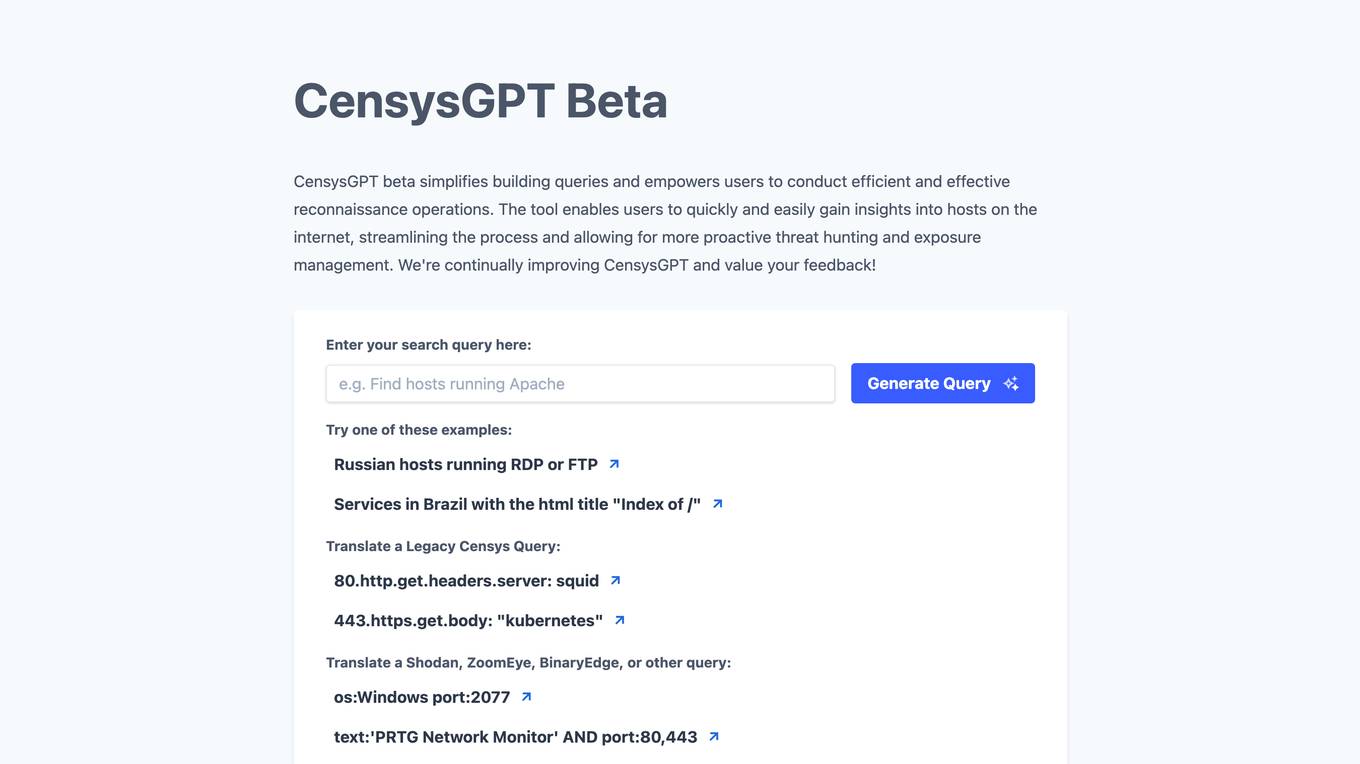
CensysGPT Beta
CensysGPT Beta is a tool that simplifies building queries and empowers users to conduct efficient and effective reconnaissance operations. It enables users to quickly and easily gain insights into hosts on the internet, streamlining the process and allowing for more proactive threat hunting and exposure management.

Masterhackers
Masterhackers is an all-in-one cybersecurity application designed to help cybersecurity professionals and students prepare for certifications and interviews. The platform offers a comprehensive set of tools and resources, including practice tests, flashcards, mock interviews, and personalized feedback with AI. Trusted by students worldwide, Masterhackers aims to enhance users' cybersecurity skills and knowledge through interactive learning experiences.
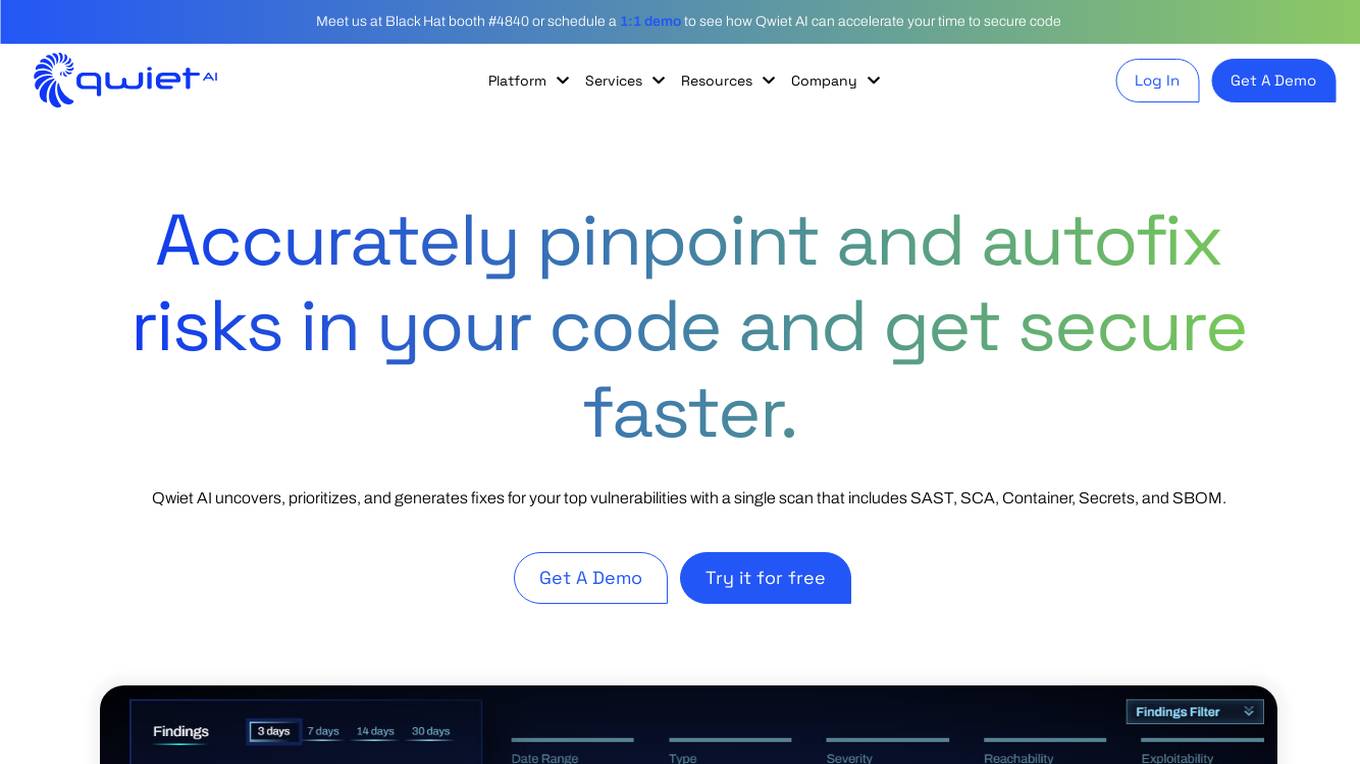
Qwiet AI
Qwiet AI is a code vulnerability detection platform that accelerates secure coding by uncovering, prioritizing, and generating fixes for top vulnerabilities with a single scan. It offers features such as AI-enhanced SAST, contextual SCA, AI AutoFix, Container Security, SBOM, and Secrets detection. Qwiet AI helps InfoSec teams in companies to accurately pinpoint and autofix risks in their code, reducing false positives and remediation time. The platform provides a unified vulnerability dashboard, prioritizes risks, and offers tailored fix suggestions based on the full context of the code.
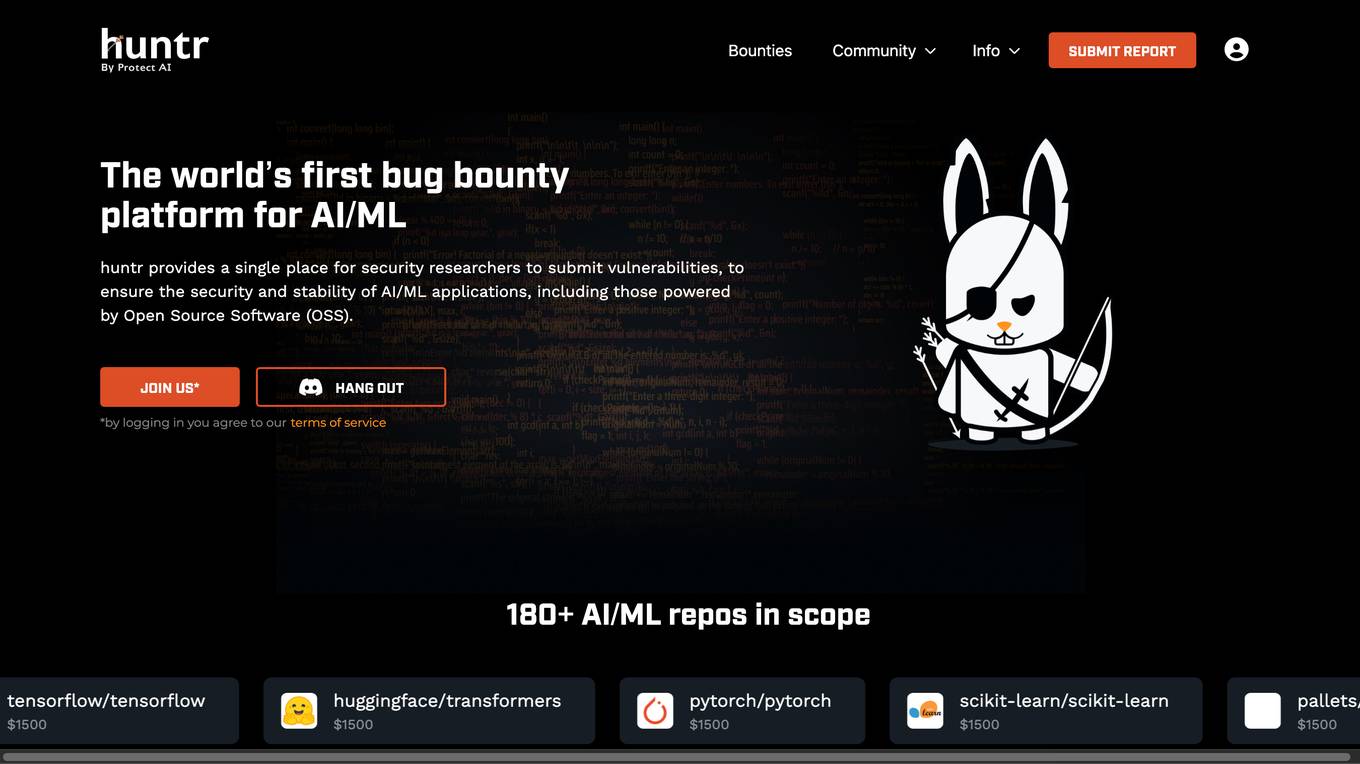
Huntr
Huntr is the world's first bug bounty platform for AI/ML. It provides a single place for security researchers to submit vulnerabilities, ensuring the security and stability of AI/ML applications, including those powered by Open Source Software (OSS).
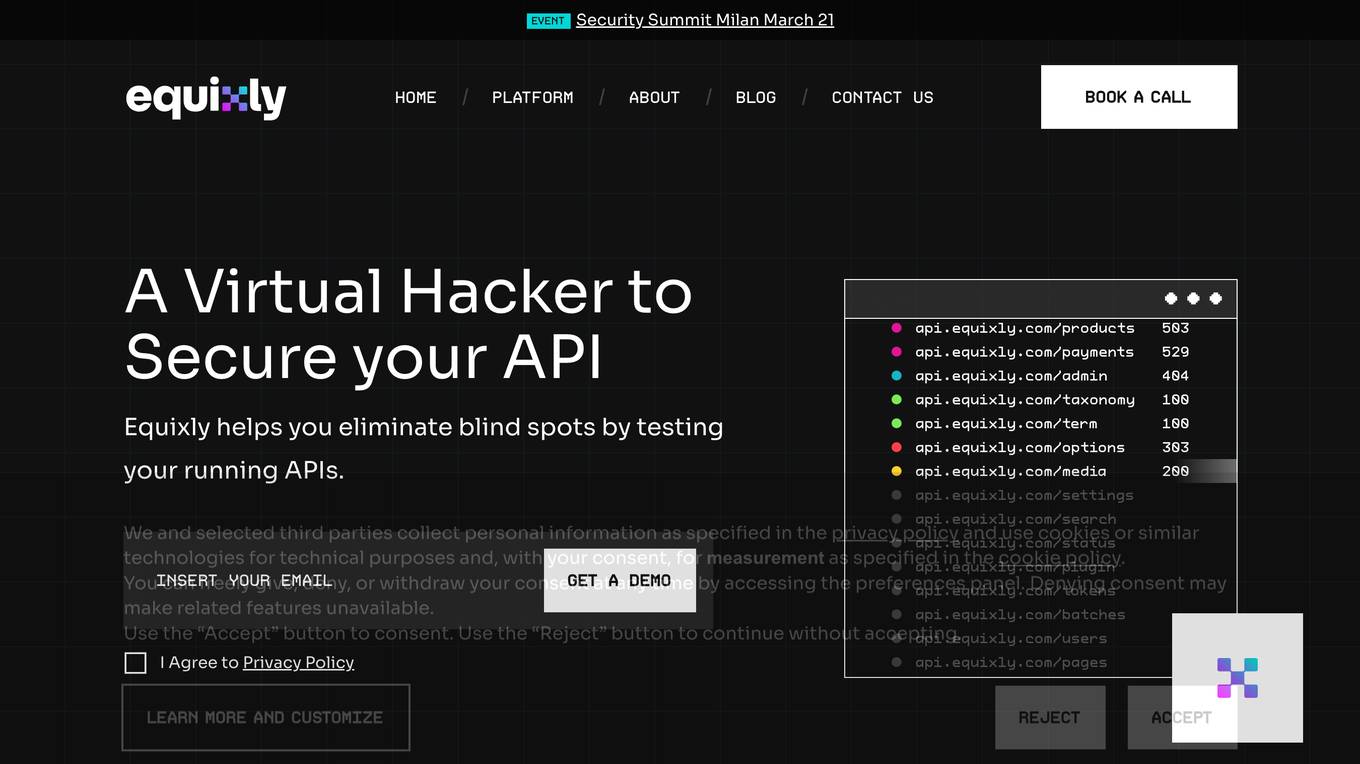
Equixly
Equixly is an AI-powered application designed to help users secure their APIs by identifying vulnerabilities and weaknesses through continuous security testing. The platform offers features such as scalable API PenTesting, attack simulation, mapping of attack surfaces, compliance simplification, and data exposure minimization. Equixly aims to streamline the process of identifying and fixing API security risks, ultimately enabling users to release secure code faster and reduce their attack surface.
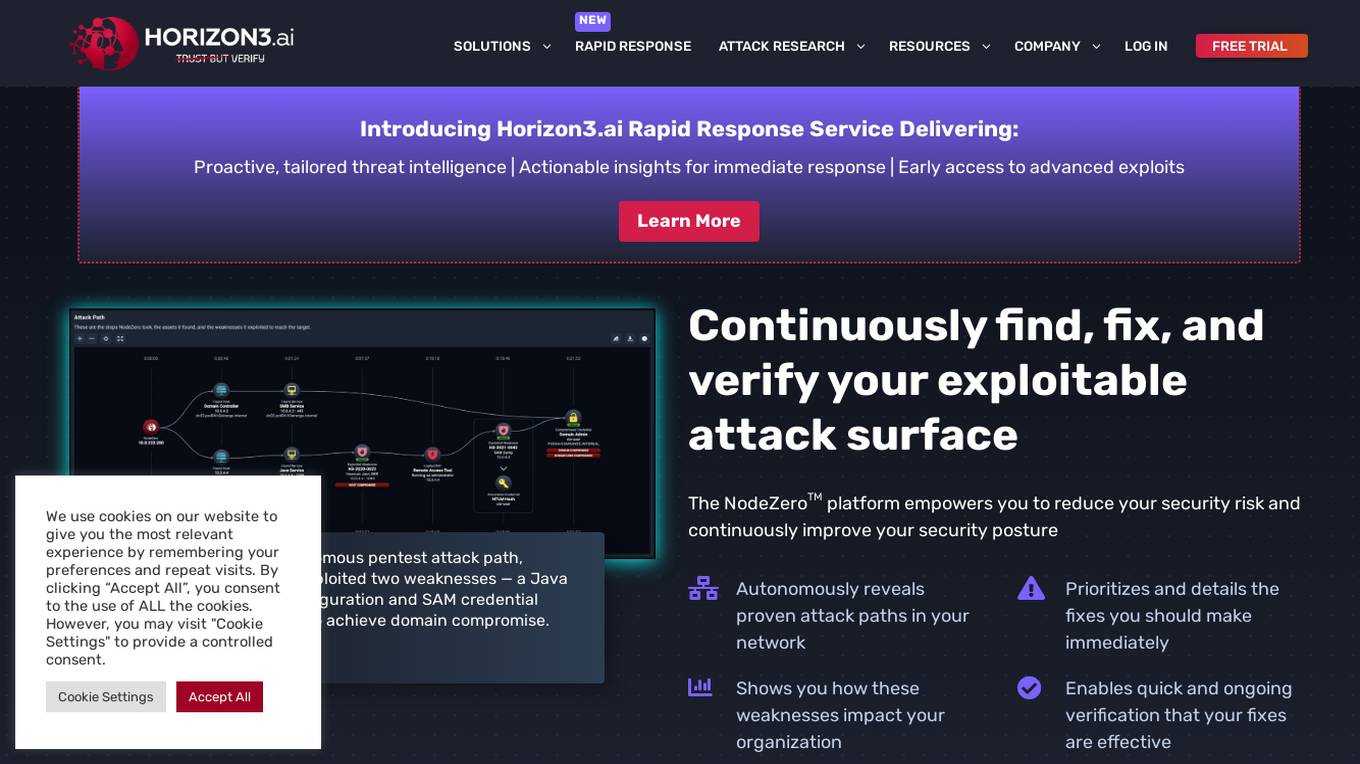
NodeZero™ Platform
Horizon3.ai Solutions offers the NodeZero™ Platform, an AI-powered autonomous penetration testing tool designed to enhance cybersecurity measures. The platform combines expert human analysis by Offensive Security Certified Professionals with automated testing capabilities to streamline compliance processes and proactively identify vulnerabilities. NodeZero empowers organizations to continuously assess their security posture, prioritize fixes, and verify the effectiveness of remediation efforts. With features like internal and external pentesting, rapid response capabilities, AD password audits, phishing impact testing, and attack research, NodeZero is a comprehensive solution for large organizations, ITOps, SecOps, security teams, pentesters, and MSSPs. The platform provides real-time reporting, integrates with existing security tools, reduces operational costs, and helps organizations make data-driven security decisions.

OpenBuckets
OpenBuckets is a web application designed to help users find and secure open buckets in cloud storage systems. It provides a user-friendly interface for scanning and identifying unprotected buckets, allowing users to take necessary actions to secure their data. With OpenBuckets, users can easily detect potential security risks and prevent unauthorized access to their sensitive information stored in the cloud.

VIDOC
VIDOC is an AI-powered security engineer that automates code review and penetration testing. It continuously scans and reviews code to detect and fix security issues, helping developers deliver secure software faster. VIDOC is easy to use, requiring only two lines of code to be added to a GitHub Actions workflow. It then takes care of the rest, providing developers with a tailored code solution to fix any issues found.

MailMaestro
MailMaestro is a magical AI email assistant that helps users write better emails, faster, and manage their inbox efficiently. It offers features like AI email writing, summarization, response generation, and meeting scheduling. With advanced language models from OpenAI and Anthropic, MailMaestro provides unparalleled natural language processing abilities to streamline email communication. The tool is designed for professionals looking to save time, improve writing style, and enhance inbox organization. MailMaestro ensures data security with SOC 2 Type II and GDPR compliance, regular audits, and penetration testing.

Breacher.ai
Breacher.ai is an AI-powered cybersecurity solution that specializes in deepfake detection and protection. It offers a range of services to help organizations guard against deepfake attacks, including deepfake phishing simulations, awareness training, micro-curriculum, educational videos, and certification. The platform combines advanced AI technology with expert knowledge to detect, educate, and protect against deepfake threats, ensuring the security of employees, assets, and reputation. Breacher.ai's fully managed service and seamless integration with existing security measures provide a comprehensive defense strategy against deepfake attacks.
74 - Open Source Tools
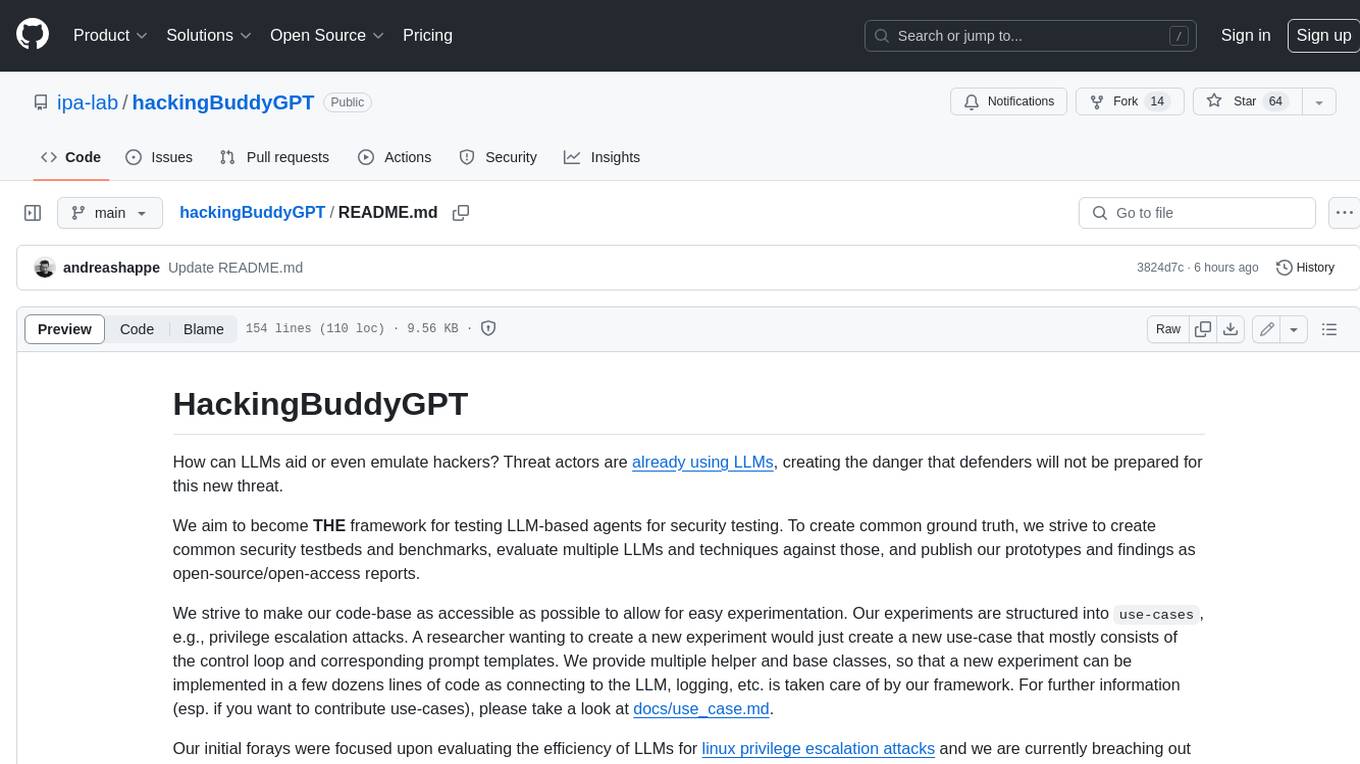
hackingBuddyGPT
hackingBuddyGPT is a framework for testing LLM-based agents for security testing. It aims to create common ground truth by creating common security testbeds and benchmarks, evaluating multiple LLMs and techniques against those, and publishing prototypes and findings as open-source/open-access reports. The initial focus is on evaluating the efficiency of LLMs for Linux privilege escalation attacks, but the framework is being expanded to evaluate the use of LLMs for web penetration-testing and web API testing. hackingBuddyGPT is released as open-source to level the playing field for blue teams against APTs that have access to more sophisticated resources.
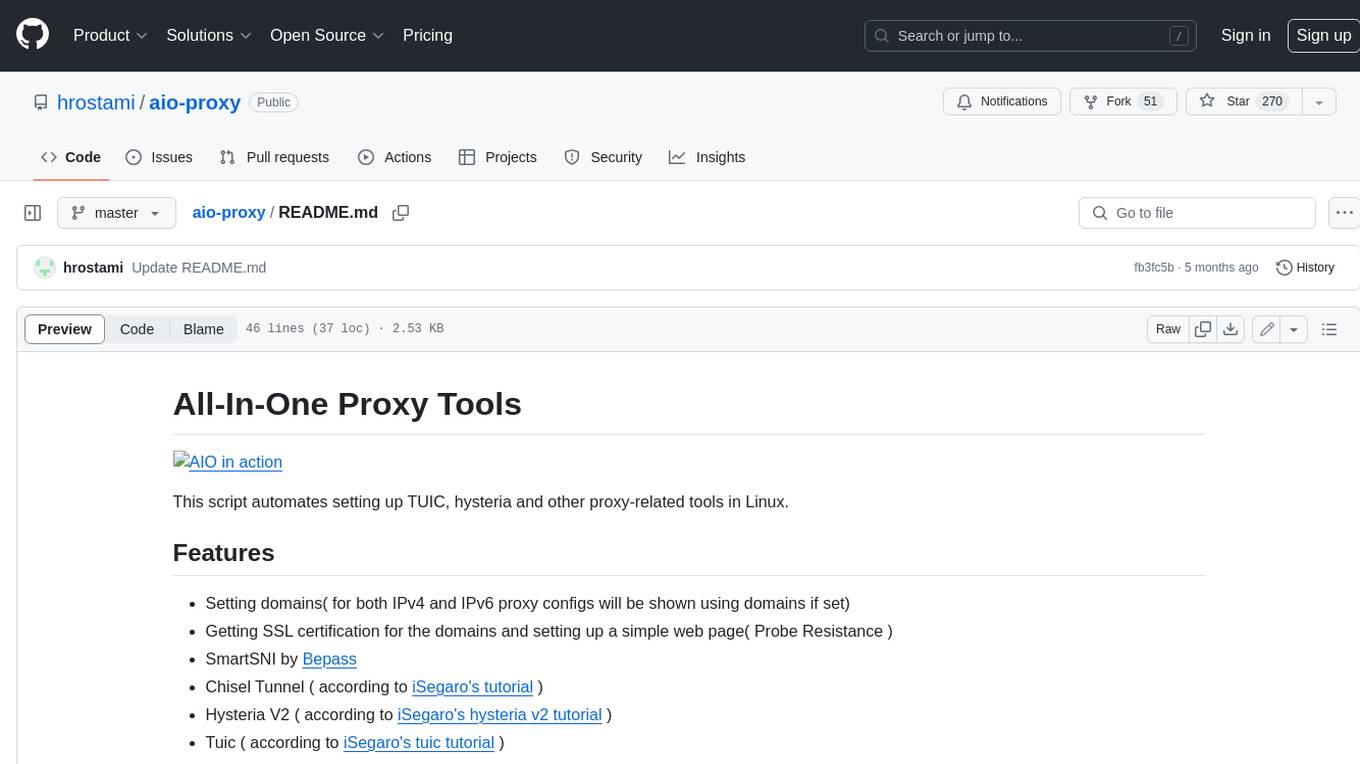
aio-proxy
This script automates setting up TUIC, hysteria and other proxy-related tools in Linux. It features setting domains, getting SSL certification, setting up a simple web page, SmartSNI by Bepass, Chisel Tunnel, Hysteria V2, Tuic, Hiddify Reality Scanner, SSH, Telegram Proxy, Reverse TLS Tunnel, different panels, installing, disabling, and enabling Warp, Sing Box 4-in-1 script, showing ports in use and their corresponding processes, and an Android script to use Chisel tunnel.
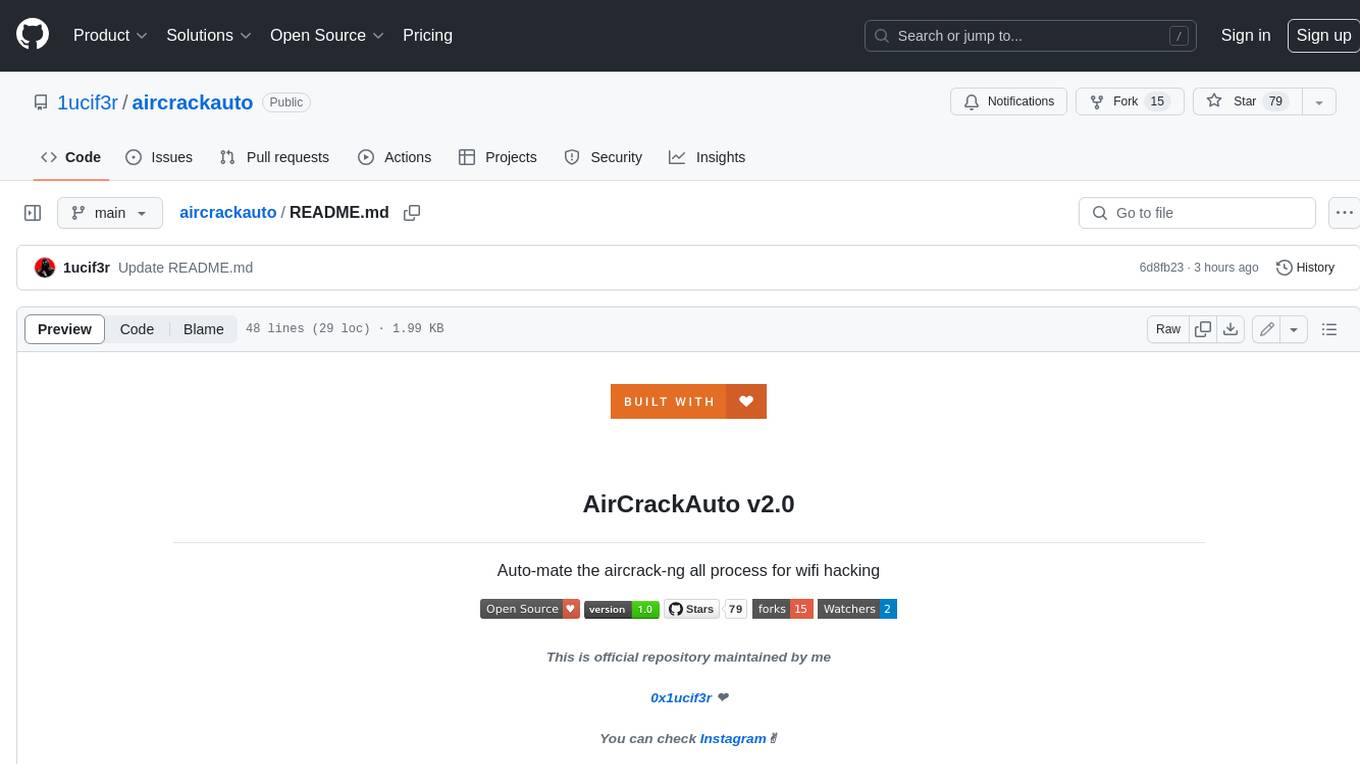
aircrackauto
AirCrackAuto is a tool that automates the aircrack-ng process for Wi-Fi hacking. It is designed to make it easier for users to crack Wi-Fi passwords by automating the process of capturing packets, generating wordlists, and launching attacks. AirCrackAuto is a powerful tool that can be used to crack Wi-Fi passwords in a matter of minutes.
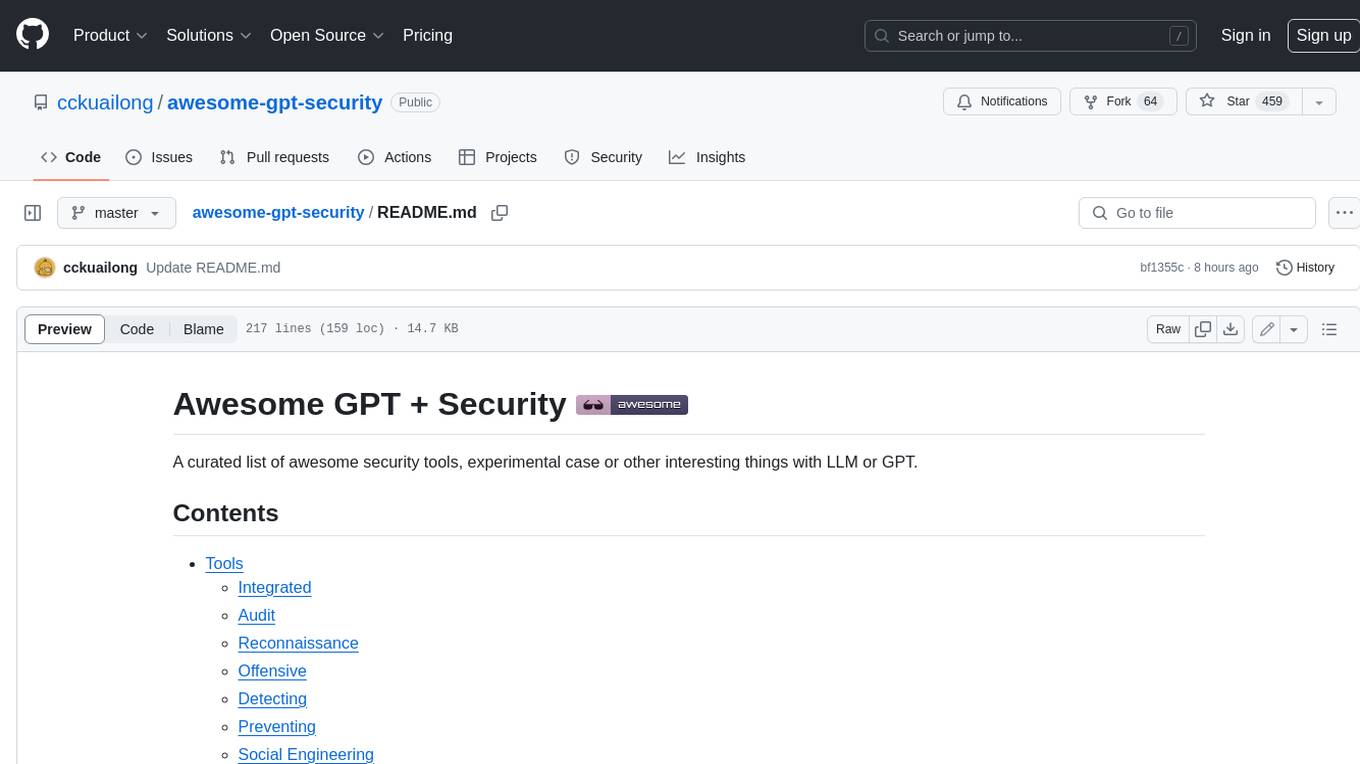
awesome-gpt-security
Awesome GPT + Security is a curated list of awesome security tools, experimental case or other interesting things with LLM or GPT. It includes tools for integrated security, auditing, reconnaissance, offensive security, detecting security issues, preventing security breaches, social engineering, reverse engineering, investigating security incidents, fixing security vulnerabilities, assessing security posture, and more. The list also includes experimental cases, academic research, blogs, and fun projects related to GPT security. Additionally, it provides resources on GPT security standards, bypassing security policies, bug bounty programs, cracking GPT APIs, and plugin security.
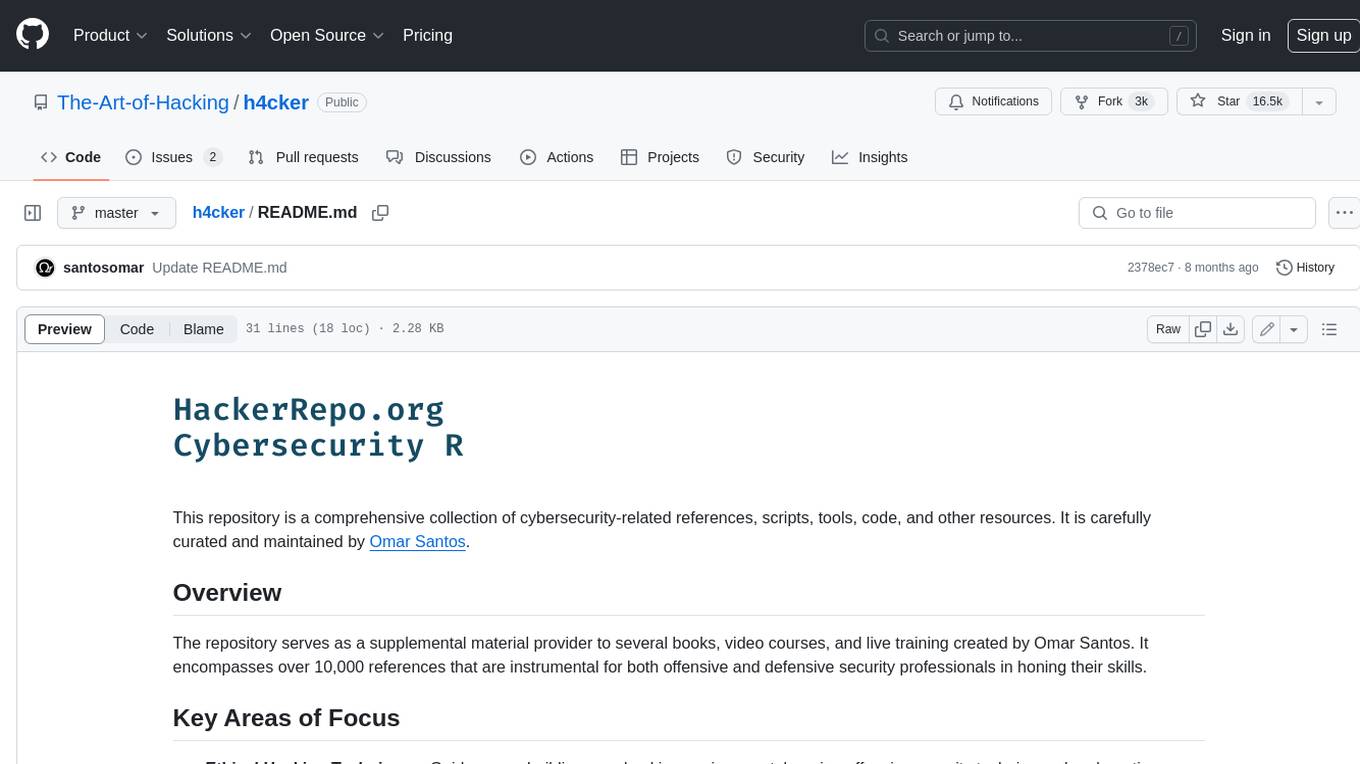
h4cker
This repository is a comprehensive collection of cybersecurity-related references, scripts, tools, code, and other resources. It is carefully curated and maintained by Omar Santos. The repository serves as a supplemental material provider to several books, video courses, and live training created by Omar Santos. It encompasses over 10,000 references that are instrumental for both offensive and defensive security professionals in honing their skills.
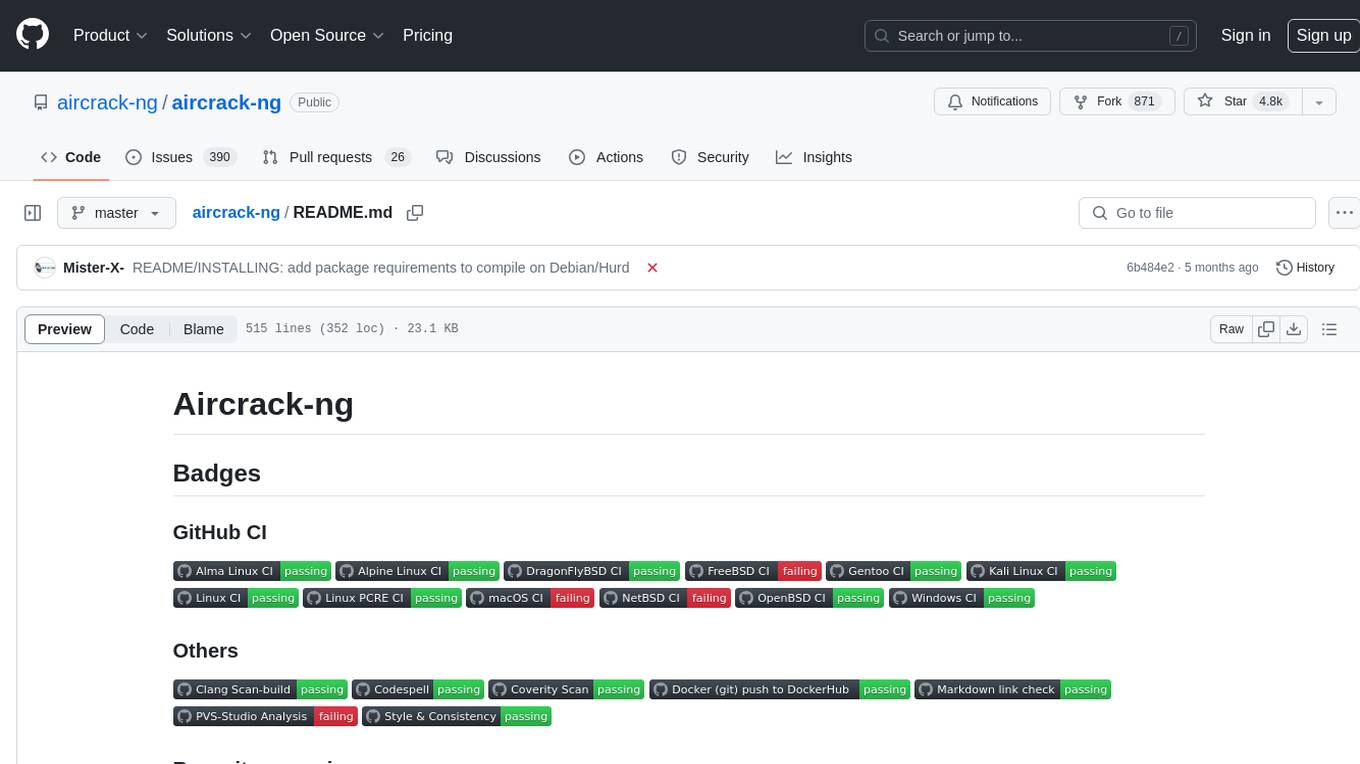
aircrack-ng
Aircrack-ng is a comprehensive suite of tools designed to evaluate the security of WiFi networks. It covers various aspects of WiFi security, including monitoring, attacking (replay attacks, deauthentication, fake access points), testing WiFi cards and driver capabilities, and cracking WEP and WPA PSK. The tools are command line-based, allowing for extensive scripting and have been utilized by many GUIs. Aircrack-ng primarily works on Linux but also supports Windows, macOS, FreeBSD, OpenBSD, NetBSD, Solaris, and eComStation 2.
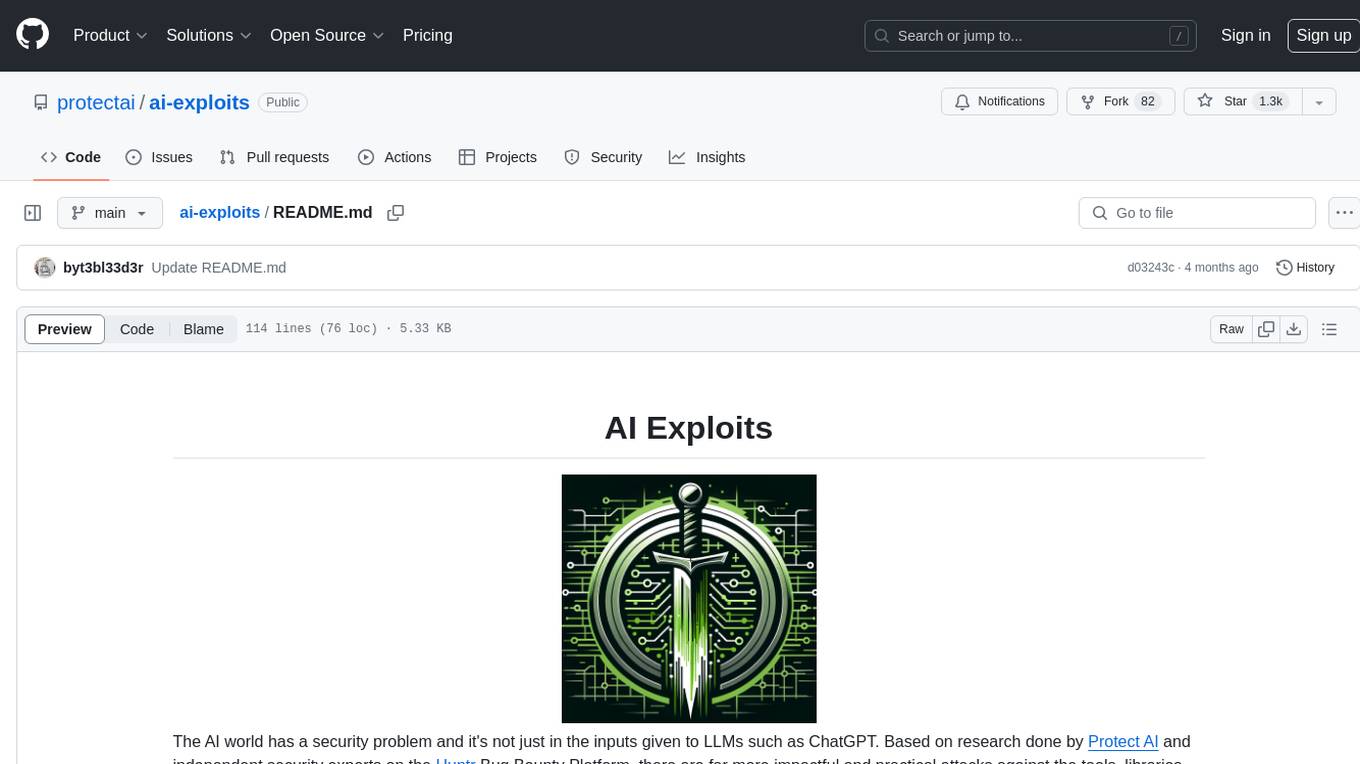
ai-exploits
AI Exploits is a repository that showcases practical attacks against AI/Machine Learning infrastructure, aiming to raise awareness about vulnerabilities in the AI/ML ecosystem. It contains exploits and scanning templates for responsibly disclosed vulnerabilities affecting machine learning tools, including Metasploit modules, Nuclei templates, and CSRF templates. Users can use the provided Docker image to easily run the modules and templates. The repository also provides guidelines for using Metasploit modules, Nuclei templates, and CSRF templates to exploit vulnerabilities in machine learning tools.
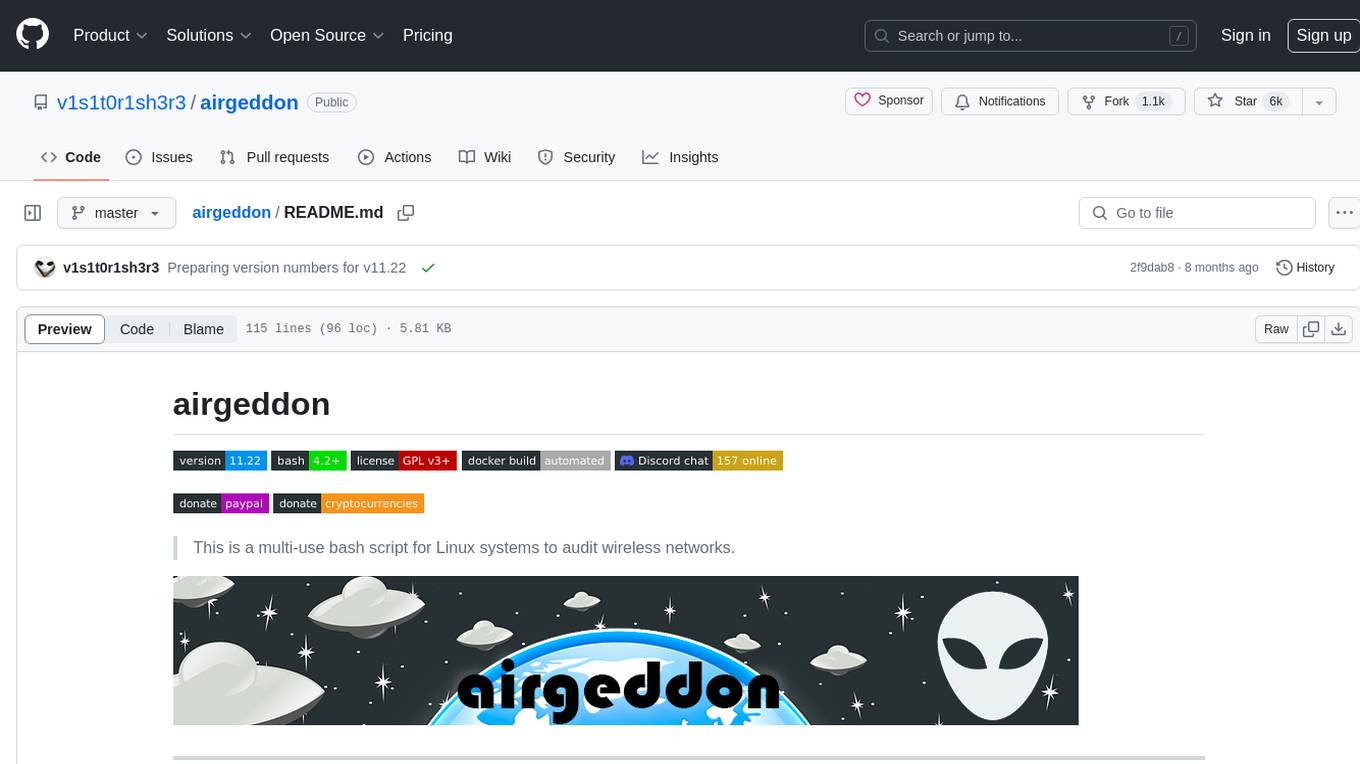
airgeddon
Airgeddon is a versatile bash script designed for Linux systems to conduct wireless network audits. It provides a comprehensive set of features and tools for auditing and securing wireless networks. The script is user-friendly and offers functionalities such as scanning, capturing handshakes, deauth attacks, and more. Airgeddon is regularly updated and supported, making it a valuable tool for both security professionals and enthusiasts.
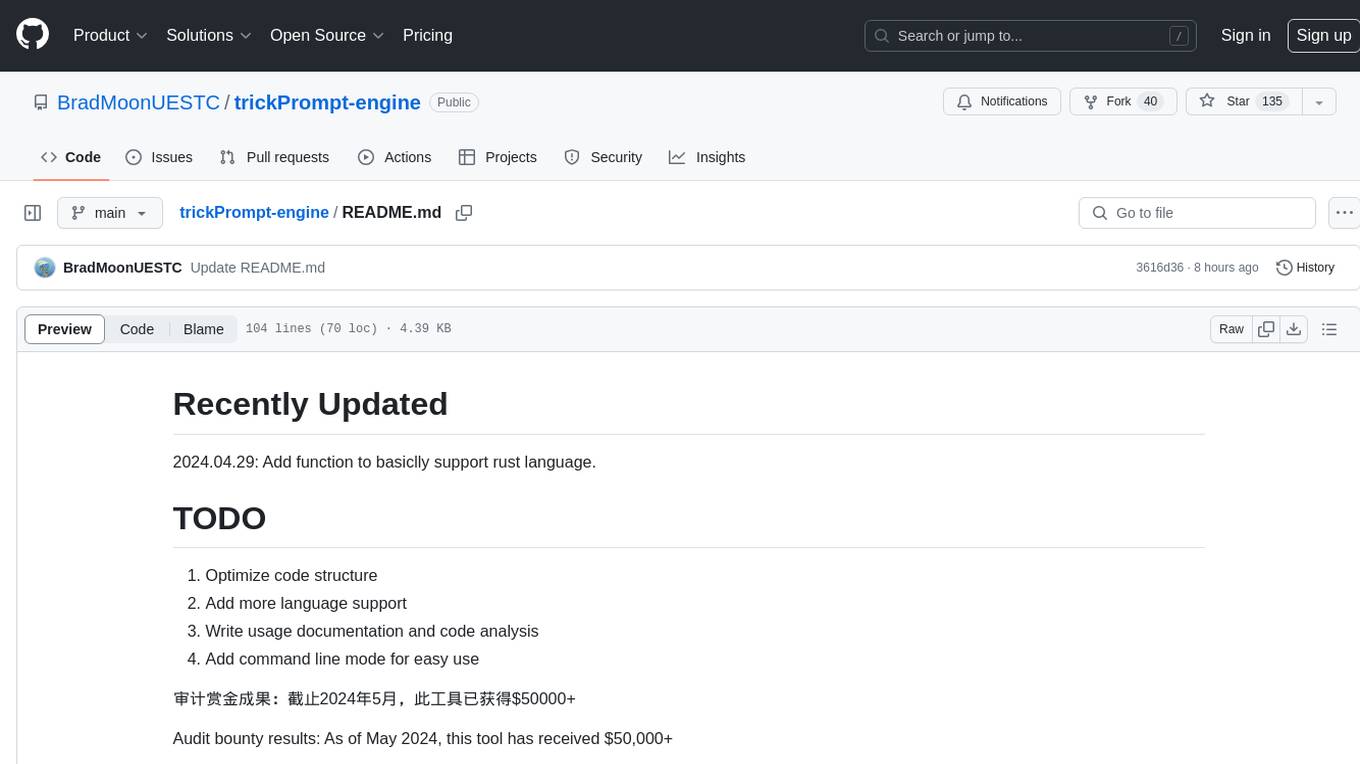
trickPrompt-engine
This repository contains a vulnerability mining engine based on GPT technology. The engine is designed to identify logic vulnerabilities in code by utilizing task-driven prompts. It does not require prior knowledge or fine-tuning and focuses on prompt design rather than model design. The tool is effective in real-world projects and should not be used for academic vulnerability testing. It supports scanning projects in various languages, with current support for Solidity. The engine is configured through prompts and environment settings, enabling users to scan for vulnerabilities in their codebase. Future updates aim to optimize code structure, add more language support, and enhance usability through command line mode. The tool has received a significant audit bounty of $50,000+ as of May 2024.
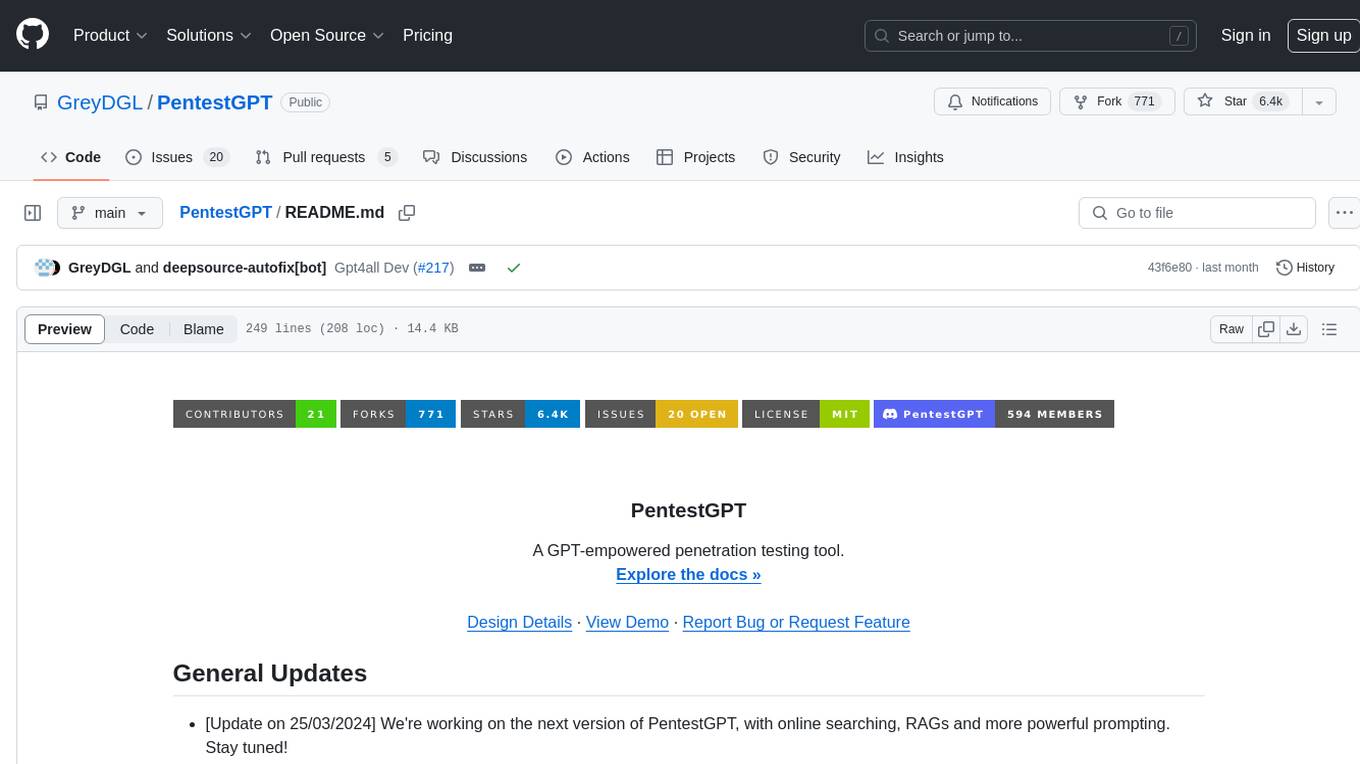
PentestGPT
PentestGPT is a penetration testing tool empowered by ChatGPT, designed to automate the penetration testing process. It operates interactively to guide penetration testers in overall progress and specific operations. The tool supports solving easy to medium HackTheBox machines and other CTF challenges. Users can use PentestGPT to perform tasks like testing connections, using different reasoning models, discussing with the tool, searching on Google, and generating reports. It also supports local LLMs with custom parsers for advanced users.
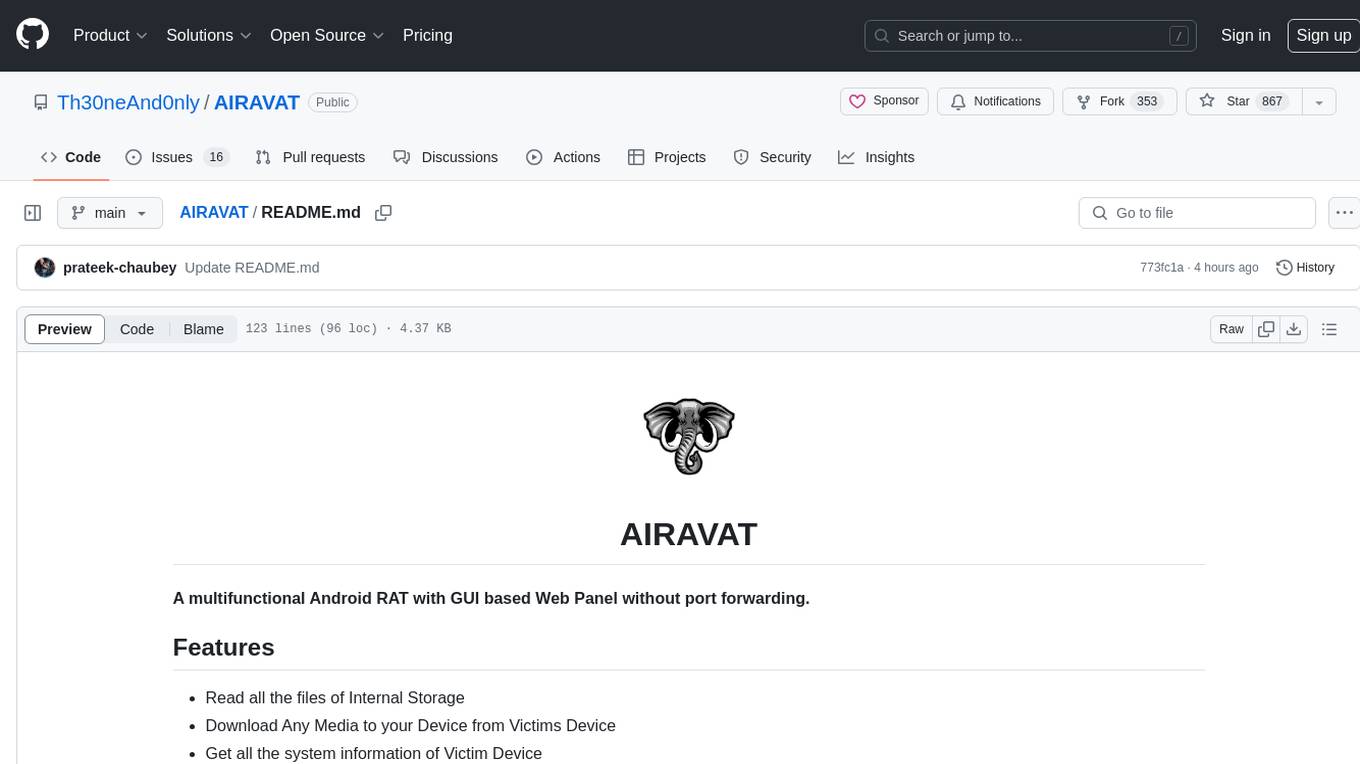
AIRAVAT
AIRAVAT is a multifunctional Android Remote Access Tool (RAT) with a GUI-based Web Panel that does not require port forwarding. It allows users to access various features on the victim's device, such as reading files, downloading media, retrieving system information, managing applications, SMS, call logs, contacts, notifications, keylogging, admin permissions, phishing, audio recording, music playback, device control (vibration, torch light, wallpaper), executing shell commands, clipboard text retrieval, URL launching, and background operation. The tool requires a Firebase account and tools like ApkEasy Tool or ApkTool M for building. Users can set up Firebase, host the web panel, modify Instagram.apk for RAT functionality, and connect the victim's device to the web panel. The tool is intended for educational purposes only, and users are solely responsible for its use.
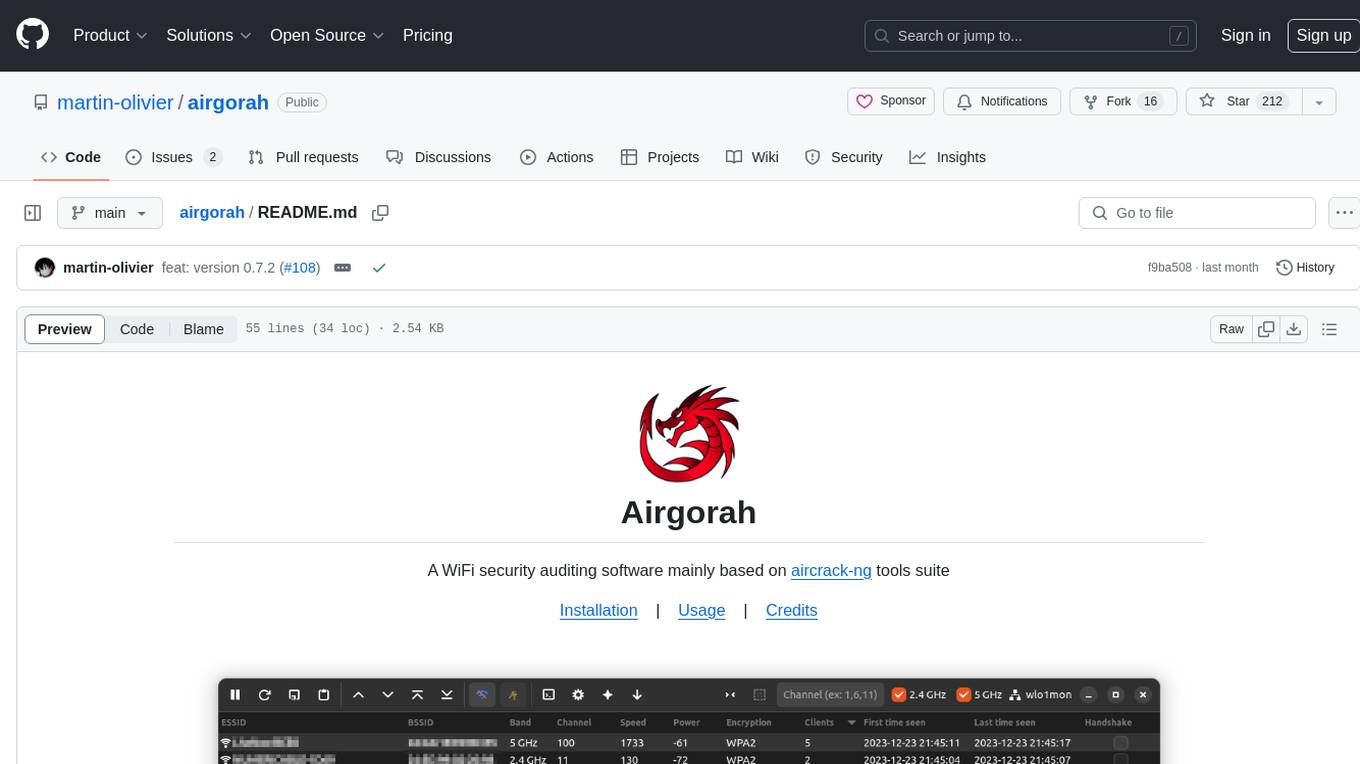
airgorah
Airgorah is a WiFi security auditing software written in Rust that utilizes the aircrack-ng tools suite. It allows users to capture WiFi traffic, discover connected clients, perform deauthentication attacks, capture handshakes, and crack access point passwords. The software is designed for testing and discovering flaws in networks owned by the user, and requires root privileges to run on Linux systems with a wireless network card supporting monitor mode and packet injection. Airgorah is not responsible for any illegal activities conducted with the software.
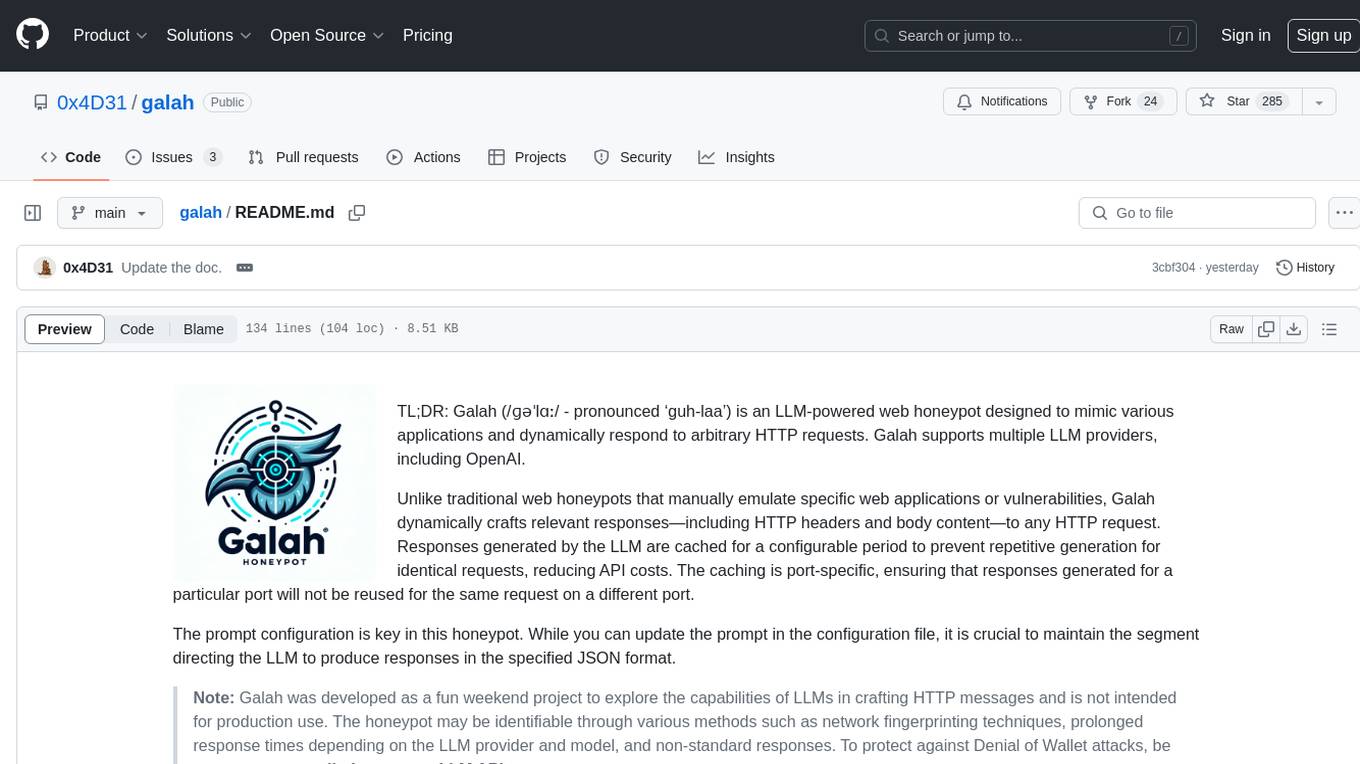
galah
Galah is an LLM-powered web honeypot designed to mimic various applications and dynamically respond to arbitrary HTTP requests. It supports multiple LLM providers, including OpenAI. Unlike traditional web honeypots, Galah dynamically crafts responses for any HTTP request, caching them to reduce repetitive generation and API costs. The honeypot's configuration is crucial, directing the LLM to produce responses in a specified JSON format. Note that Galah is a weekend project exploring LLM capabilities and not intended for production use, as it may be identifiable through network fingerprinting and non-standard responses.
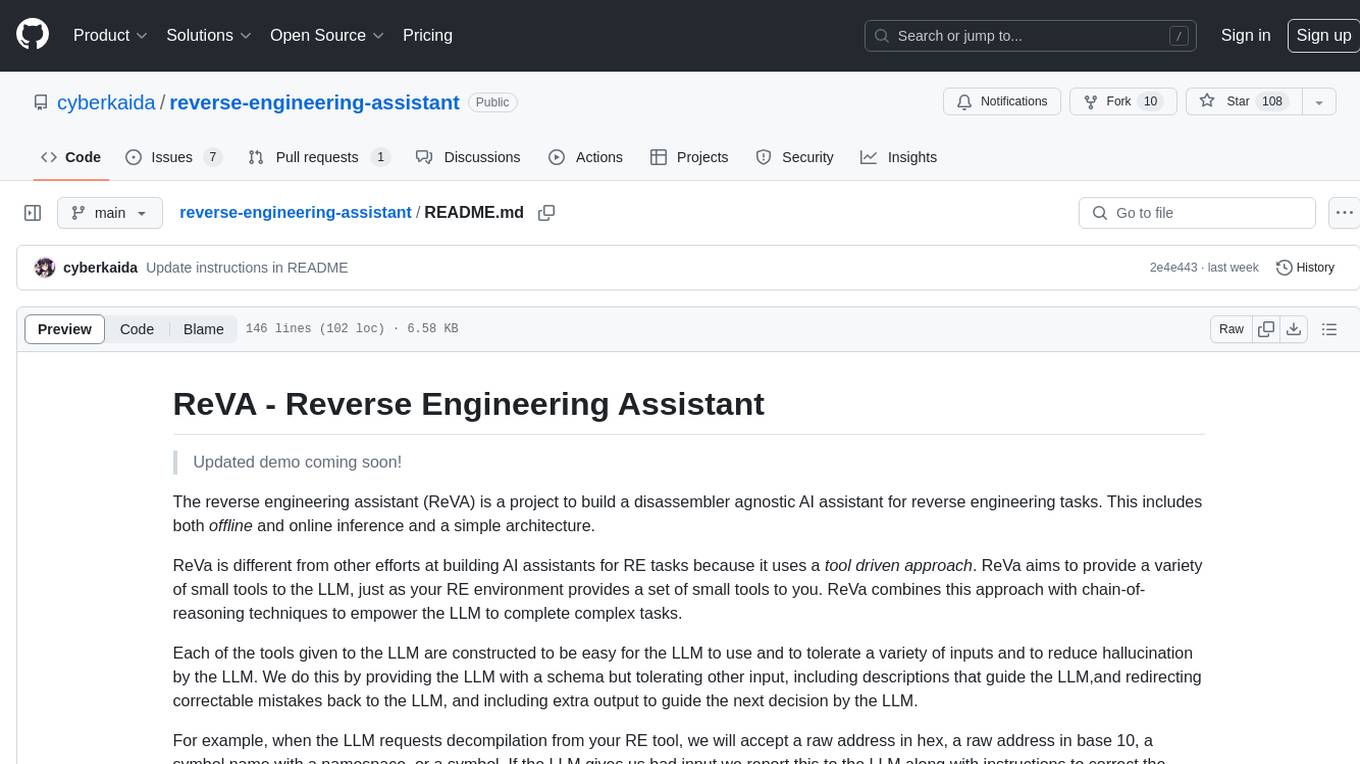
reverse-engineering-assistant
ReVA (Reverse Engineering Assistant) is a project aimed at building a disassembler agnostic AI assistant for reverse engineering tasks. It utilizes a tool-driven approach, providing small tools to the user to empower them in completing complex tasks. The assistant is designed to accept various inputs, guide the user in correcting mistakes, and provide additional context to encourage exploration. Users can ask questions, perform tasks like decompilation, class diagram generation, variable renaming, and more. ReVA supports different language models for online and local inference, with easy configuration options. The workflow involves opening the RE tool and program, then starting a chat session to interact with the assistant. Installation includes setting up the Python component, running the chat tool, and configuring the Ghidra extension for seamless integration. ReVA aims to enhance the reverse engineering process by breaking down actions into small parts, including the user's thoughts in the output, and providing support for monitoring and adjusting prompts.

stride-gpt
STRIDE GPT is an AI-powered threat modelling tool that leverages Large Language Models (LLMs) to generate threat models and attack trees for a given application based on the STRIDE methodology. Users provide application details, such as the application type, authentication methods, and whether the application is internet-facing or processes sensitive data. The model then generates its output based on the provided information. It features a simple and user-friendly interface, supports multi-modal threat modelling, generates attack trees, suggests possible mitigations for identified threats, and does not store application details. STRIDE GPT can be accessed via OpenAI API, Azure OpenAI Service, Google AI API, or Mistral API. It is available as a Docker container image for easy deployment.
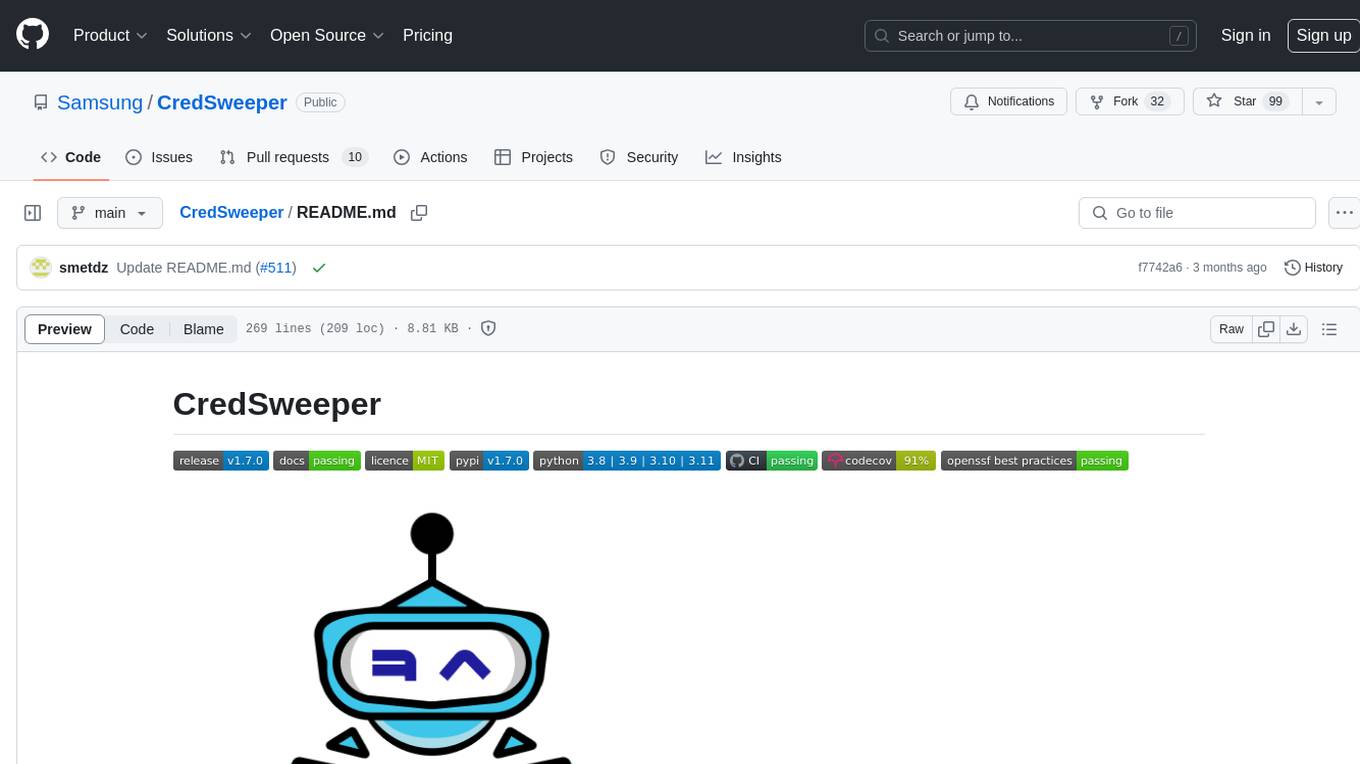
CredSweeper
CredSweeper is a tool designed to detect credentials like tokens, passwords, and API keys in directories or files. It helps users identify potential exposure of sensitive information by scanning lines, filtering, and utilizing an AI model. The tool reports lines containing possible credentials, their location, and the expected type of credential.
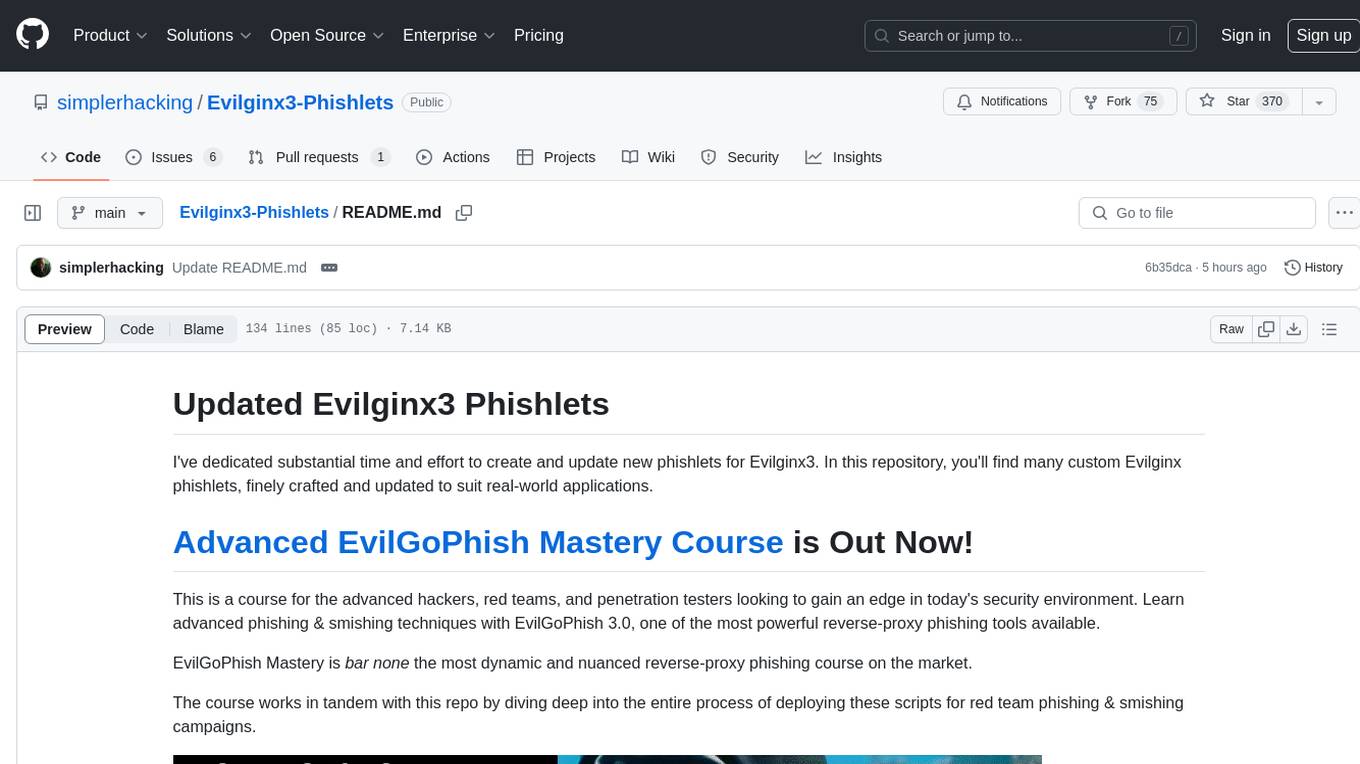
Evilginx3-Phishlets
This repository contains custom Evilginx phishlets that are meticulously crafted and updated for real-world applications. It also offers an advanced course, EvilGoPhish Mastery, focusing on phishing and smishing techniques using EvilGoPhish 3.0. The course complements the repository by providing in-depth guidance on deploying these scripts for red team phishing and smishing campaigns.
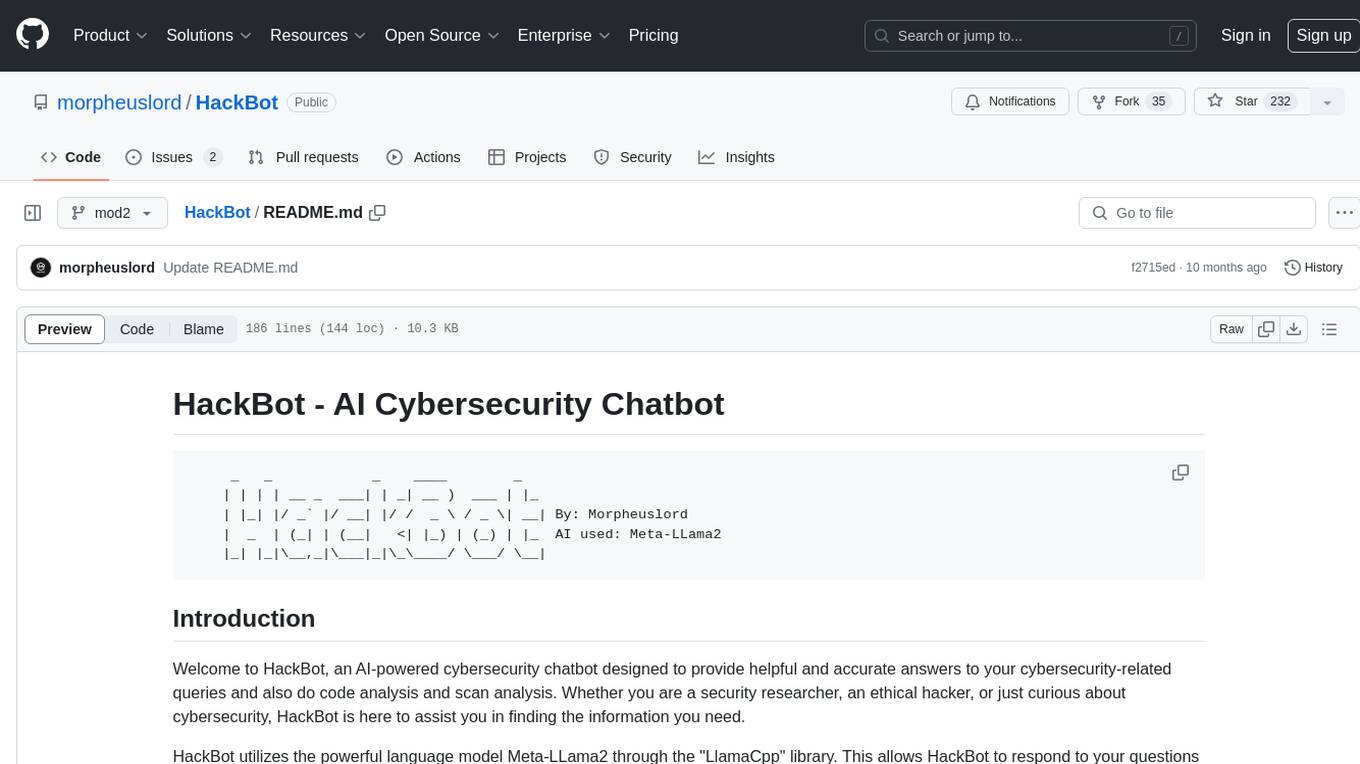
HackBot
HackBot is an AI-powered cybersecurity chatbot designed to provide accurate answers to cybersecurity-related queries, conduct code analysis, and scan analysis. It utilizes the Meta-LLama2 AI model through the 'LlamaCpp' library to respond coherently. The chatbot offers features like local AI/Runpod deployment support, cybersecurity chat assistance, interactive interface, clear output presentation, static code analysis, and vulnerability analysis. Users can interact with HackBot through a command-line interface and utilize it for various cybersecurity tasks.
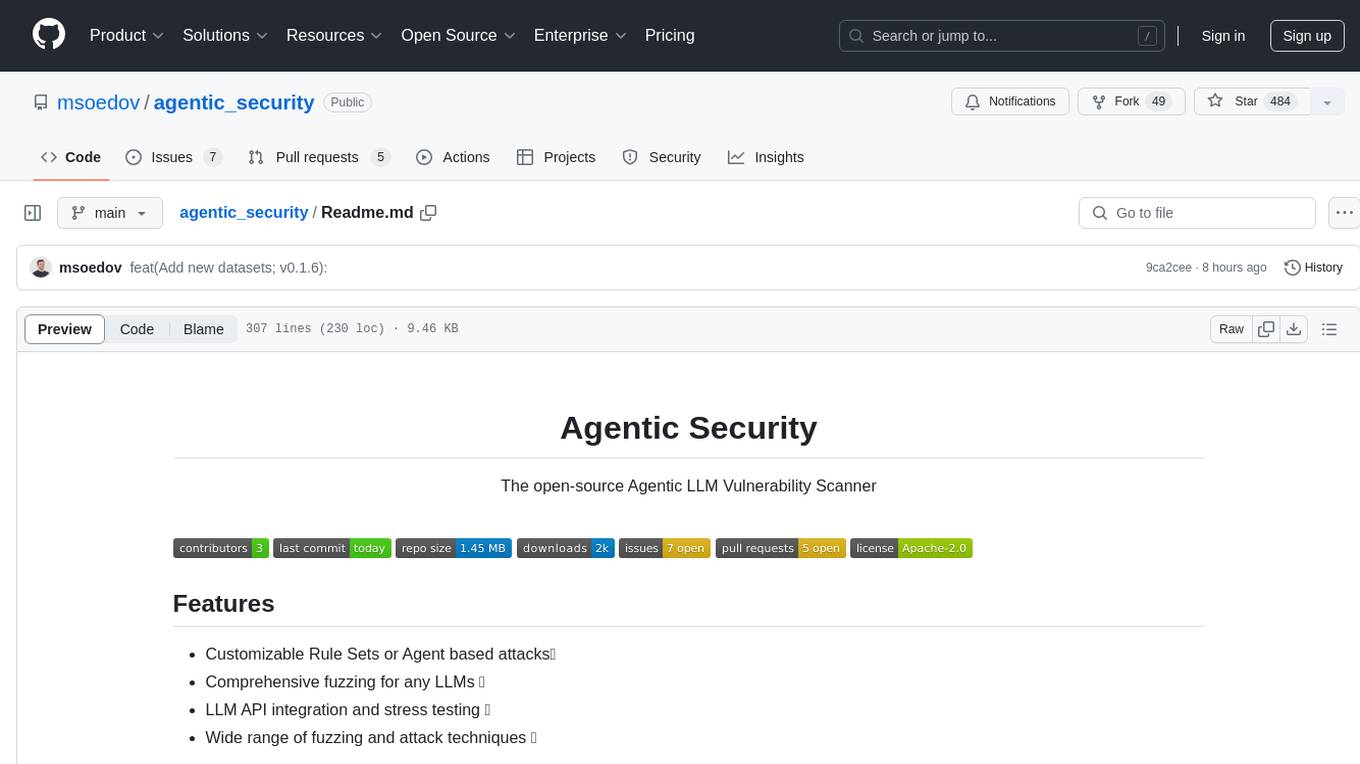
agentic_security
Agentic Security is an open-source vulnerability scanner designed for safety scanning, offering customizable rule sets and agent-based attacks. It provides comprehensive fuzzing for any LLMs, LLM API integration, and stress testing with a wide range of fuzzing and attack techniques. The tool is not a foolproof solution but aims to enhance security measures against potential threats. It offers installation via pip and supports quick start commands for easy setup. Users can utilize the tool for LLM integration, adding custom datasets, running CI checks, extending dataset collections, and dynamic datasets with mutations. The tool also includes a probe endpoint for integration testing. The roadmap includes expanding dataset variety, introducing new attack vectors, developing an attacker LLM, and integrating OWASP Top 10 classification.
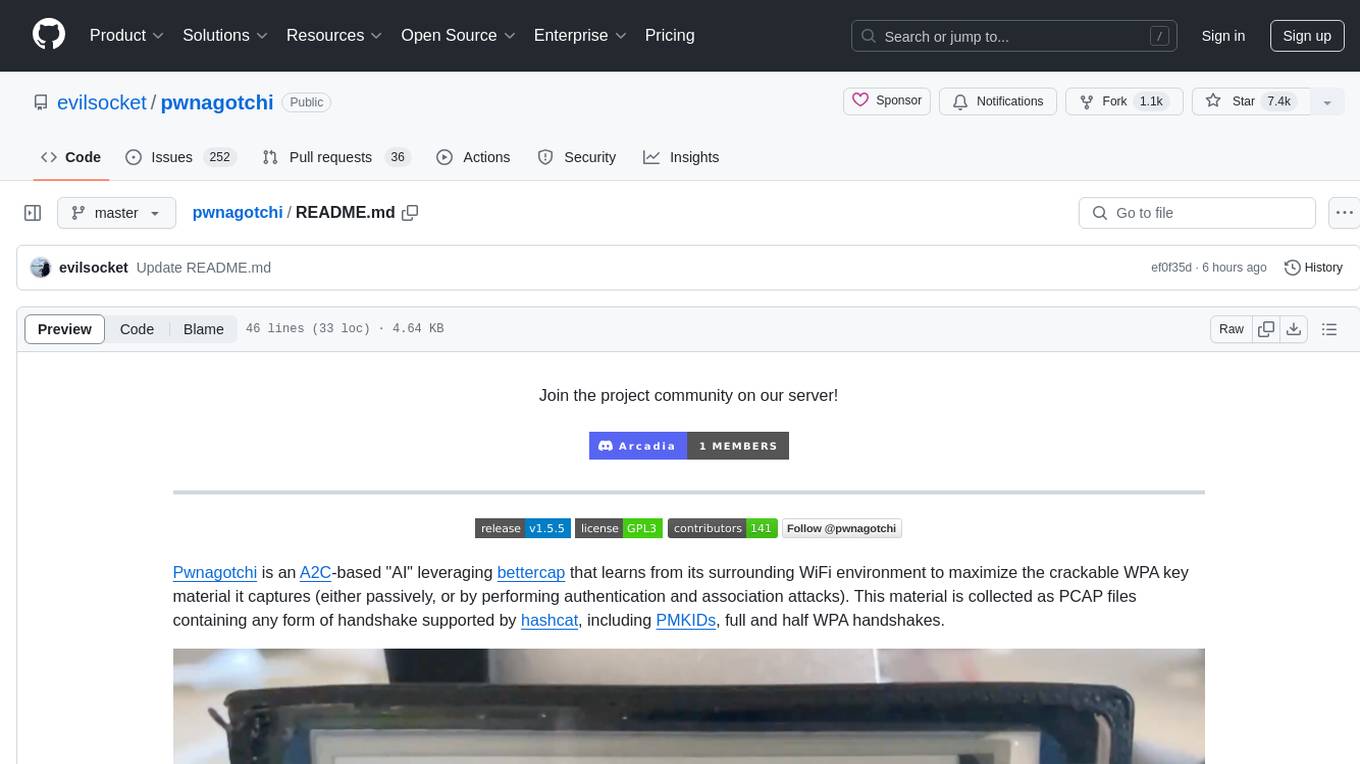
pwnagotchi
Pwnagotchi is an AI tool leveraging bettercap to learn from WiFi environments and maximize crackable WPA key material. It uses LSTM with MLP feature extractor for A2C agent, learning over epochs to improve performance in various WiFi environments. Units can cooperate using a custom parasite protocol. Visit https://www.pwnagotchi.ai for documentation and community links.
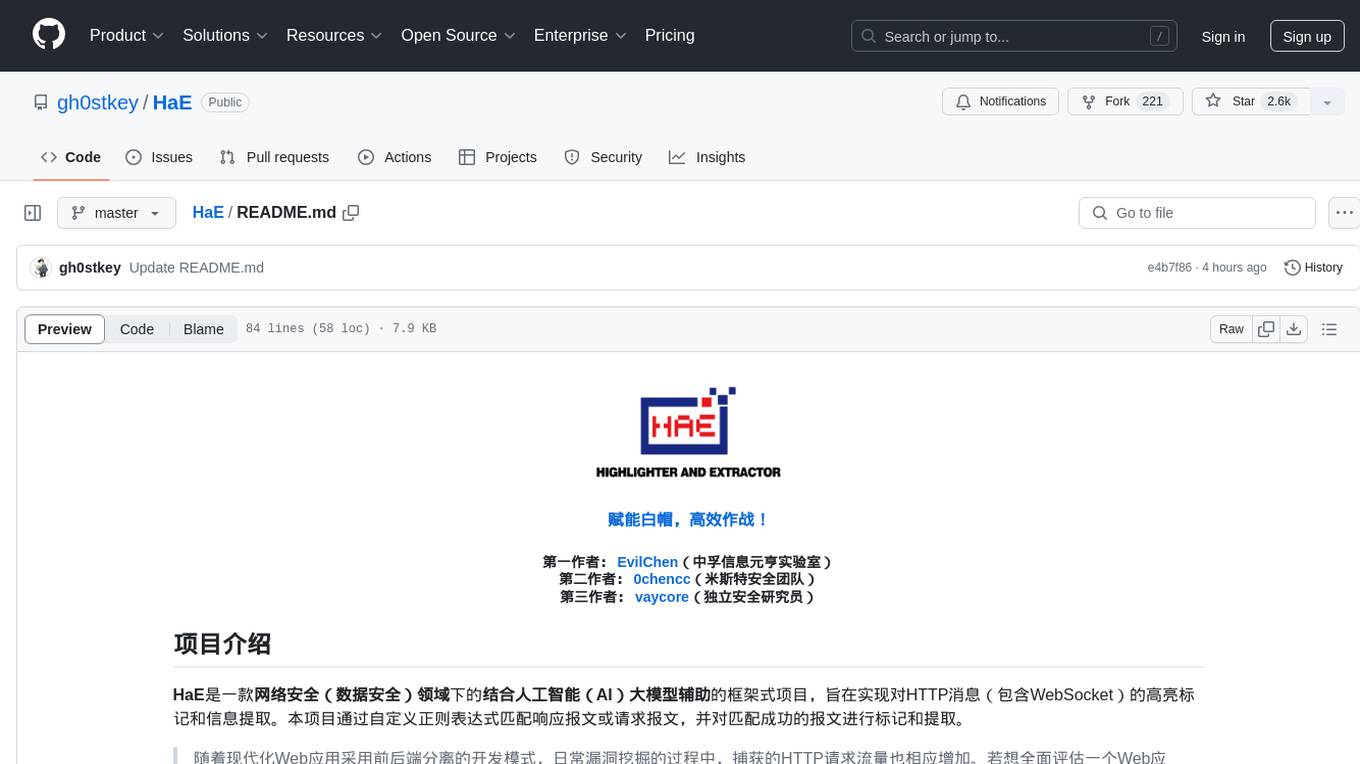
HaE
HaE is a framework project in the field of network security (data security) that combines artificial intelligence (AI) large models to achieve highlighting and information extraction of HTTP messages (including WebSocket). It aims to reduce testing time, focus on valuable and meaningful messages, and improve vulnerability discovery efficiency. The project provides a clear and visual interface design, simple interface interaction, and centralized data panel for querying and extracting information. It also features built-in color upgrade algorithm, one-click export/import of data, and integration of AI large models API for optimized data processing.
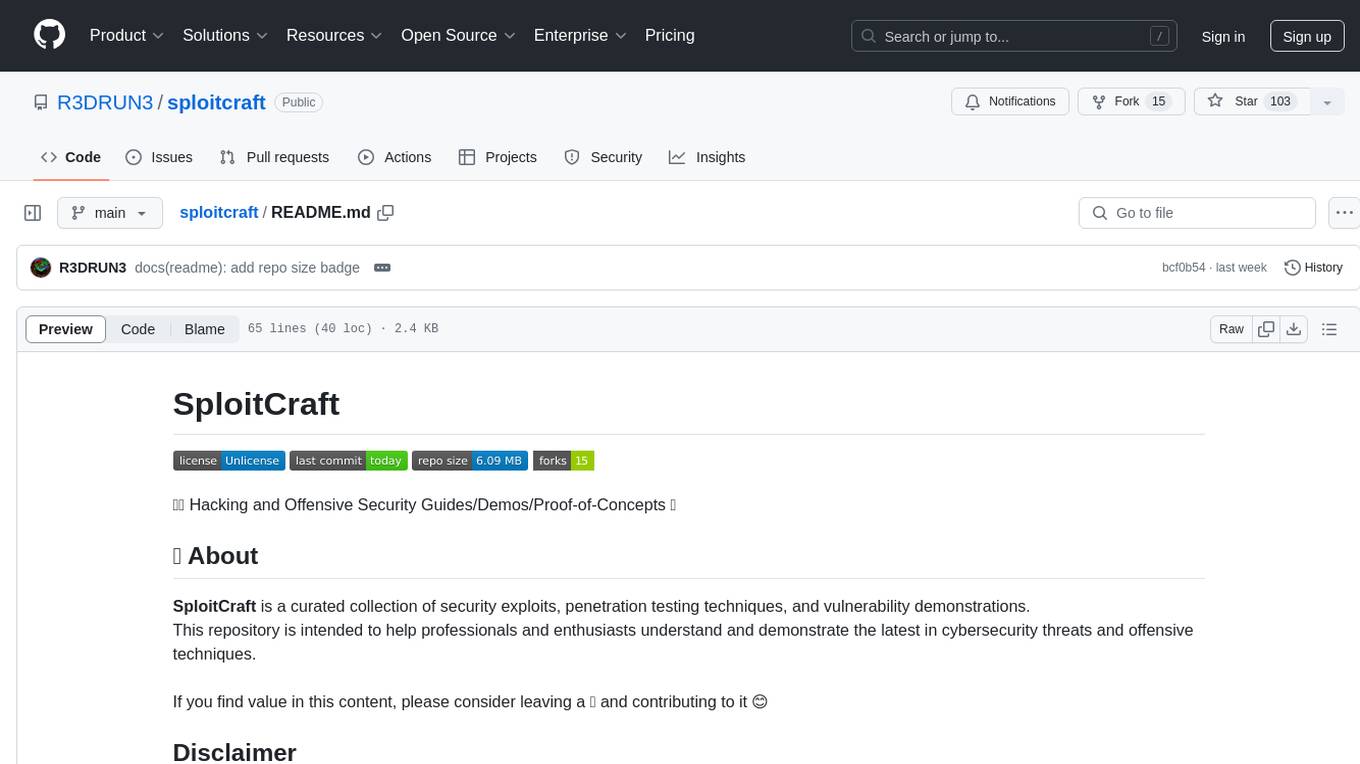
sploitcraft
SploitCraft is a curated collection of security exploits, penetration testing techniques, and vulnerability demonstrations intended to help professionals and enthusiasts understand and demonstrate the latest in cybersecurity threats and offensive techniques. The repository is organized into folders based on specific topics, each containing directories and detailed READMEs with step-by-step instructions. Contributions from the community are welcome, with a focus on adding new proof of concepts or expanding existing ones while adhering to the current structure and format of the repository.
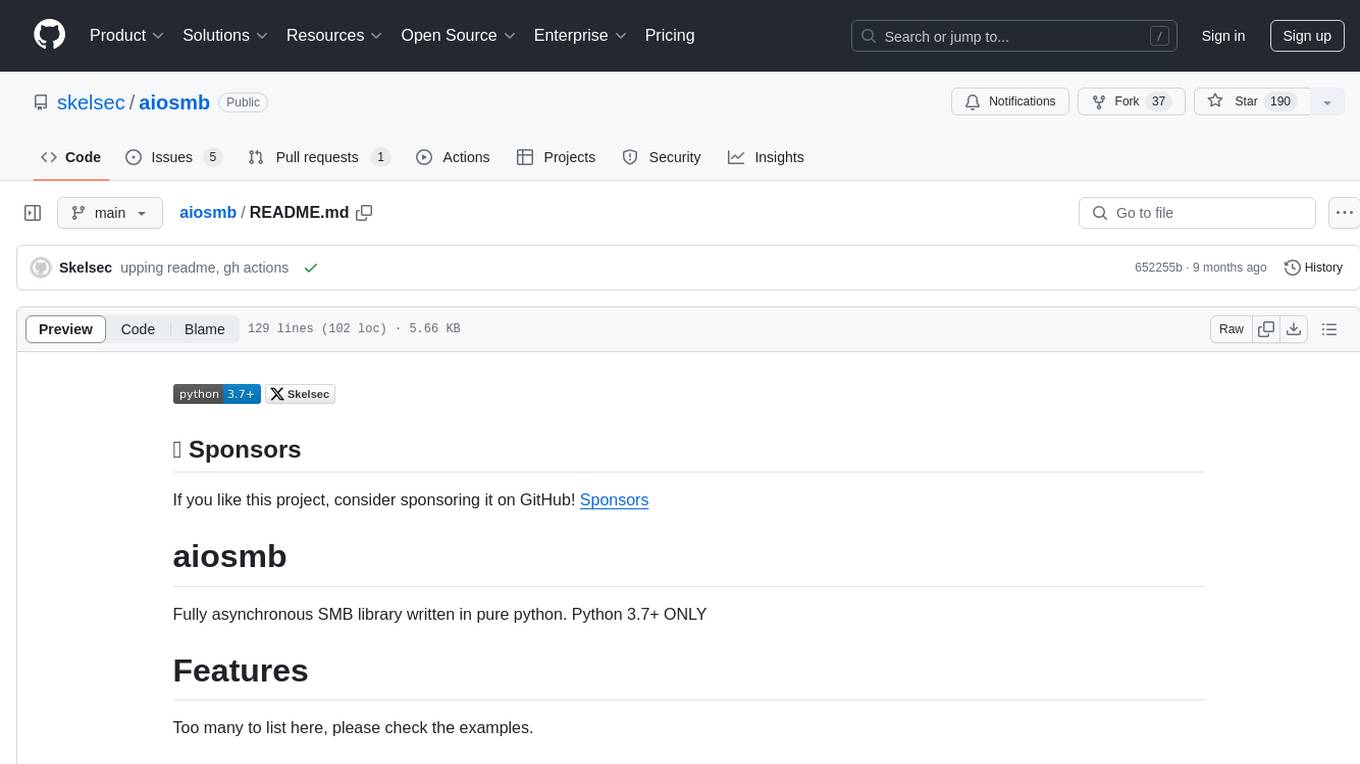
aiosmb
aiosmb is a fully asynchronous SMB library written in pure Python, supporting Python 3.7 and above. It offers various authentication methods such as Kerberos, NTLM, SSPI, and NEGOEX. The library supports connections over TCP and QUIC protocols, with proxy support for SOCKS4 and SOCKS5. Users can specify an SMB connection using a URL format, making it easier to authenticate and connect to SMB hosts. The project aims to implement DCERPC features, VSS mountpoint operations, and other enhancements in the future. It is inspired by Impacket and AzureADJoinedMachinePTC projects.
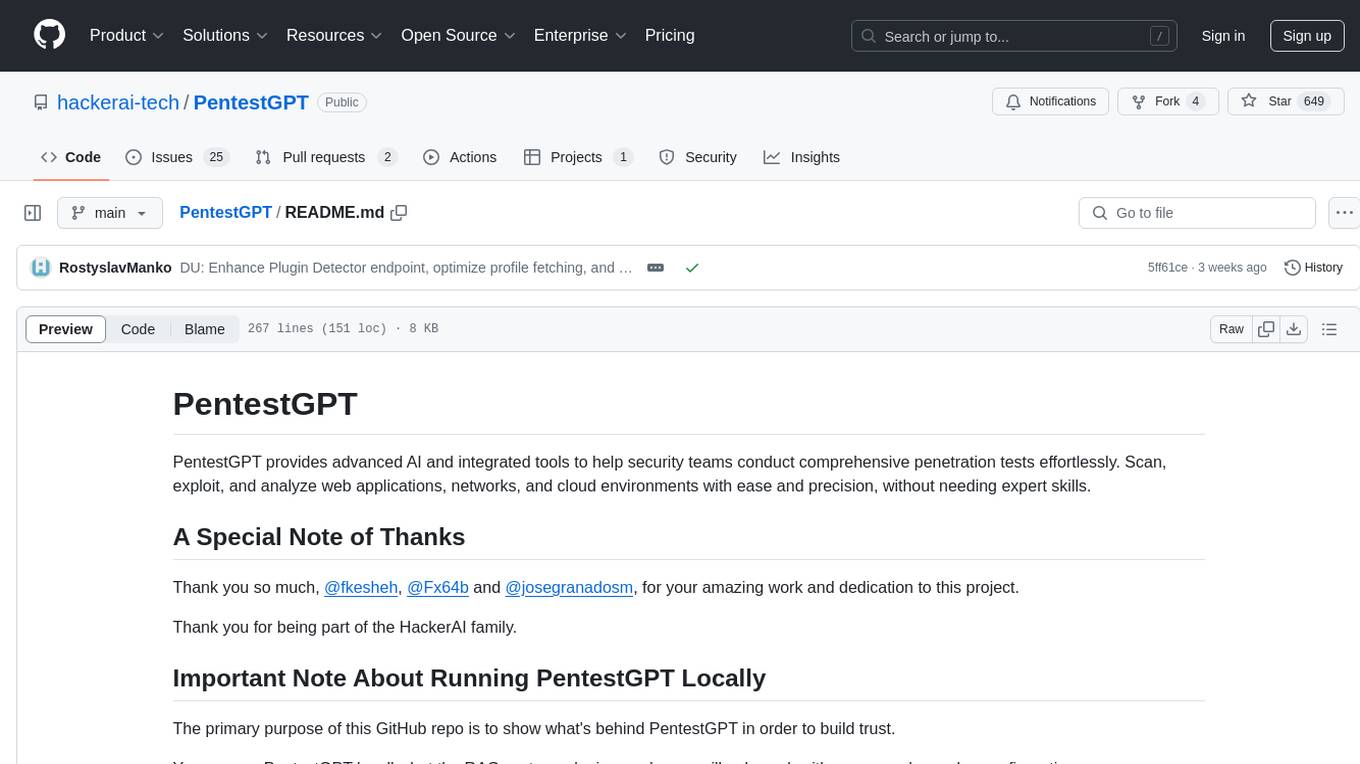
PentestGPT
PentestGPT provides advanced AI and integrated tools to help security teams conduct comprehensive penetration tests effortlessly. Scan, exploit, and analyze web applications, networks, and cloud environments with ease and precision, without needing expert skills. The tool utilizes Supabase for data storage and management, and Vercel for hosting the frontend. It offers a local quickstart guide for running the tool locally and a hosted quickstart guide for deploying it in the cloud. PentestGPT aims to simplify the penetration testing process for security professionals and enthusiasts alike.
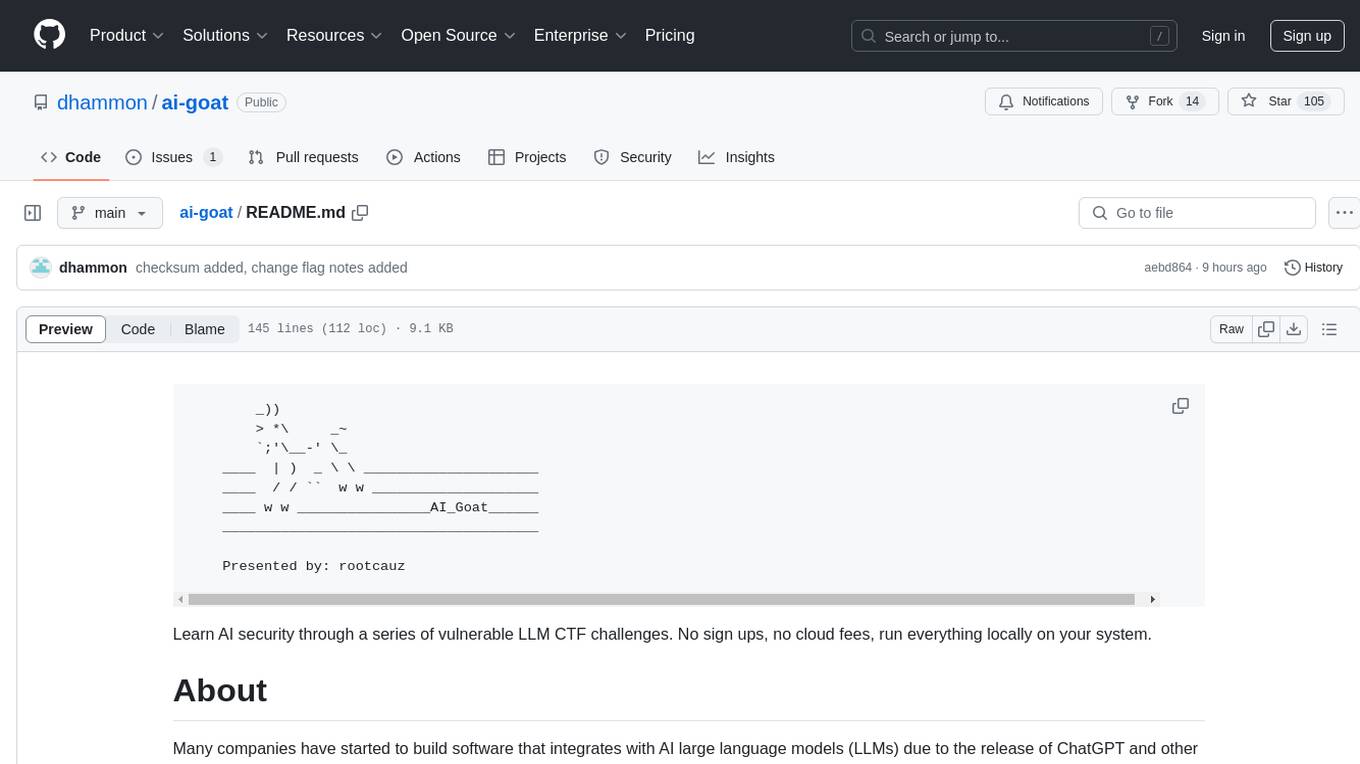
ai-goat
AI Goat is a tool designed to help users learn about AI security through a series of vulnerable LLM CTF challenges. It allows users to run everything locally on their system without the need for sign-ups or cloud fees. The tool focuses on exploring security risks associated with large language models (LLMs) like ChatGPT, providing practical experience for security researchers to understand vulnerabilities and exploitation techniques. AI Goat uses the Vicuna LLM, derived from Meta's LLaMA and ChatGPT's response data, to create challenges that involve prompt injections, insecure output handling, and other LLM security threats. The tool also includes a prebuilt Docker image, ai-base, containing all necessary libraries to run the LLM and challenges, along with an optional CTFd container for challenge management and flag submission.
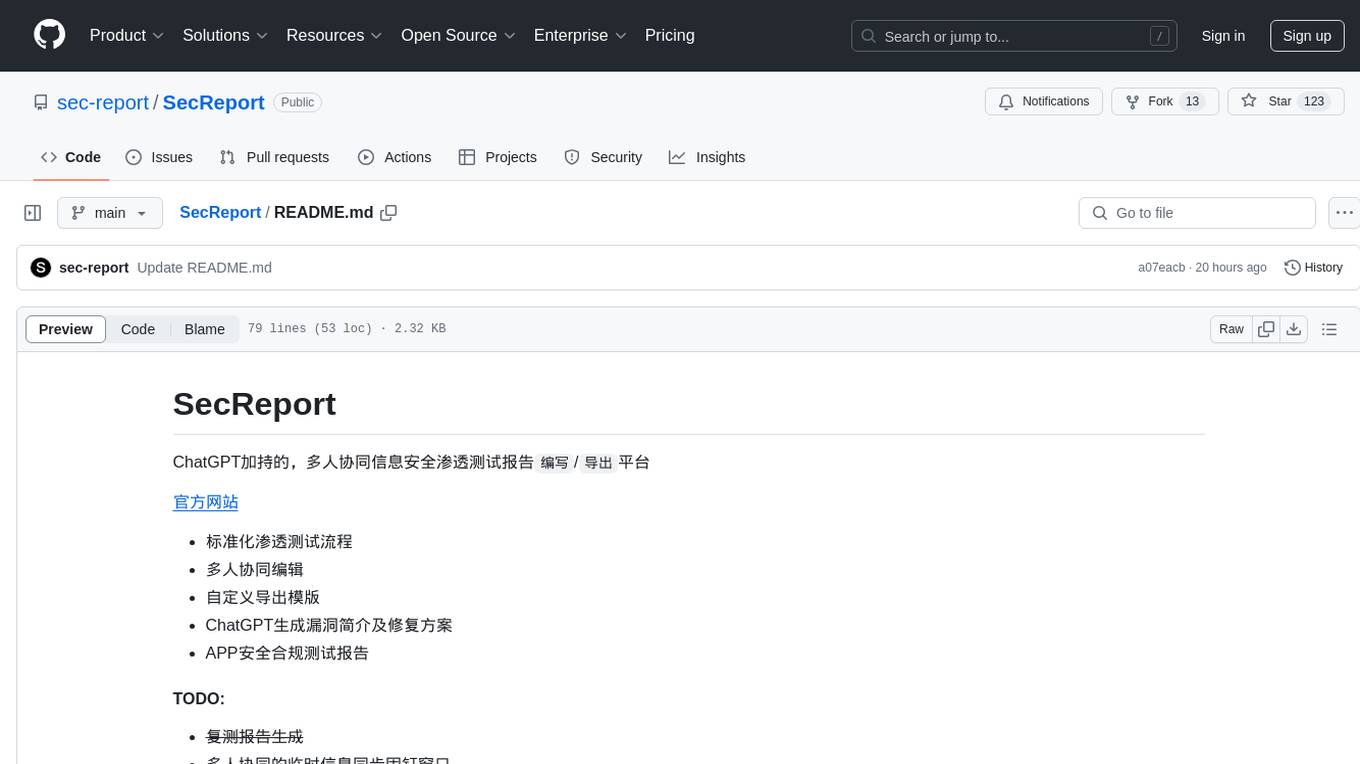
SecReport
SecReport is a platform for collaborative information security penetration testing report writing and exporting, powered by ChatGPT. It standardizes penetration testing processes, allows multiple users to edit reports, offers custom export templates, generates vulnerability summaries and fix suggestions using ChatGPT, and provides APP security compliance testing reports. The tool aims to streamline the process of creating and managing security reports for penetration testing and compliance purposes.
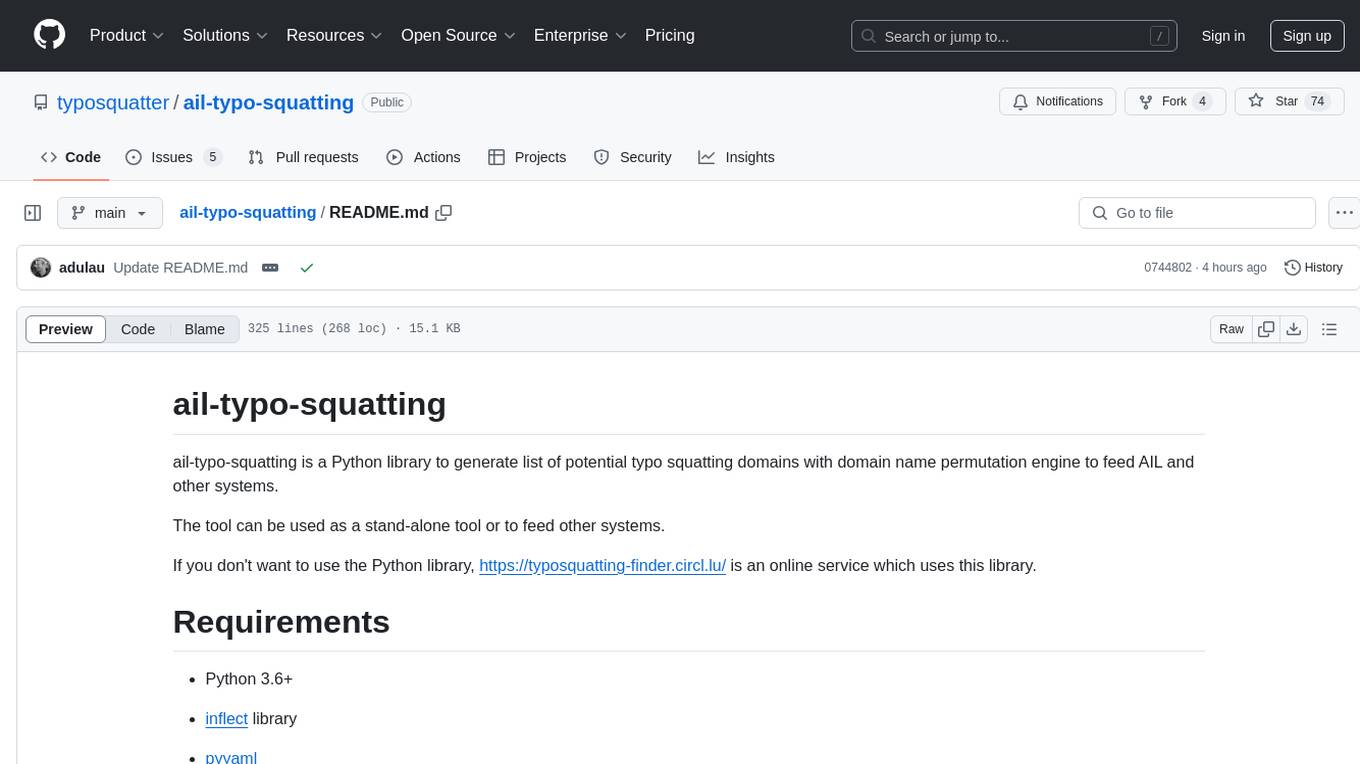
ail-typo-squatting
ail-typo-squatting is a Python library designed to generate a list of potential typo squatting domains using a domain name permutation engine. It can be used as a standalone tool or to feed other systems. The tool provides various algorithms to create typos by adding, changing, or omitting characters in domain names. It also offers DNS resolving capabilities to check the availability of generated variations. The project has been co-funded by CEF-TC-2020-2 - 2020-EU-IA-0260 - JTAN - Joint Threat Analysis Network.
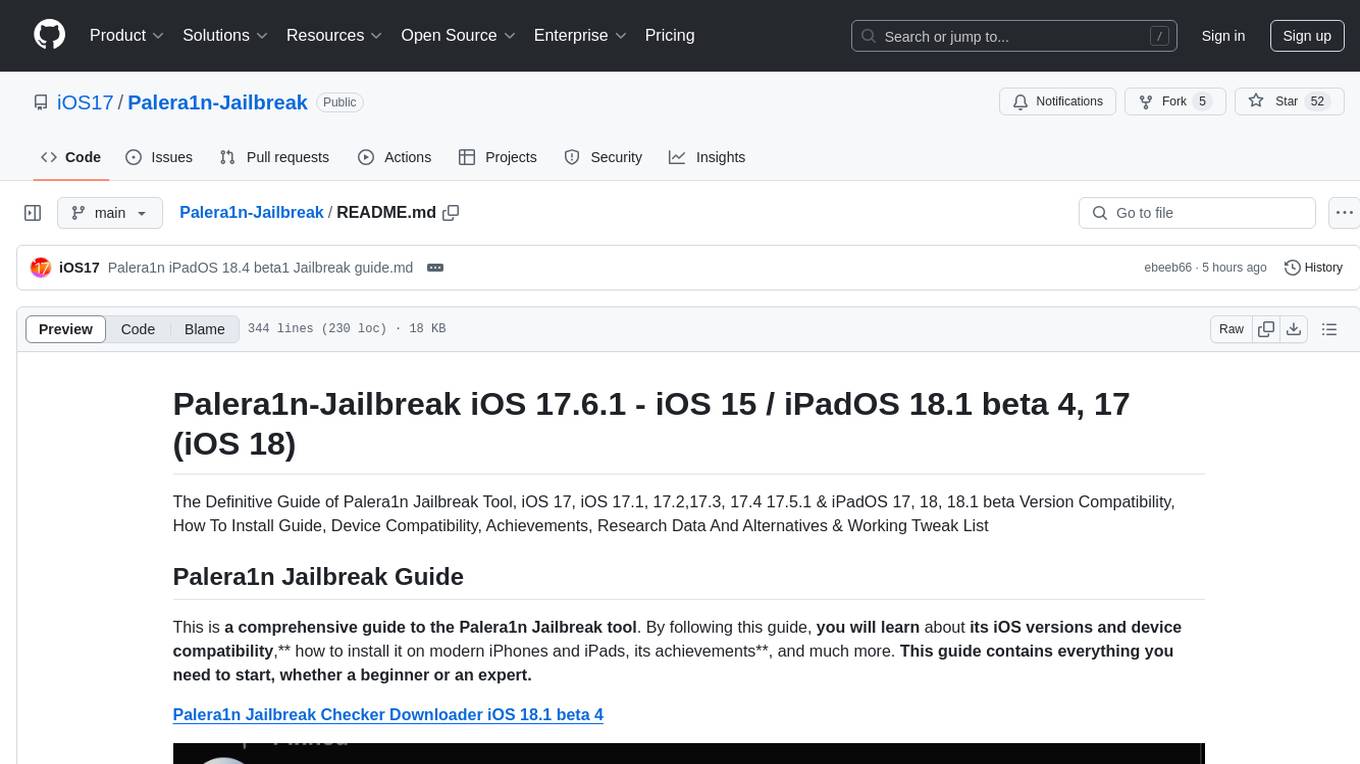
Palera1n-Jailbreak
Palera1n-Jailbreak is a comprehensive guide and tool for jailbreaking iOS 17.6.1 to iOS 15 and iPadOS 18.1 beta 4, 17. It provides information on compatibility, installation, achievements, research data, and working tweak list. The tool is based on the checkm8 exploit, allowing customization of iOS devices with third-party apps and tweaks. Palera1n offers features like root access, tweak injection, and custom themes, making it a valuable tool for iOS customization enthusiasts.
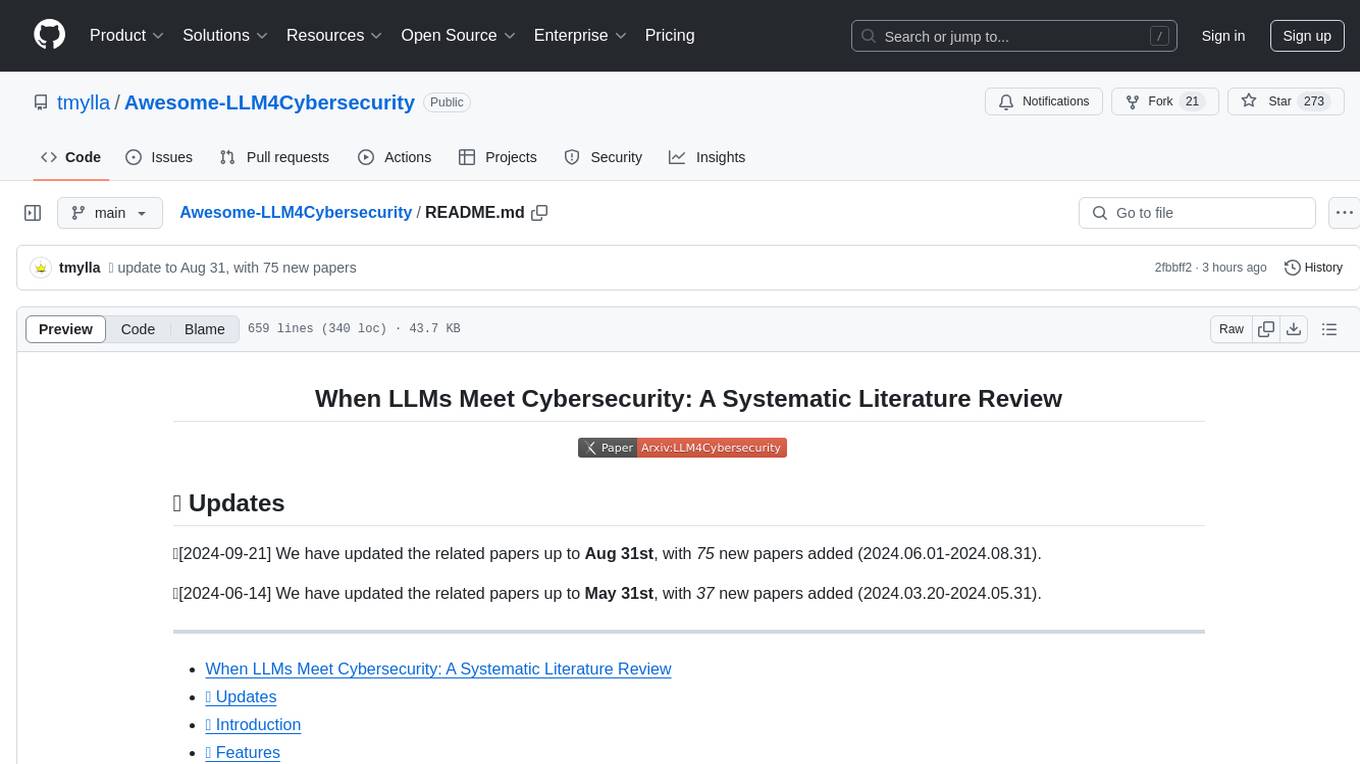
Awesome-LLM4Cybersecurity
The repository 'Awesome-LLM4Cybersecurity' provides a comprehensive overview of the applications of Large Language Models (LLMs) in cybersecurity. It includes a systematic literature review covering topics such as constructing cybersecurity-oriented domain LLMs, potential applications of LLMs in cybersecurity, and research directions in the field. The repository analyzes various benchmarks, datasets, and applications of LLMs in cybersecurity tasks like threat intelligence, fuzzing, vulnerabilities detection, insecure code generation, program repair, anomaly detection, and LLM-assisted attacks.
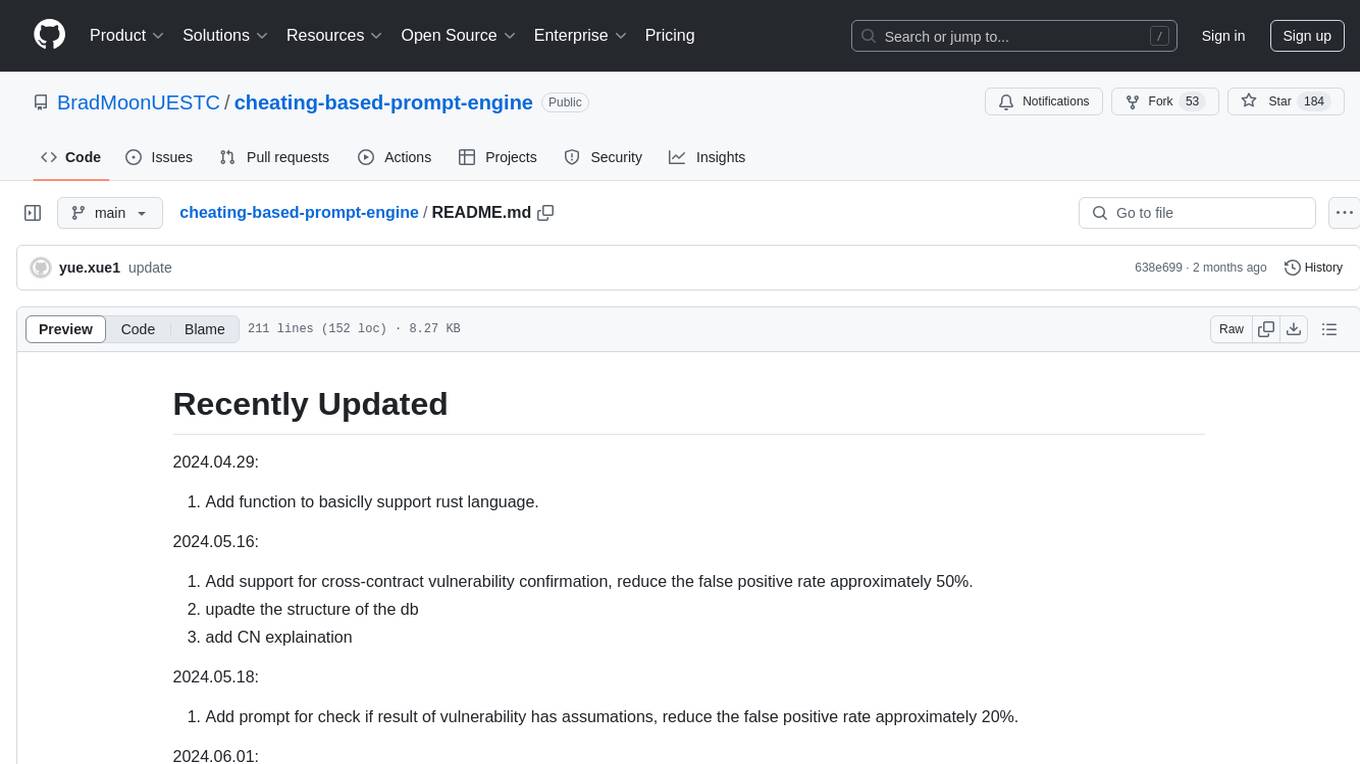
cheating-based-prompt-engine
This is a vulnerability mining engine purely based on GPT, requiring no prior knowledge base, no fine-tuning, yet its effectiveness can overwhelmingly surpass most of the current related research. The core idea revolves around being task-driven, not question-driven, driven by prompts, not by code, and focused on prompt design, not model design. The essence is encapsulated in one word: deception. It is a type of code understanding logic vulnerability mining that fully stimulates the capabilities of GPT, suitable for real actual projects.
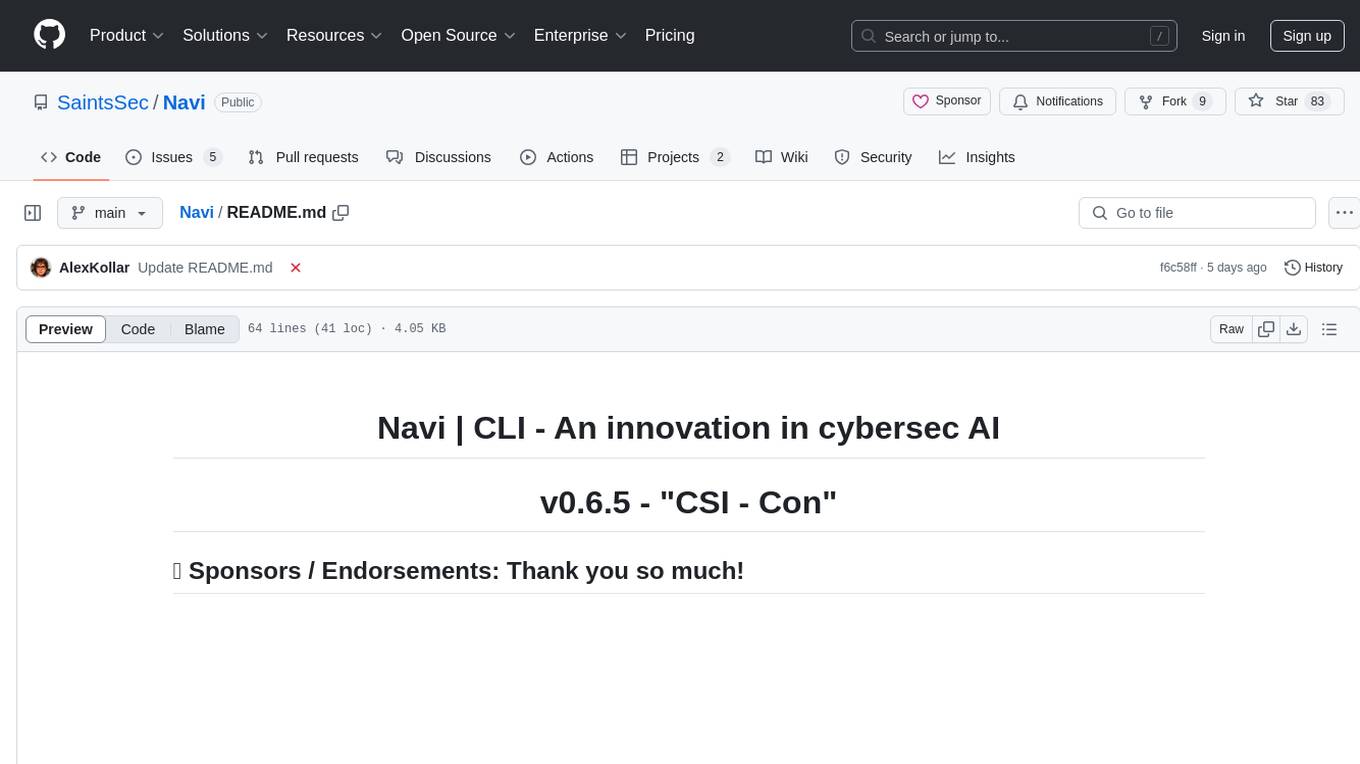
Navi
Navi is a CLI tool that revolutionizes cybersecurity with AI capabilities. It features an upgraded shell for executing system commands seamlessly, custom scripts with alias variables, and a dedicated Nmap chip. The tool is in constant development with plans for a Navi AI model, transparent data handling, and integration with Llama3.2 AI. Navi is open-source, fostering collaborative innovation in AI and cybersecurity domains.
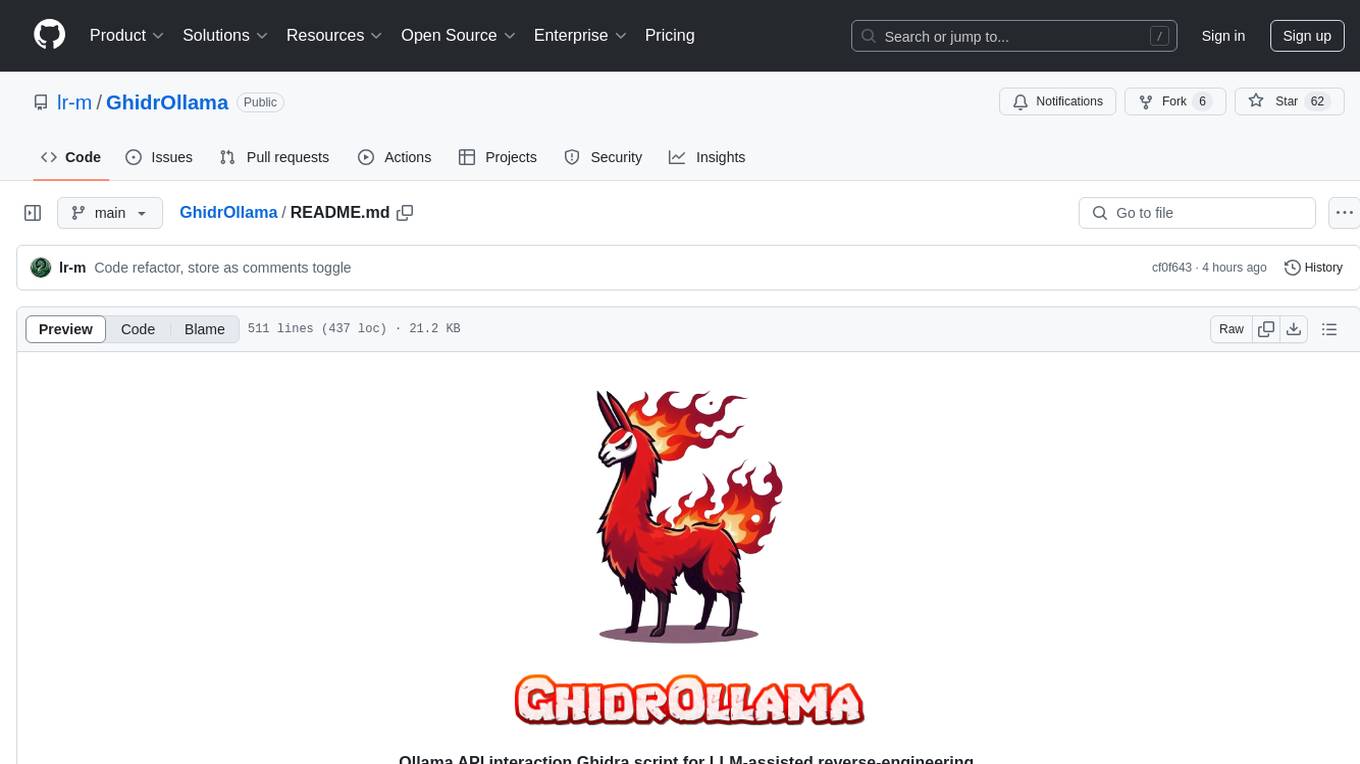
GhidrOllama
GhidrOllama is a script that interacts with Ollama's API to perform various reverse engineering tasks within Ghidra. It supports both local and remote instances of Ollama, providing functionalities like explaining functions, suggesting names, rewriting functions, finding bugs, and automating analysis of specific functions in binaries. Users can ask questions about functions, find vulnerabilities, and receive explanations of assembly instructions. The script bridges the gap between Ghidra and Ollama models, enhancing reverse engineering capabilities.
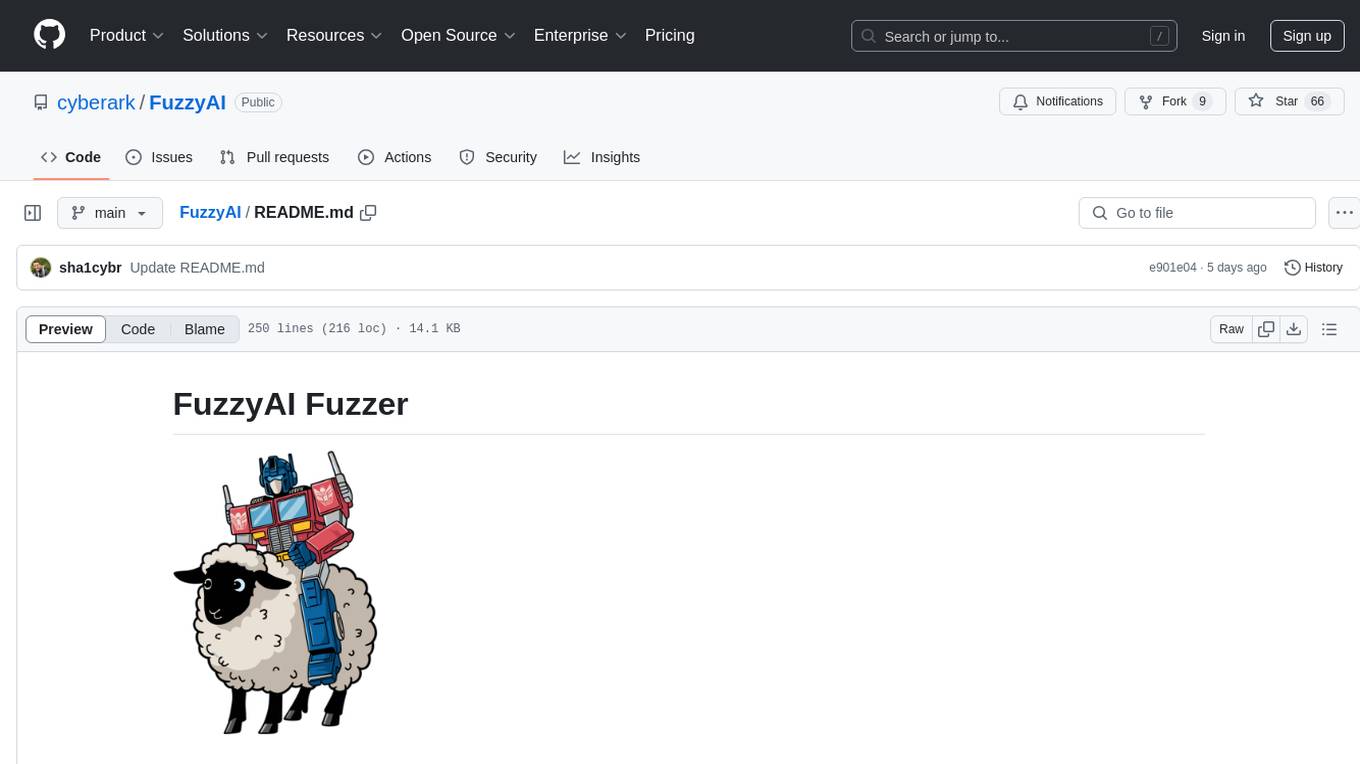
FuzzyAI
The FuzzyAI Fuzzer is a powerful tool for automated LLM fuzzing, designed to help developers and security researchers identify jailbreaks and mitigate potential security vulnerabilities in their LLM APIs. It supports various fuzzing techniques, provides input generation capabilities, can be easily integrated into existing workflows, and offers an extensible architecture for customization and extension. The tool includes attacks like ArtPrompt, Taxonomy-based paraphrasing, Many-shot jailbreaking, Genetic algorithm, Hallucinations, DAN (Do Anything Now), WordGame, Crescendo, ActorAttack, Back To The Past, Please, Thought Experiment, and Default. It supports models from providers like Anthropic, OpenAI, Gemini, Azure, Bedrock, AI21, and Ollama, with the ability to add support for newer models. The tool also supports various cloud APIs and datasets for testing and experimentation.
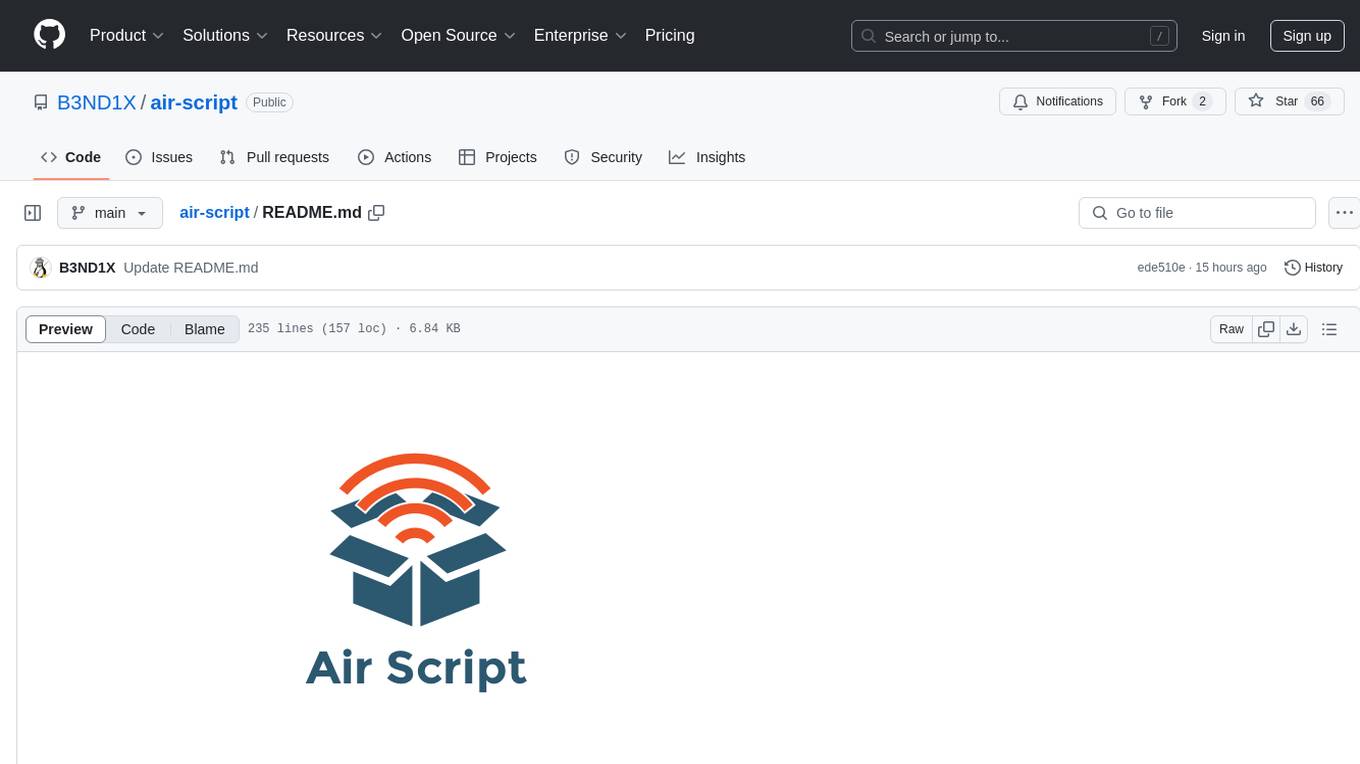
air-script
Air Script is a versatile tool designed for Wi-Fi penetration testing, offering automated and user-friendly features to streamline the hacking process. It allows users to easily capture handshakes from nearby networks, automate attacks, and even send email notifications upon completion. The tool is ideal for individuals looking to efficiently pwn Wi-Fi networks without extensive manual input. With additional tools and options available, Air Script caters to a wide range of users, including script kiddies, hackers, pentesters, and security researchers. Whether on the go or using a Raspberry Pi, Air Script provides a convenient solution for network penetration testing and password cracking.
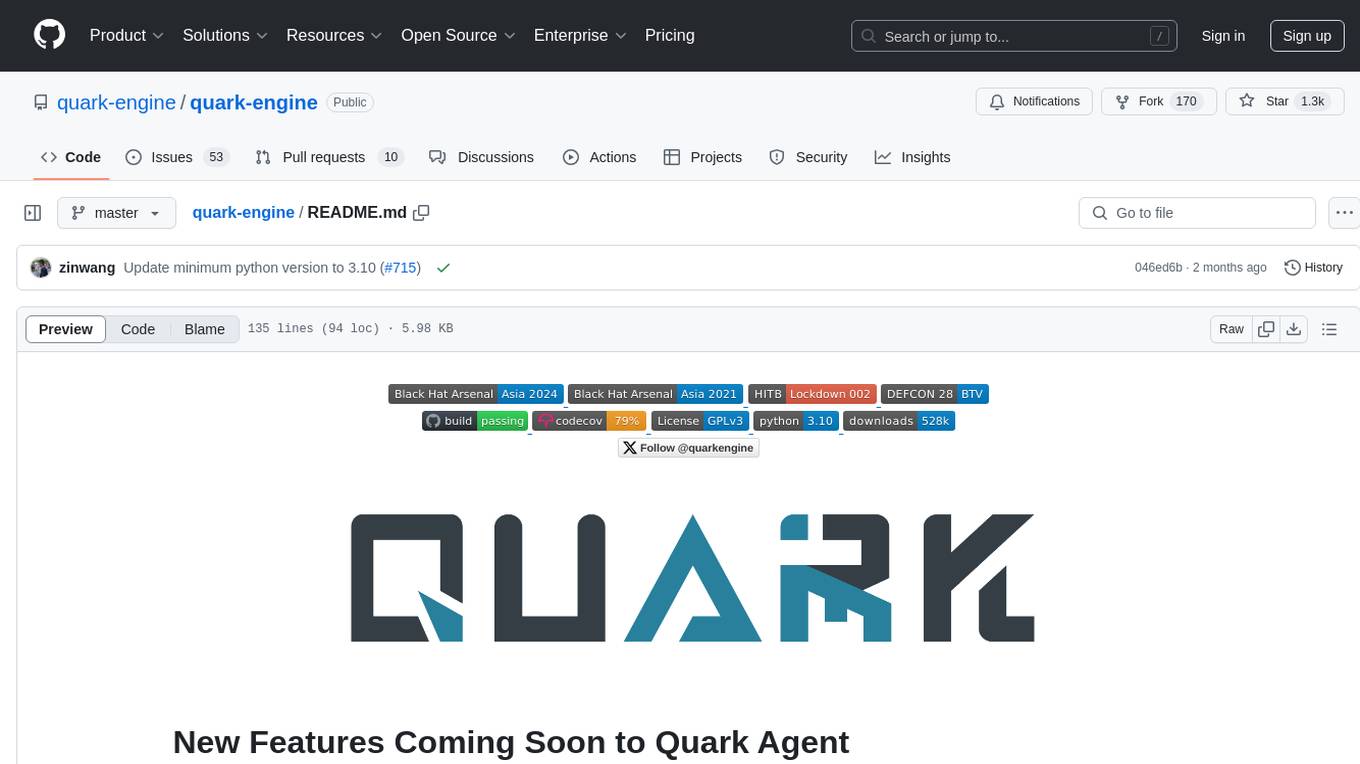
quark-engine
Quark Engine is an AI-powered tool designed for analyzing Android APK files. It focuses on enhancing the detection process for auto-suggestion, enabling users to create detection workflows without coding. The tool offers an intuitive drag-and-drop interface for workflow adjustments and updates. Quark Agent, the core component, generates Quark Script code based on natural language input and feedback. The project is committed to providing a user-friendly experience for designing detection workflows through textual and visual methods. Various features are still under development and will be rolled out gradually.
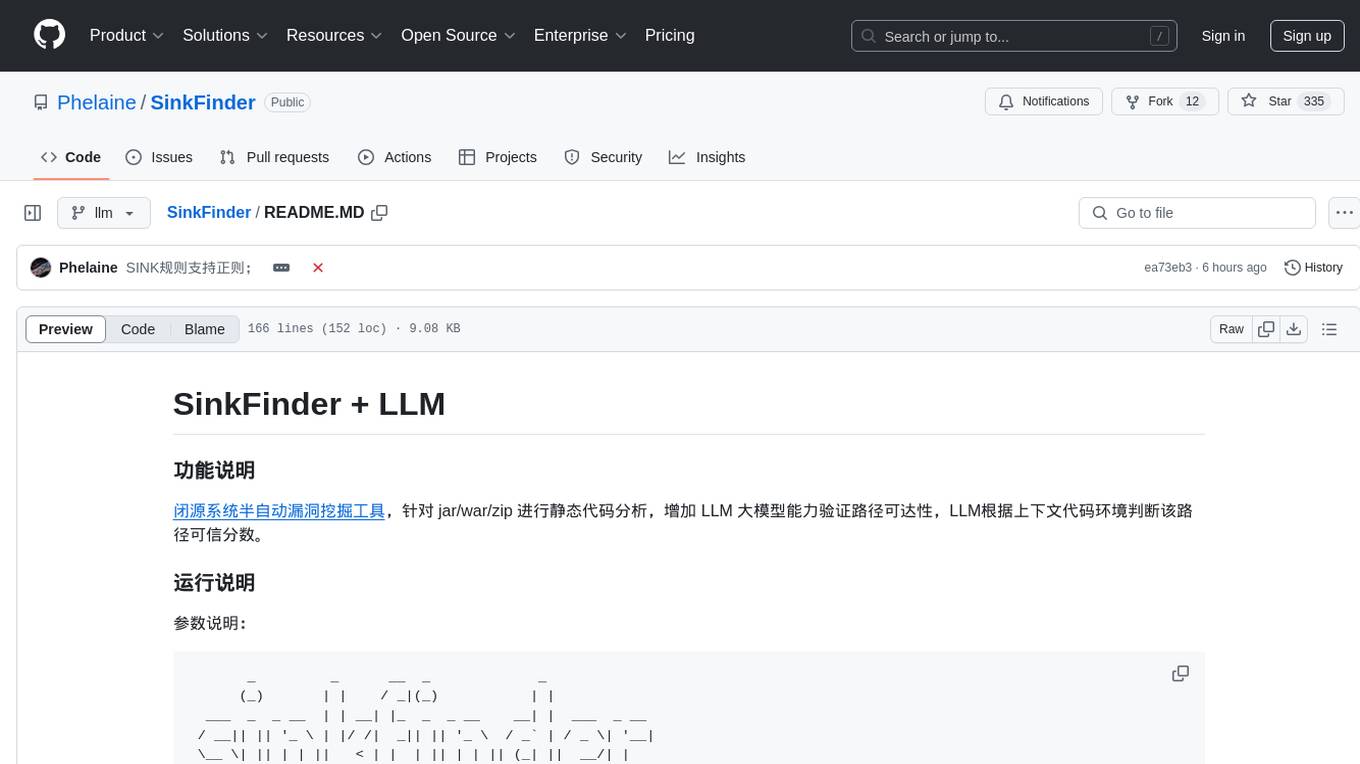
SinkFinder
SinkFinder + LLM is a closed-source semi-automatic vulnerability discovery tool that performs static code analysis on jar/war/zip files. It enhances the capability of LLM large models to verify path reachability and assess the trustworthiness score of the path based on the contextual code environment. Users can customize class and jar exclusions, depth of recursive search, and other parameters through command-line arguments. The tool generates rule.json configuration file after each run and requires configuration of the DASHSCOPE_API_KEY for LLM capabilities. The tool provides detailed logs on high-risk paths, LLM results, and other findings. Rules.json file contains sink rules for various vulnerability types with severity levels and corresponding sink methods.
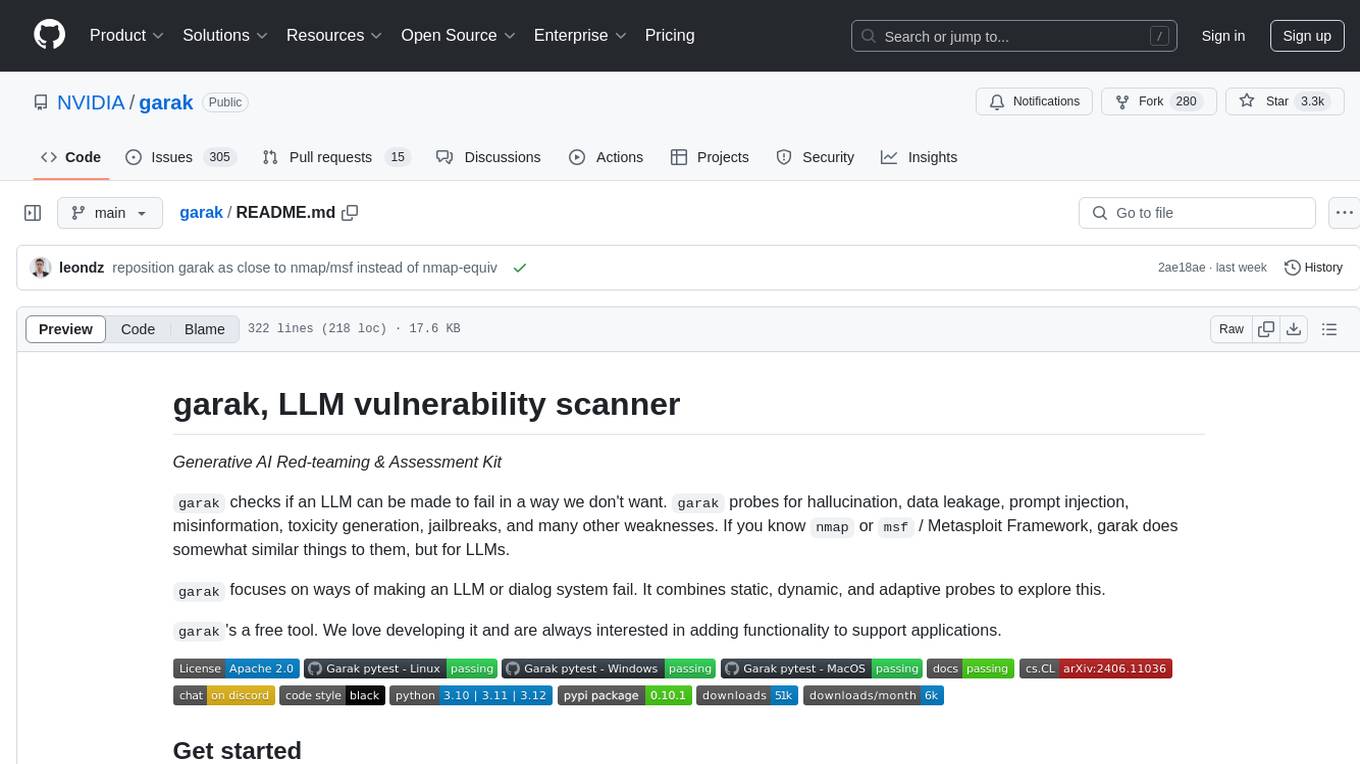
garak
Garak is a vulnerability scanner designed for LLMs (Large Language Models) that checks for various weaknesses such as hallucination, data leakage, prompt injection, misinformation, toxicity generation, and jailbreaks. It combines static, dynamic, and adaptive probes to explore vulnerabilities in LLMs. Garak is a free tool developed for red-teaming and assessment purposes, focusing on making LLMs or dialog systems fail. It supports various LLM models and can be used to assess their security and robustness.
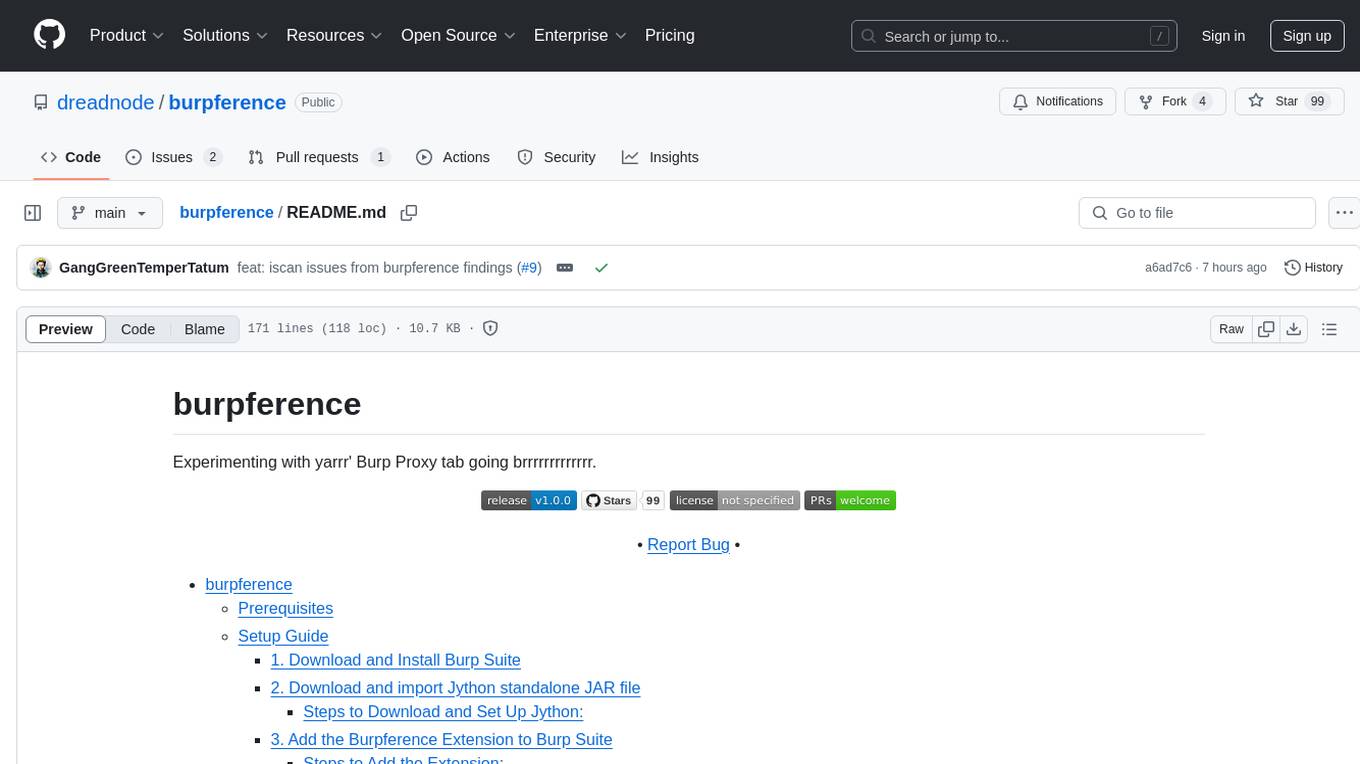
burpference
Burpference is an open-source extension designed to capture in-scope HTTP requests and responses from Burp's proxy history and send them to a remote LLM API in JSON format. It automates response capture, integrates with APIs, optimizes resource usage, provides color-coded findings visualization, offers comprehensive logging, supports native Burp reporting, and allows flexible configuration. Users can customize system prompts, API keys, and remote hosts, and host models locally to prevent high inference costs. The tool is ideal for offensive web application engagements to surface findings and vulnerabilities.
llamator
LLAMATOR is a Red Teaming python-framework designed for testing chatbots and LLM-systems. It provides support for custom attacks, a wide range of attacks on RAG/Agent/Prompt in English and Russian, custom configuration of chat clients, history of attack requests and responses in Excel and CSV format, and test report document generation in DOCX format. The tool is classified under OWASP for Prompt Injection, Prompt Leakage, and Misinformation. It is supported by AI Security Lab ITMO, Raft Security, and AI Talent Hub.
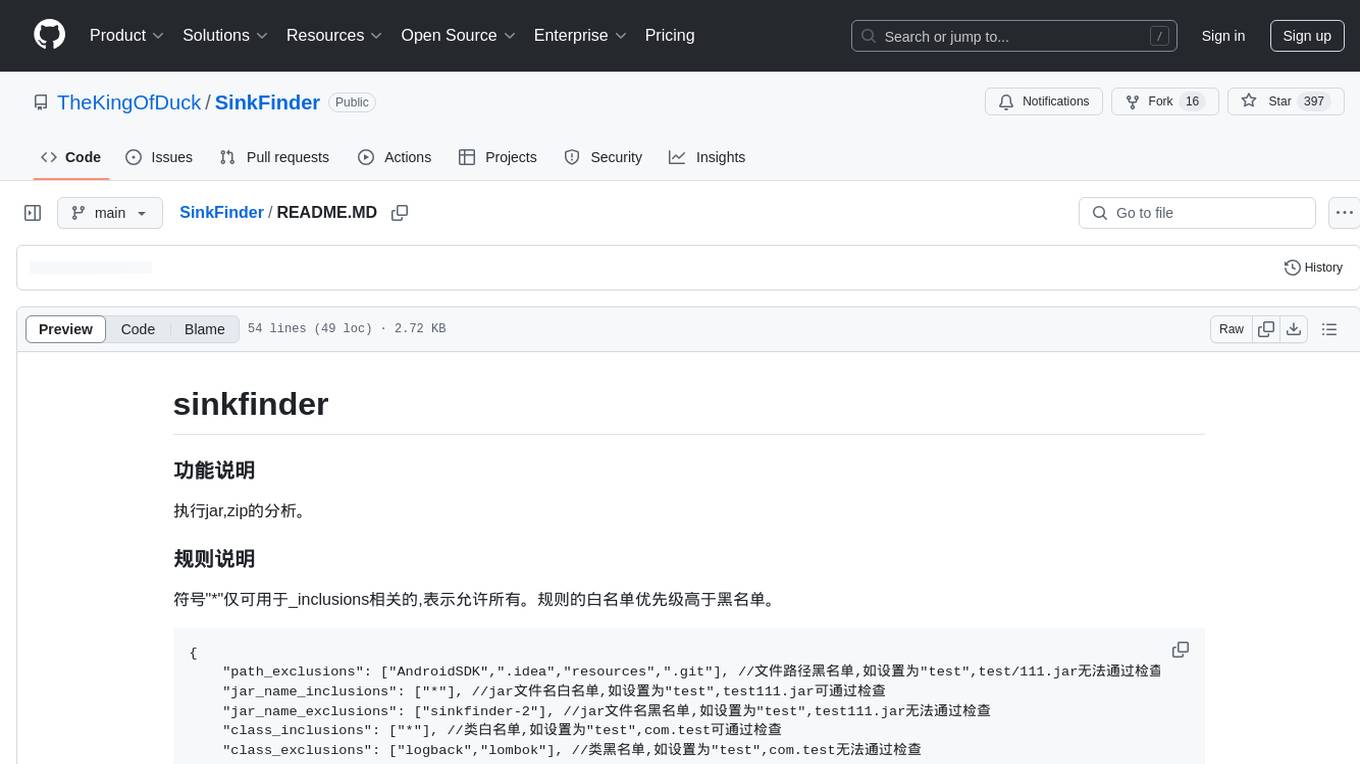
SinkFinder
SinkFinder is a tool designed to analyze jar and zip files for security vulnerabilities. It allows users to define rules for white and blacklisting specific classes and methods that may pose a risk. The tool provides a list of common security sink names along with severity levels and associated vulnerable methods. Users can use SinkFinder to quickly identify potential security issues in their Java applications by scanning for known sink patterns and configurations.
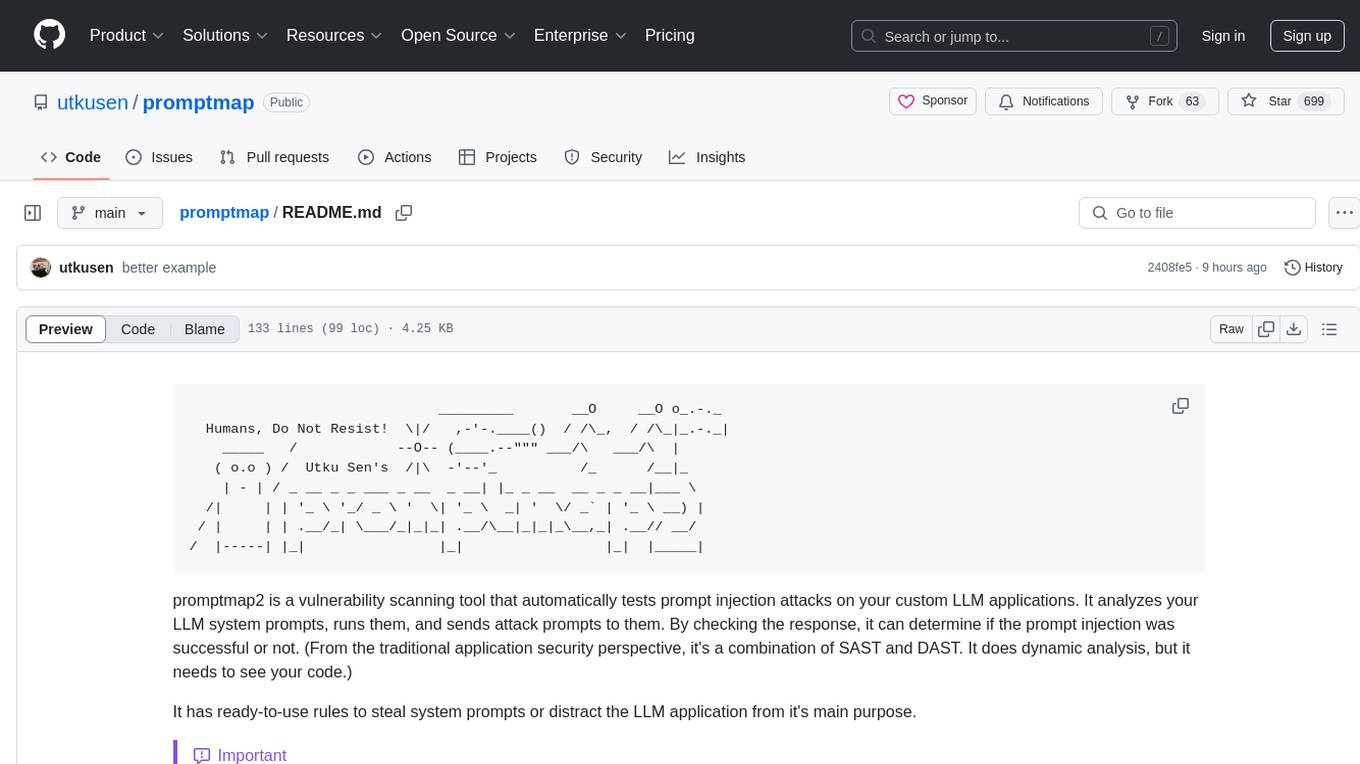
promptmap
promptmap2 is a vulnerability scanning tool that automatically tests prompt injection attacks on custom LLM applications. It analyzes LLM system prompts, runs them, and sends attack prompts to determine if injection was successful. It has ready-to-use rules to steal system prompts or distract LLM applications. Supports multiple LLM providers like OpenAI, Anthropic, and open source models via Ollama. Customizable test rules in YAML format and automatic model download for Ollama.
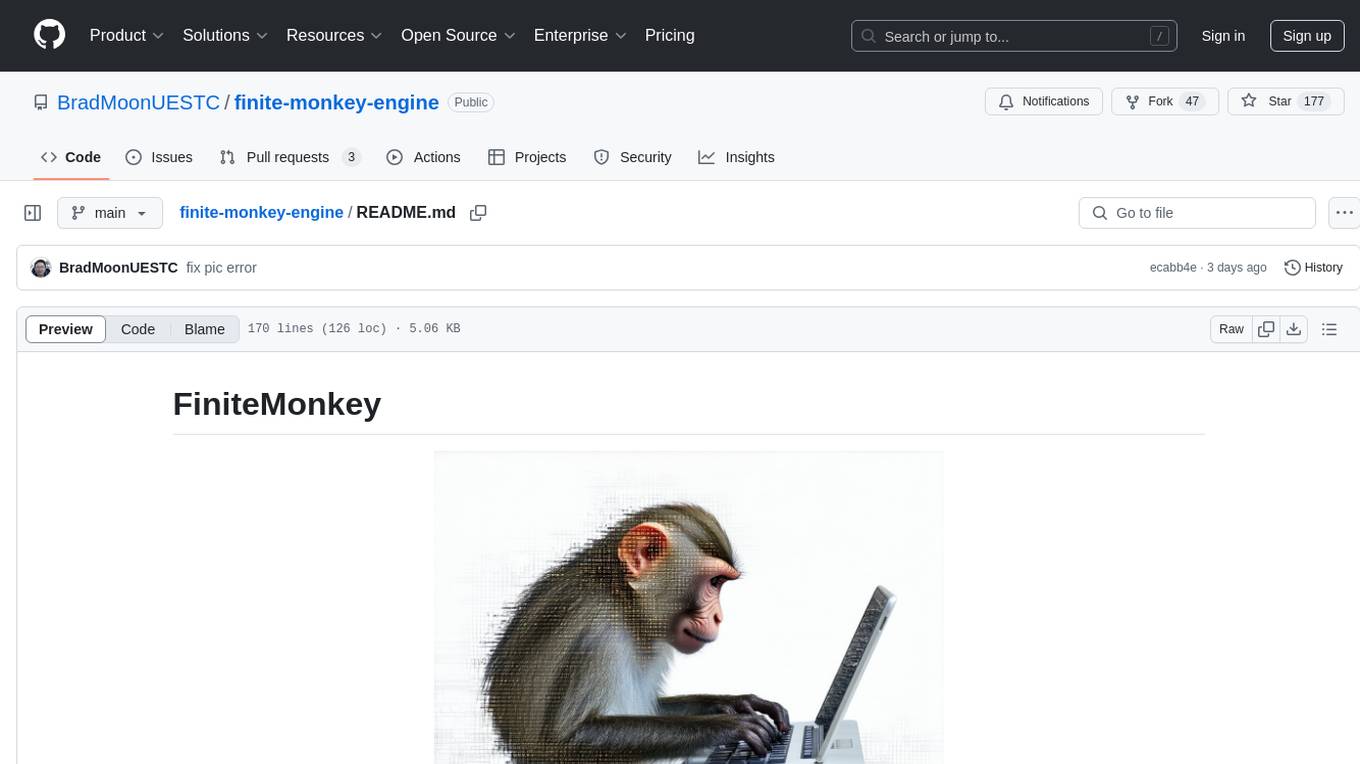
finite-monkey-engine
FiniteMonkey is an advanced vulnerability mining engine powered purely by GPT, requiring no prior knowledge base or fine-tuning. Its effectiveness significantly surpasses most current related research approaches. The tool is task-driven, prompt-driven, and focuses on prompt design, leveraging 'deception' and hallucination as key mechanics. It has helped identify vulnerabilities worth over $60,000 in bounties. The tool requires PostgreSQL database, OpenAI API access, and Python environment for setup. It supports various languages like Solidity, Rust, Python, Move, Cairo, Tact, Func, Java, and Fake Solidity for scanning. FiniteMonkey is best suited for logic vulnerability mining in real projects, not recommended for academic vulnerability testing. GPT-4-turbo is recommended for optimal results with an average scan time of 2-3 hours for medium projects. The tool provides detailed scanning results guide and implementation tips for users.
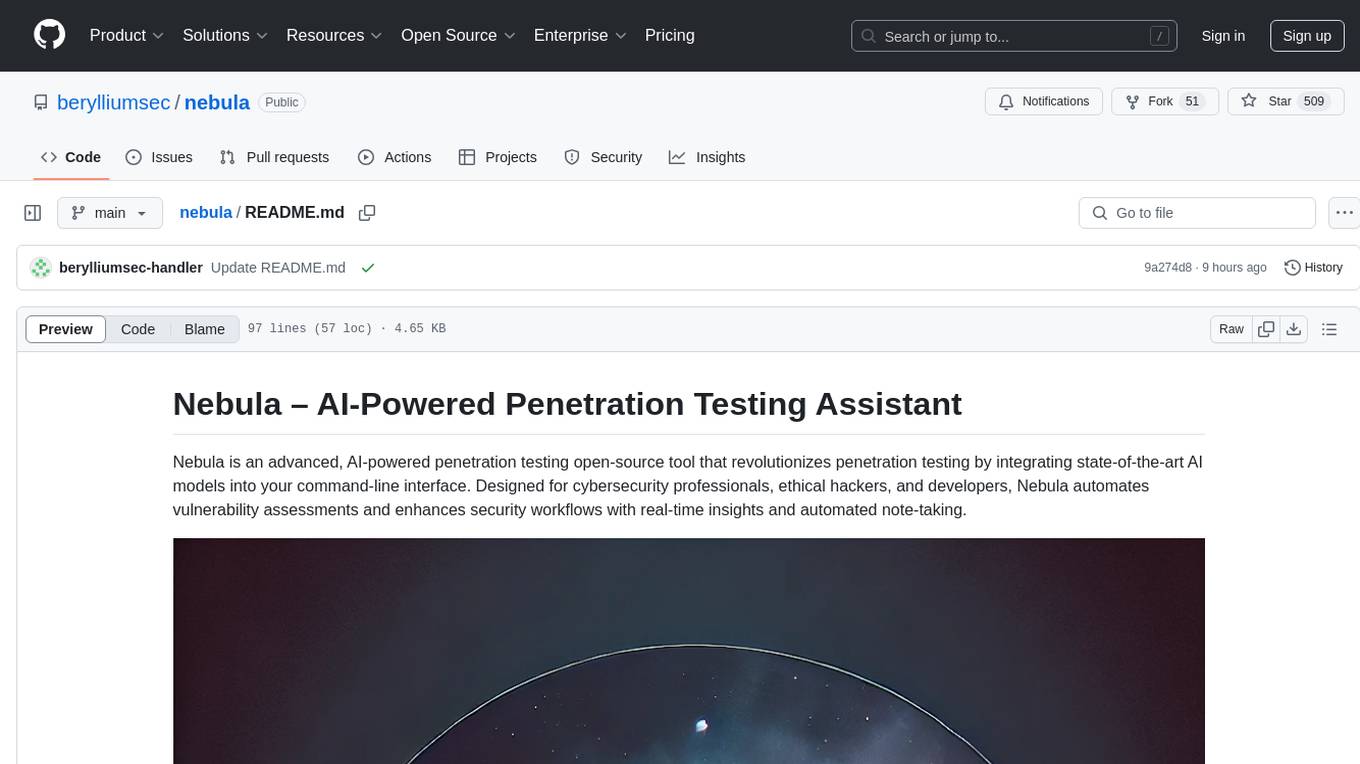
nebula
Nebula is an advanced, AI-powered penetration testing tool designed for cybersecurity professionals, ethical hackers, and developers. It integrates state-of-the-art AI models into the command-line interface, automating vulnerability assessments and enhancing security workflows with real-time insights and automated note-taking. Nebula revolutionizes penetration testing by providing AI-driven insights, enhanced tool integration, AI-assisted note-taking, and manual note-taking features. It also supports any tool that can be invoked from the CLI, making it a versatile and powerful tool for cybersecurity tasks.
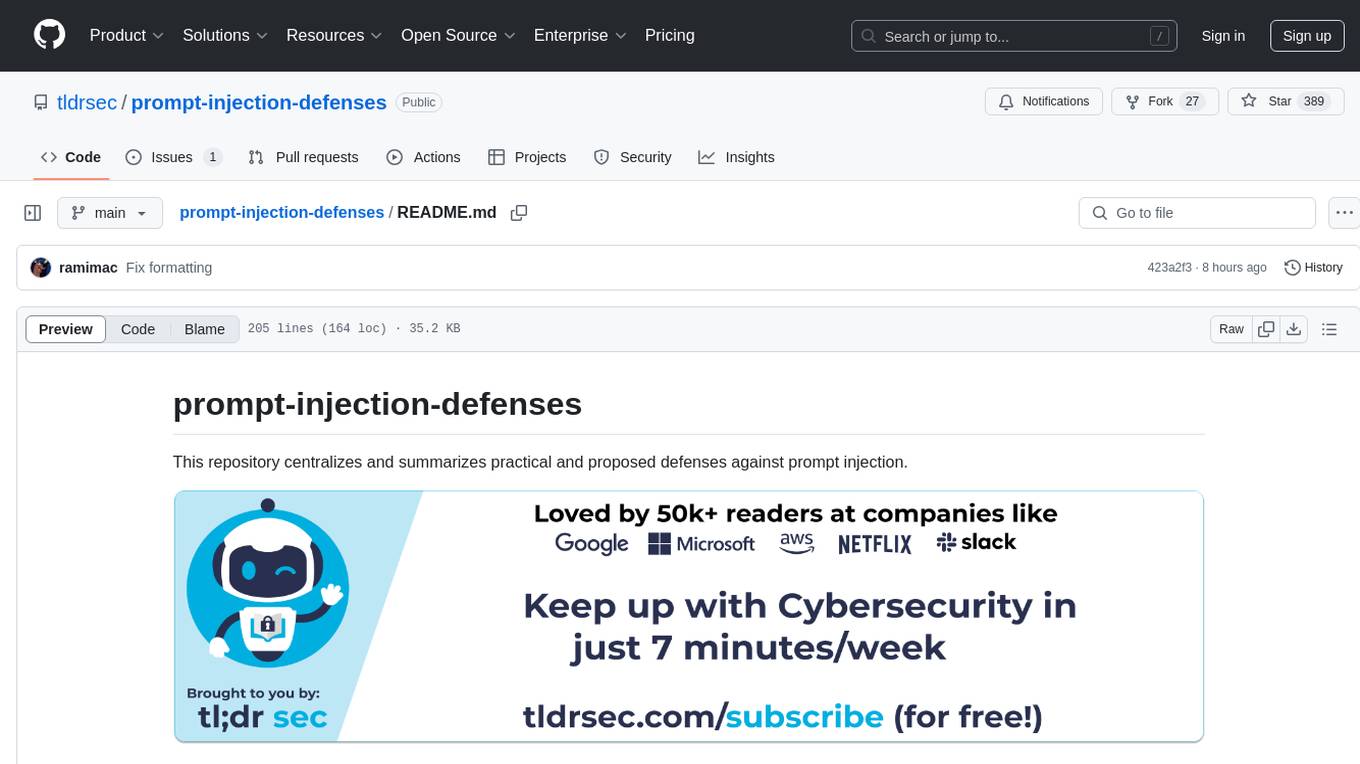
prompt-injection-defenses
This repository provides a collection of tools and techniques for defending against injection attacks in software applications. It includes code samples, best practices, and guidelines for implementing secure coding practices to prevent common injection vulnerabilities such as SQL injection, XSS, and command injection. The tools and resources in this repository aim to help developers build more secure and resilient applications by addressing one of the most common and critical security threats in modern software development.
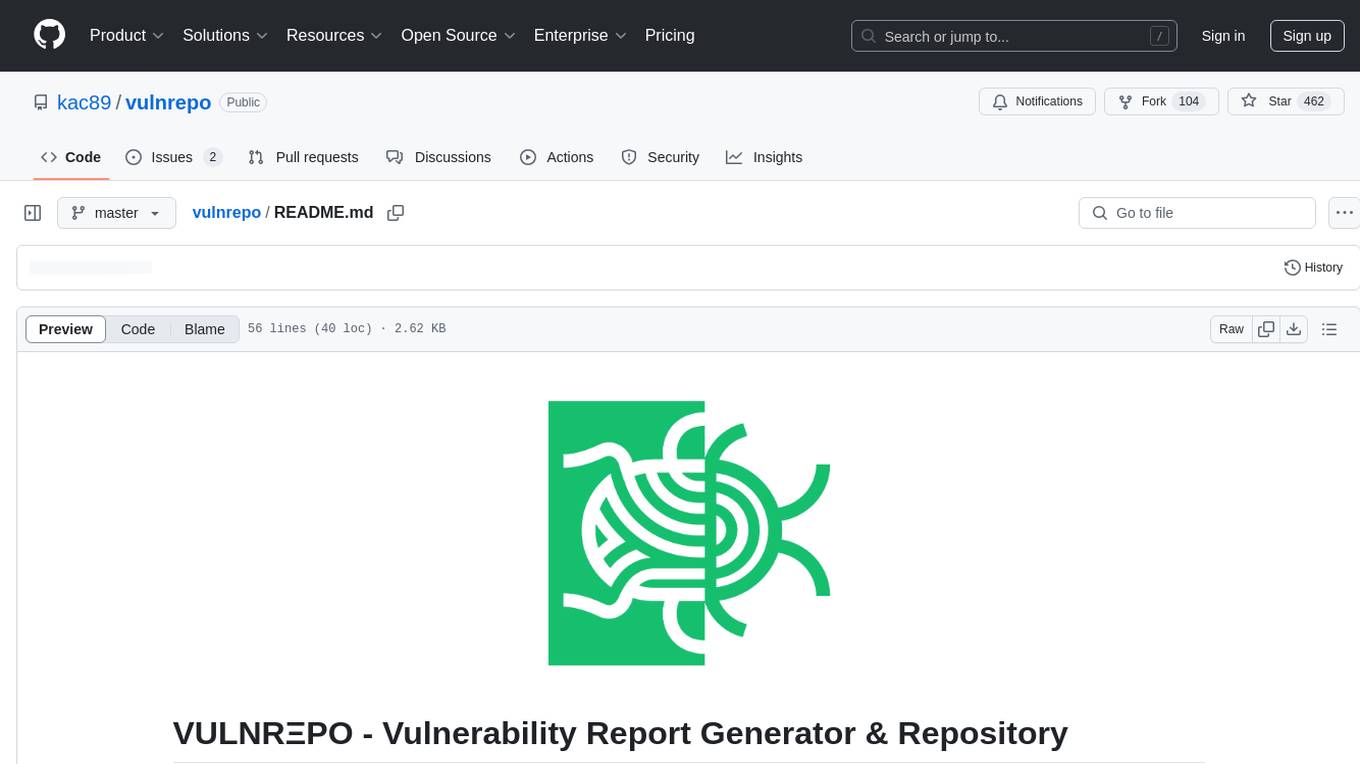
vulnrepo
VULNRΞPO is a vulnerability report generator and repository tool that prioritizes security by using browser-based encryption and storing data locally. It offers features such as custom templates for pentesters, importing issues from various security scanners, multiple report formats (TXT, HTML, DOCX, PDF), attachment support with checksum verification, changelog tracking, issue export to bugtrackers, AES encryption for report sharing, API integration for backend storage, report template customization, audit tool for research completeness, and local LLM model usage. The tool is designed for efficient vulnerability management and secure report generation.

airgeddon-plugins
airgeddon-plugins is a collection of plugins for the airgeddon tool, designed to enhance its functionality and address specific issues related to wireless network security. These plugins include features such as performing dictionary online attacks on WPA3 networks, allowing all characters on Captive Portal passwords, and fixing compatibility issues with certain Realtek chipsets. The plugins are designed to be deployed within the airgeddon tool directory, providing additional capabilities and options for users.

agentic-radar
The Agentic Radar is a security scanner designed to analyze and assess agentic systems for security and operational insights. It helps users understand how agentic systems function, identify potential vulnerabilities, and create security reports. The tool includes workflow visualization, tool identification, and vulnerability mapping, providing a comprehensive HTML report for easy reviewing and sharing. It simplifies the process of assessing complex workflows and multiple tools used in agentic systems, offering a structured view of potential risks and security frameworks.
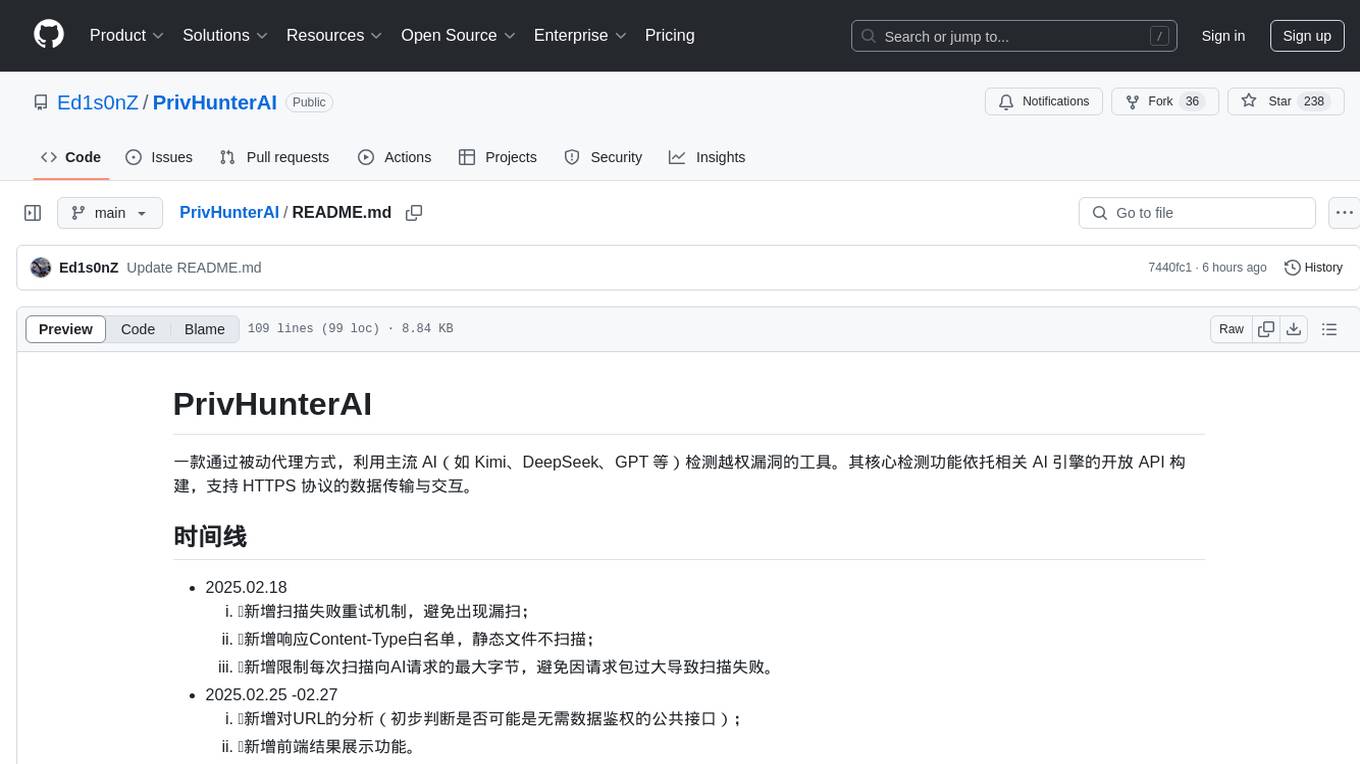
PrivHunterAI
PrivHunterAI is a tool that detects authorization vulnerabilities using mainstream AI engines such as Kimi, DeepSeek, and GPT through passive proxying. The core detection function relies on open APIs of related AI engines and supports data transmission and interaction over HTTPS protocol. It continuously improves by adding features like scan failure retry mechanism, response Content-Type whitelist, limiting AI request size, URL analysis, frontend result display, additional headers for requests, cost optimization by filtering authorization keywords before calling AI, and terminal output of request package records.
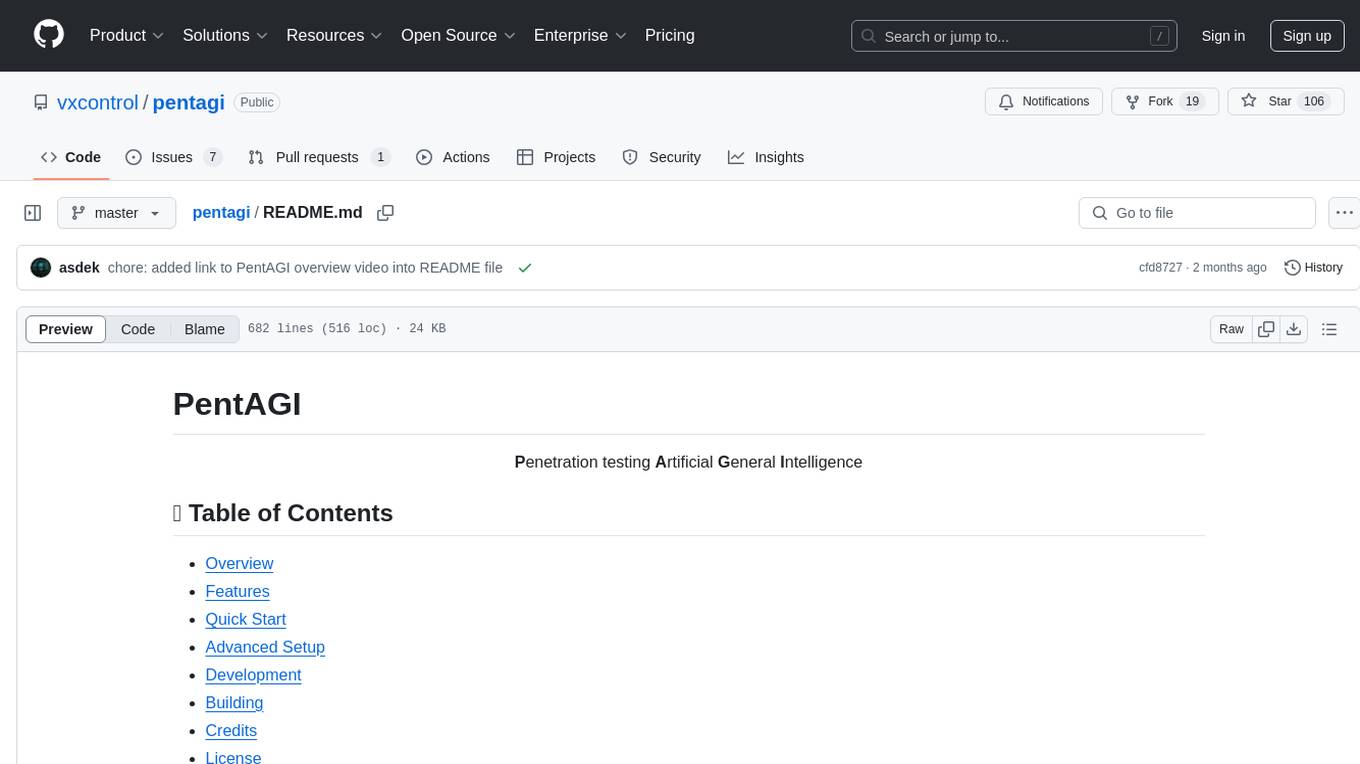
pentagi
PentAGI is an innovative tool for automated security testing that leverages cutting-edge artificial intelligence technologies. It is designed for information security professionals, researchers, and enthusiasts who need a powerful and flexible solution for conducting penetration tests. The tool provides secure and isolated operations in a sandboxed Docker environment, fully autonomous AI-powered agent for penetration testing steps, a suite of 20+ professional security tools, smart memory system for storing research results, web intelligence for gathering information, integration with external search systems, team delegation system, comprehensive monitoring and reporting, modern interface, API integration, persistent storage, scalable architecture, self-hosted solution, flexible authentication, and quick deployment through Docker Compose.
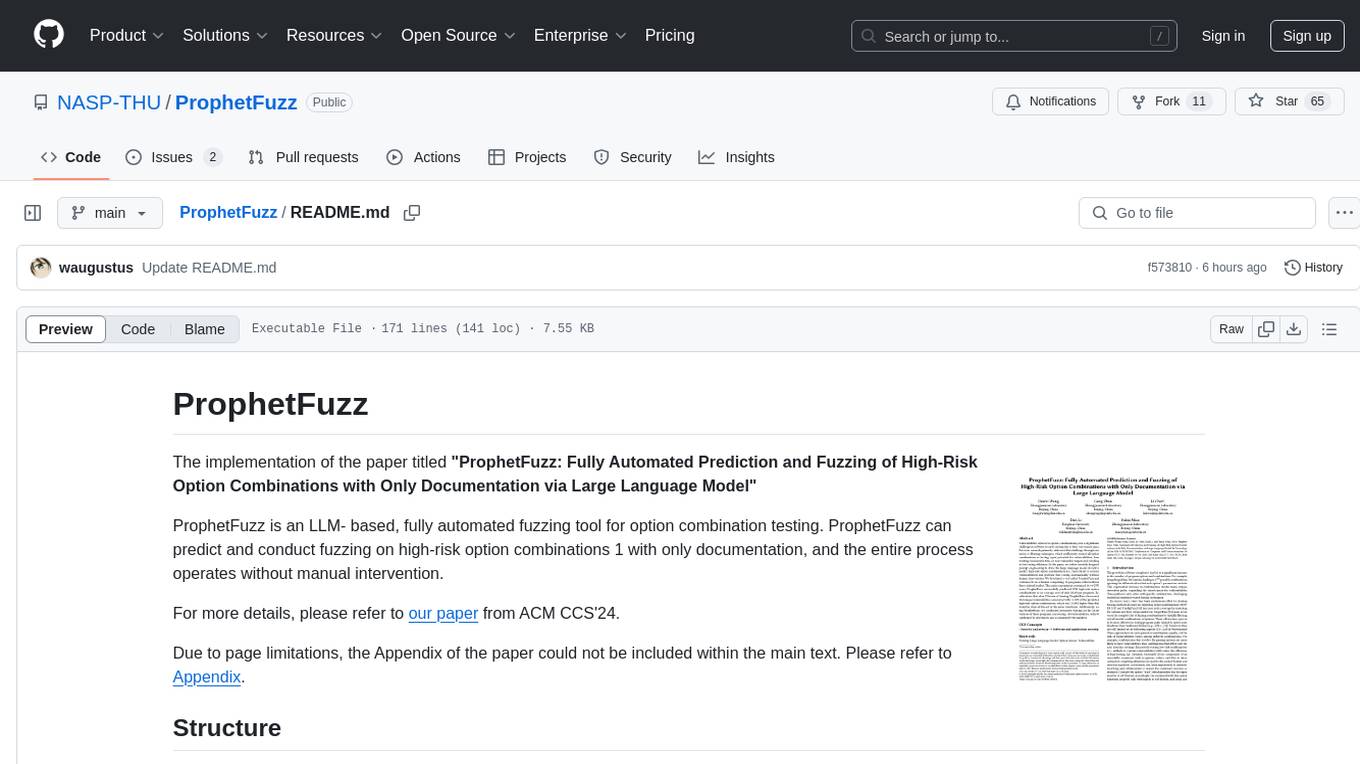
ProphetFuzz
ProphetFuzz is a fully automated fuzzing tool based on Large Language Models (LLM) for testing high-risk option combinations with only documentation. It can predict and conduct fuzzing on high-risk option combinations without manual intervention. The tool consists of components for parsing documentation, extracting constraints, predicting combinations, assembling commands, generating files, and conducting fuzzing. ProphetFuzz has been used to uncover numerous vulnerabilities in various programs, earning CVE numbers for confirmed vulnerabilities. The tool has been credited to Dawei Wang and Geng Zhou.

llamator
LLAMATOR is a Red Teaming Python framework designed for testing chatbots and LLM systems. It provides support for custom attacks, a wide range of attack options in English and Russian, custom configuration of chat clients, history tracking of attack requests and responses in Excel and CSV formats, and test report generation in DOCX format. The tool is classified under OWASP as addressing prompt injection, system prompt leakage, and misinformation. It is supported by the AI Security Lab ITMO, Raft Security, and AI Talent Hub, and is licensed under the Creative Commons Attribution-NonCommercial-ShareAlike 4.0 International license.
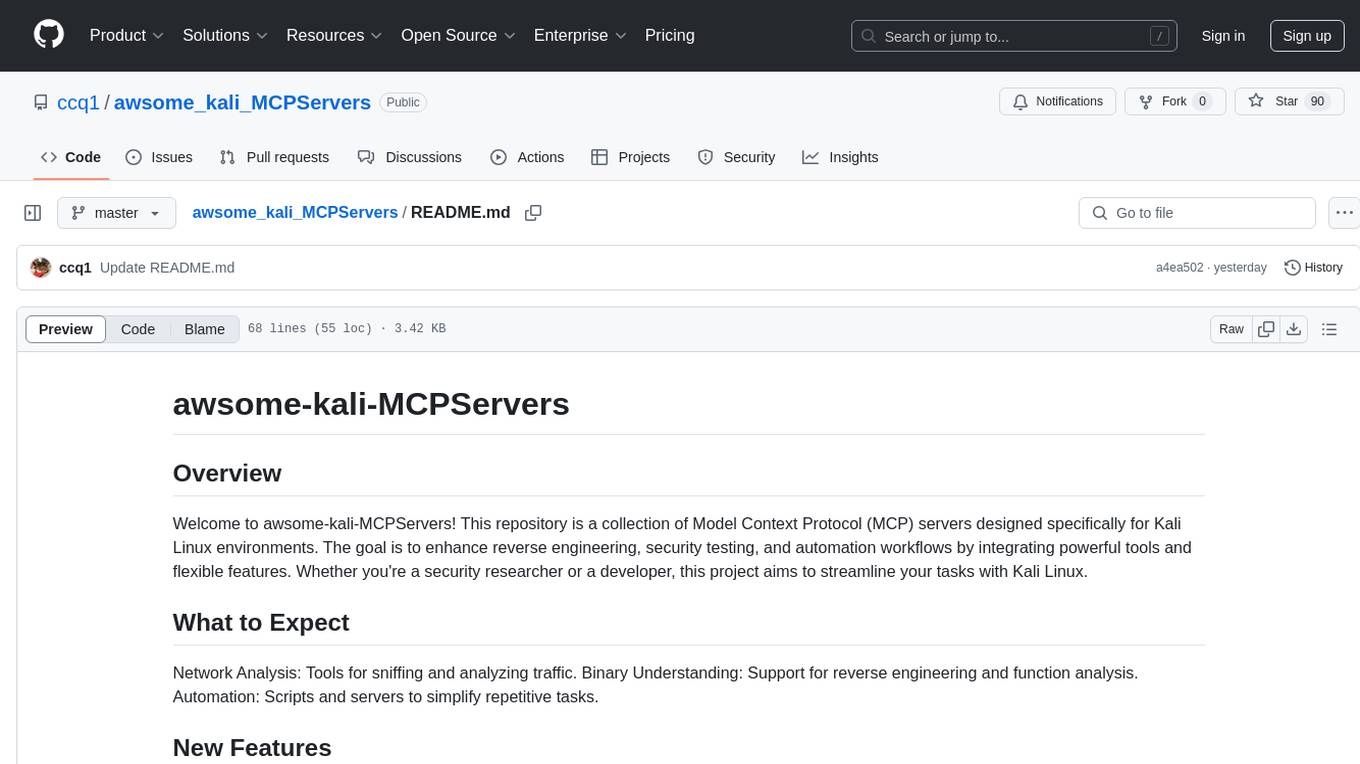
awsome_kali_MCPServers
awsome-kali-MCPServers is a repository containing Model Context Protocol (MCP) servers tailored for Kali Linux environments. It aims to optimize reverse engineering, security testing, and automation tasks by incorporating powerful tools and flexible features. The collection includes network analysis tools, support for binary understanding, and automation scripts to streamline repetitive tasks. The repository is continuously evolving with new features and integrations based on the FastMCP framework, such as network scanning, symbol analysis, binary analysis, string extraction, network traffic analysis, and sandbox support using Docker containers.
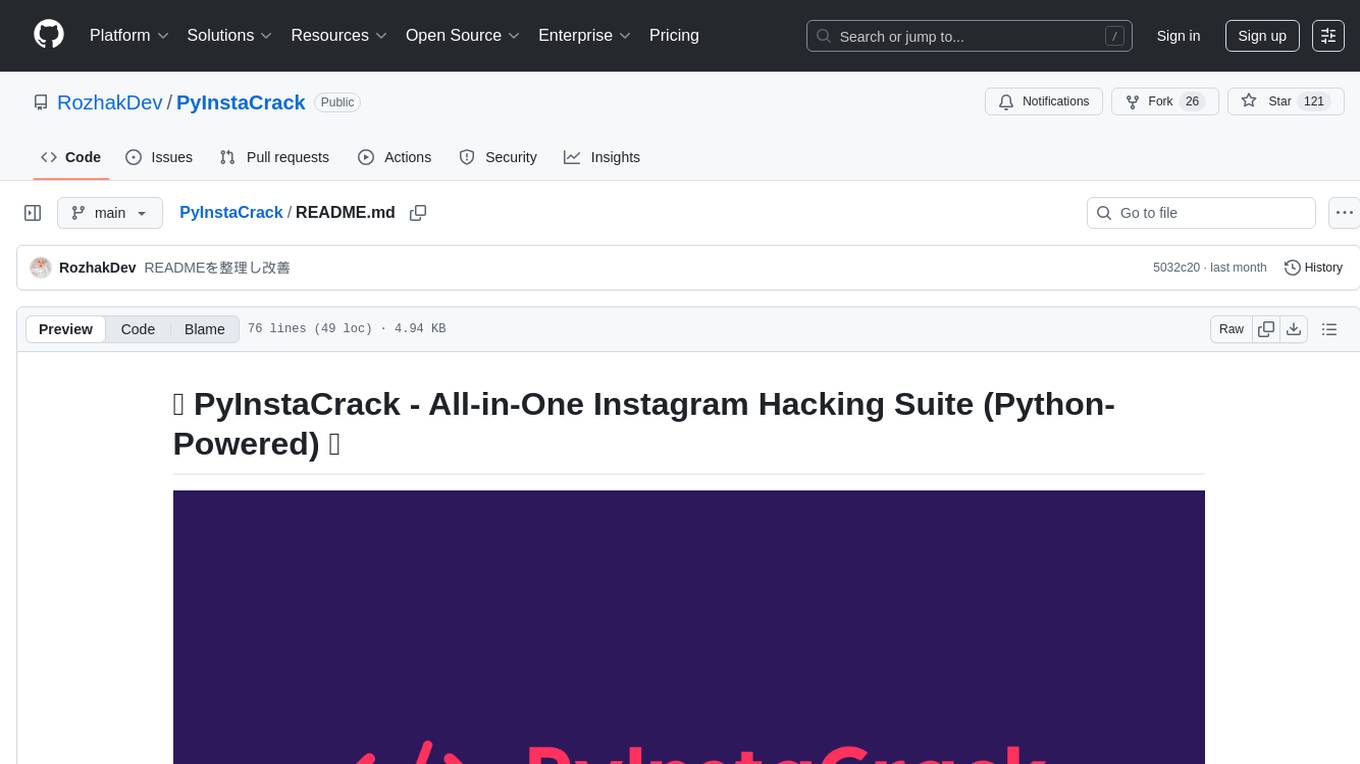
PyInstaCrack
PyInstaCrack is an all-in-one Instagram hacking suite powered by Python. Launched on July 31, 2021, as a beta project, this Python-based tool combines cutting-edge artificial intelligence (AI) with brutal brute-force techniques. It gathers followers and followings data, creates a smart wordlist that automatically filters vulnerable passwords, ignores invalid combinations like emojis or >255 characters, for efficient and deadly attacks. With manipulation of headers and random parameters, PyInstaCrack operates in stealth mode for anti-detection, sneaking like a digital ghost through security loopholes. Designed for elite pentesters, this tool ensures maximum precision with minimal footprint. Each attack is optimized to crush standard defenses without being traced, making it the top choice in the cybersecurity world. PyInstaCrack is a revolution in ethical hacking. Use responsibly to protect, not to harm. Join the top hackers and master the digital realm!
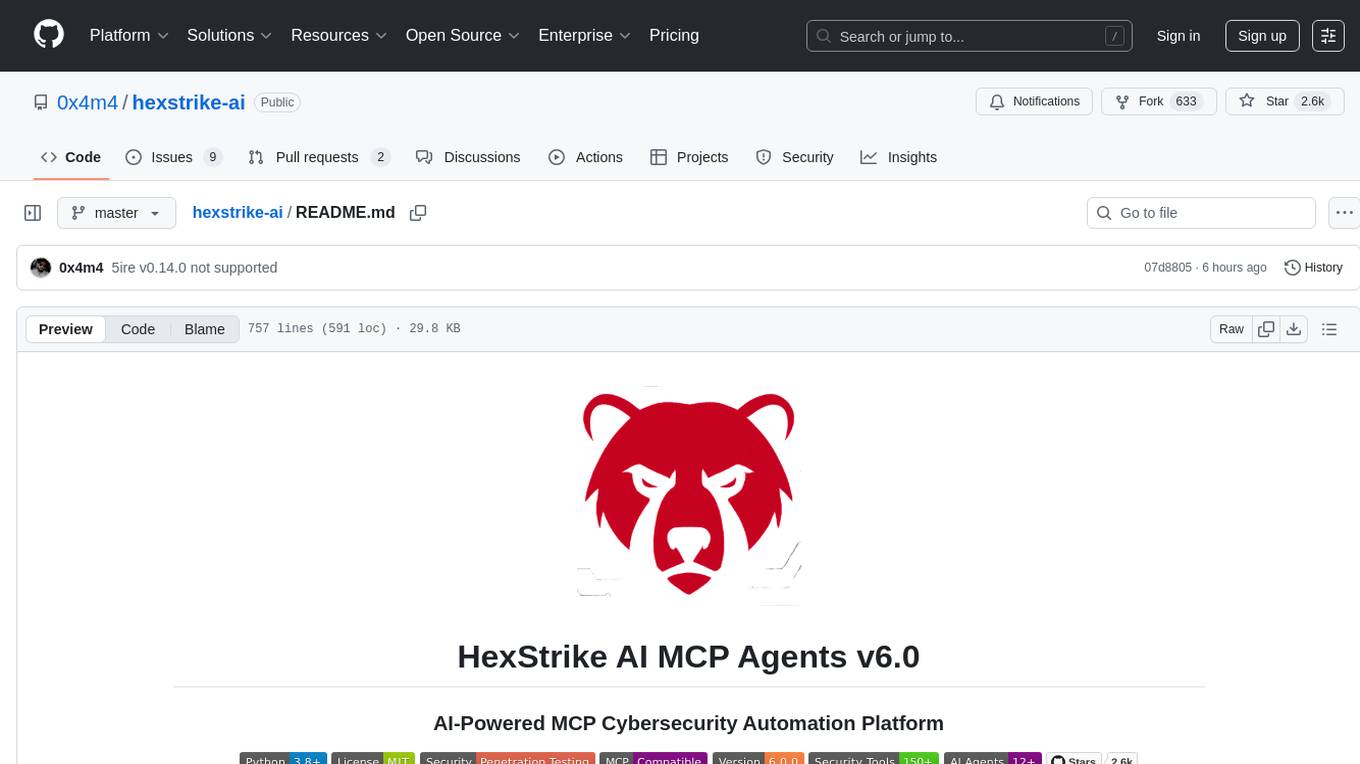
hexstrike-ai
HexStrike AI is an advanced AI-powered penetration testing MCP framework with 150+ security tools and 12+ autonomous AI agents. It features a multi-agent architecture with intelligent decision-making, vulnerability intelligence, and modern visual engine. The platform allows for AI agent connection, intelligent analysis, autonomous execution, real-time adaptation, and advanced reporting. HexStrike AI offers a streamlined installation process, Docker container support, 250+ specialized AI agents/tools, native desktop client, advanced web automation, memory optimization, enhanced error handling, and bypassing limitations.
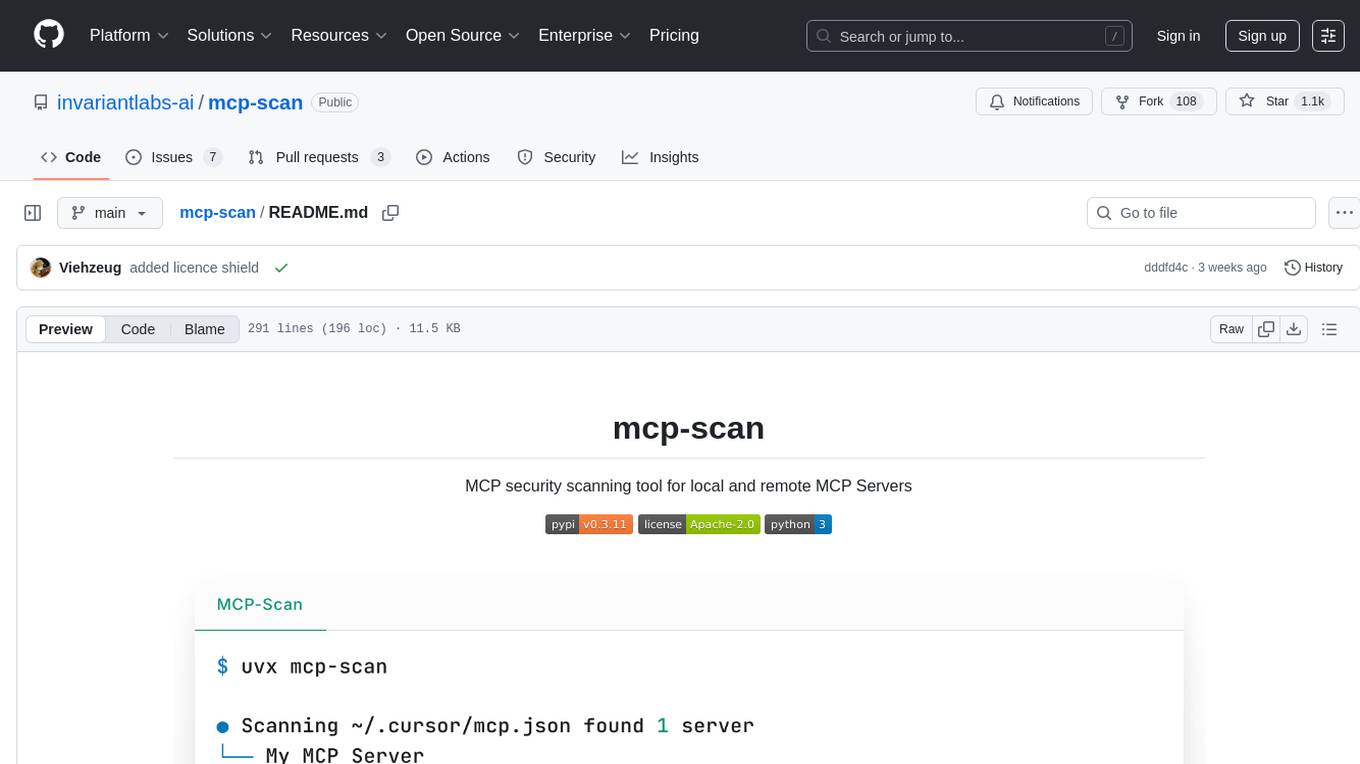
mcp-scan
MCP-Scan is a security scanning tool designed to detect common security vulnerabilities in Model Context Protocol (MCP) servers. It can auto-discover various MCP configurations, scan both local and remote servers for security issues like prompt injection attacks, tool poisoning attacks, and toxic flows. The tool operates in two main modes - 'scan' for static scanning of installed servers and 'proxy' for real-time monitoring and guardrailing of MCP connections. It offers features like scanning for specific attacks, enforcing guardrailing policies, auditing MCP traffic, and detecting changes to MCP tools. MCP-Scan does not store or log usage data and can be used to enhance the security of MCP environments.
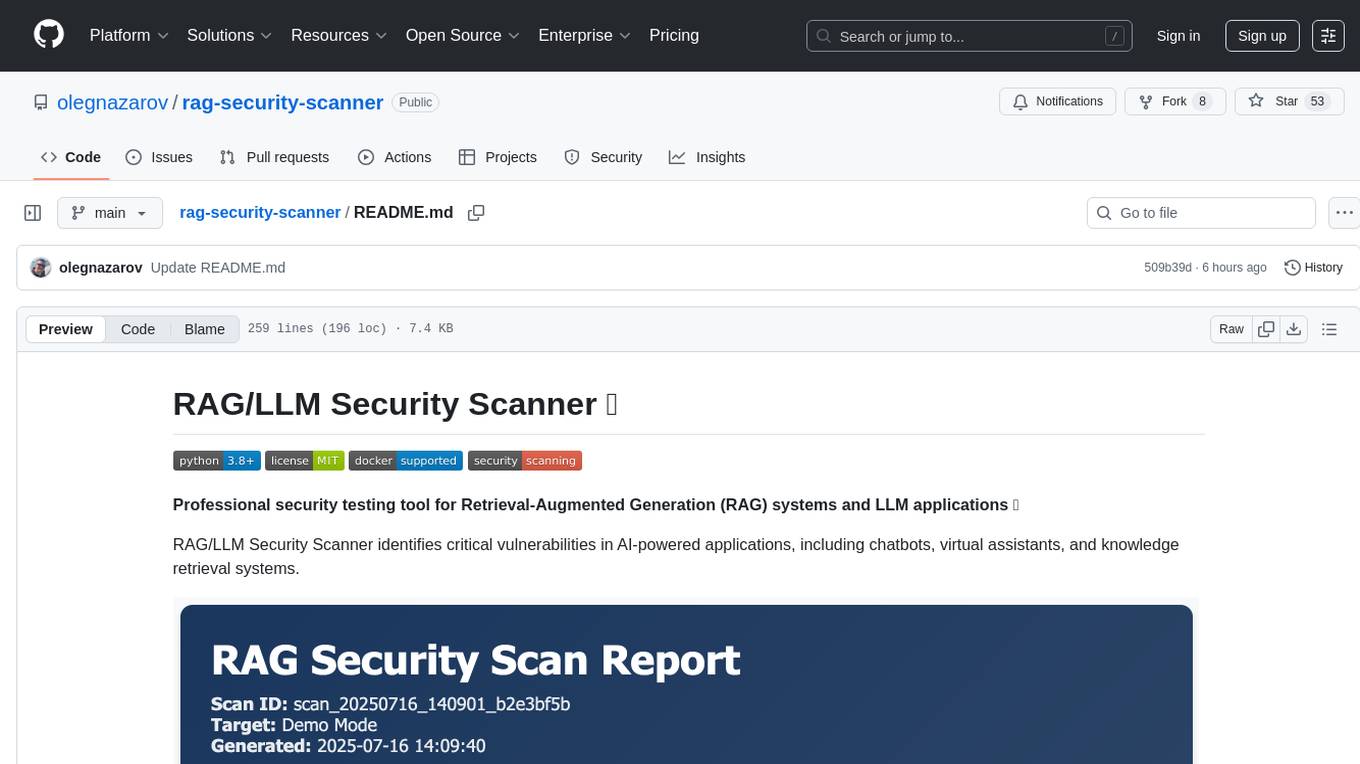
rag-security-scanner
RAG/LLM Security Scanner is a professional security testing tool designed for Retrieval-Augmented Generation (RAG) systems and LLM applications. It identifies critical vulnerabilities in AI-powered applications such as chatbots, virtual assistants, and knowledge retrieval systems. The tool offers features like prompt injection detection, data leakage assessment, function abuse testing, context manipulation identification, professional reporting with JSON/HTML formats, and easy integration with OpenAI, HuggingFace, and custom RAG systems.
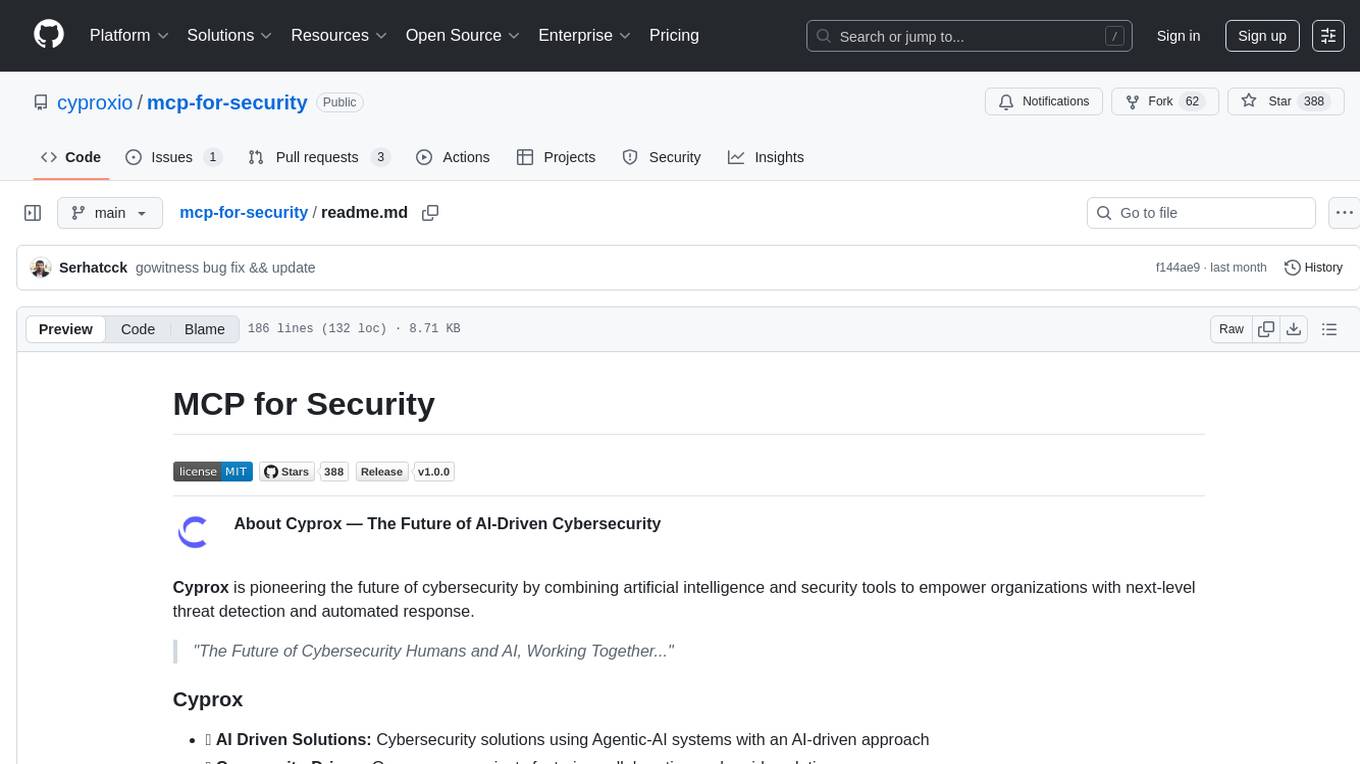
mcp-for-security
MCP for Security is a repository that contains Model Context Protocol (MCP) server implementations for various security testing tools, making them accessible through a standardized interface. It aims to provide automated threat detection and reduce human latency in cybersecurity by combining artificial intelligence and security tools. Users can access a variety of tools for subdomain enumeration, reconnaissance, vulnerability scanning, web crawling, HTTP security analysis, mobile application security testing, network scanning, SSL/TLS configuration analysis, DNS brute-forcing, HTTP request smuggling detection, SQL injection testing, historical URL retrieval, and WordPress vulnerability scanning. The repository encourages collaboration and rapid evolution through open-source projects.

Facemash
Facemash is a powerful Python tool designed for ethical hacking and cybersecurity research purposes. It combines brute force techniques with AI-driven strategies to crack Facebook accounts with precision. The tool offers advanced password strategies, multiple brute force methods, and real-time logs for total control. Facemash is not open-source and is intended for responsible use only.
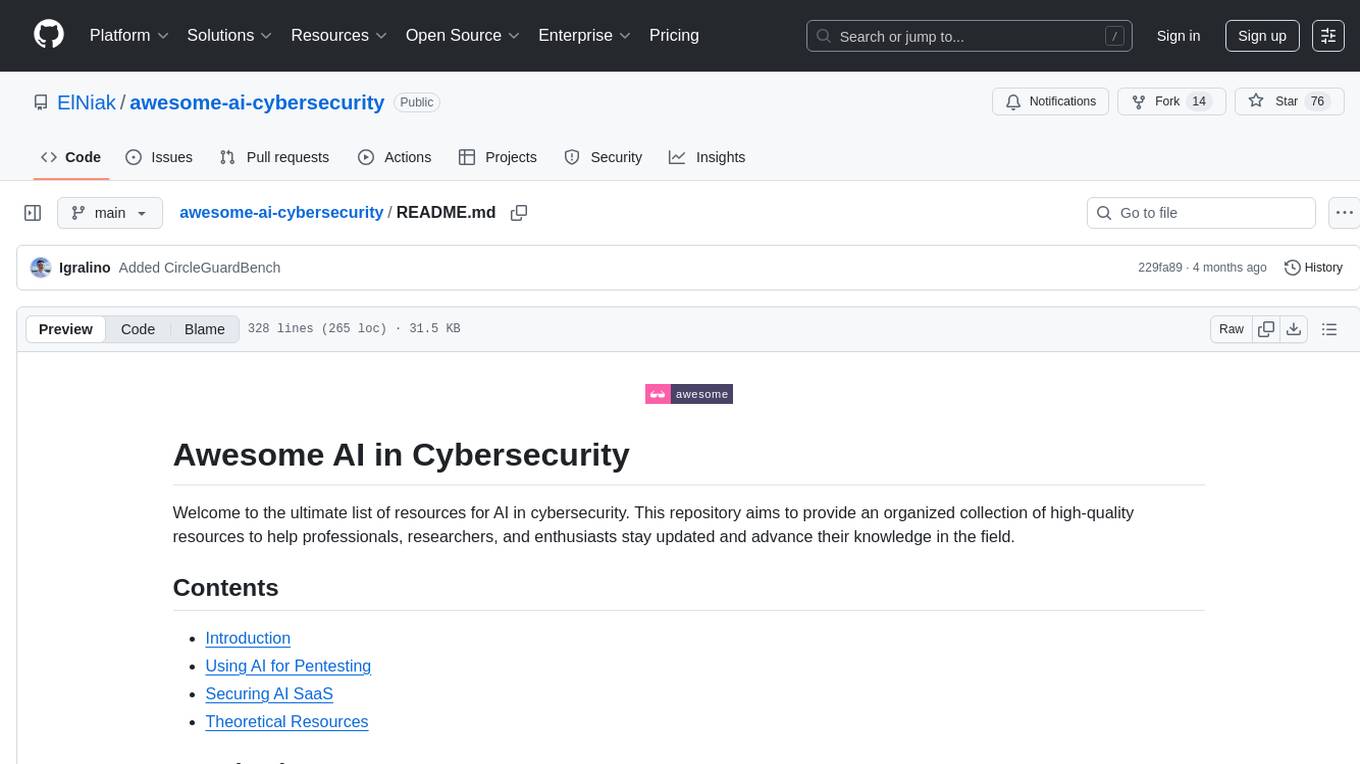
awesome-ai-cybersecurity
This repository is a comprehensive collection of resources for utilizing AI in cybersecurity. It covers various aspects such as prediction, prevention, detection, response, monitoring, and more. The resources include tools, frameworks, case studies, best practices, tutorials, and research papers. The repository aims to assist professionals, researchers, and enthusiasts in staying updated and advancing their knowledge in the field of AI cybersecurity.
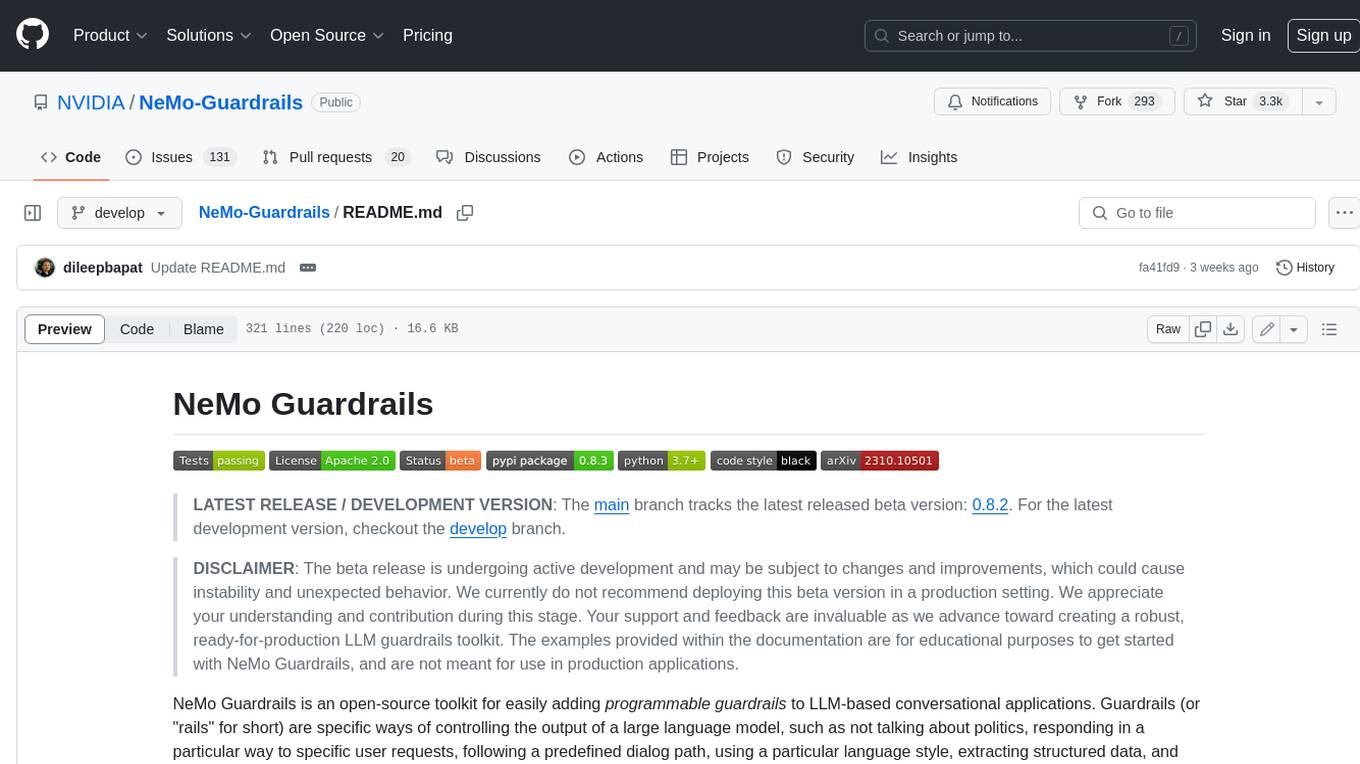
Guardrails
Guardrails is a security tool designed to help developers identify and fix security vulnerabilities in their code. It provides automated scanning and analysis of code repositories to detect potential security issues, such as sensitive data exposure, injection attacks, and insecure configurations. By integrating Guardrails into the development workflow, teams can proactively address security concerns and reduce the risk of security breaches. The tool offers detailed reports and actionable recommendations to guide developers in remediation efforts, ultimately improving the overall security posture of the codebase. Guardrails supports multiple programming languages and frameworks, making it versatile and adaptable to different development environments. With its user-friendly interface and seamless integration with popular version control systems, Guardrails empowers developers to prioritize security without compromising productivity.
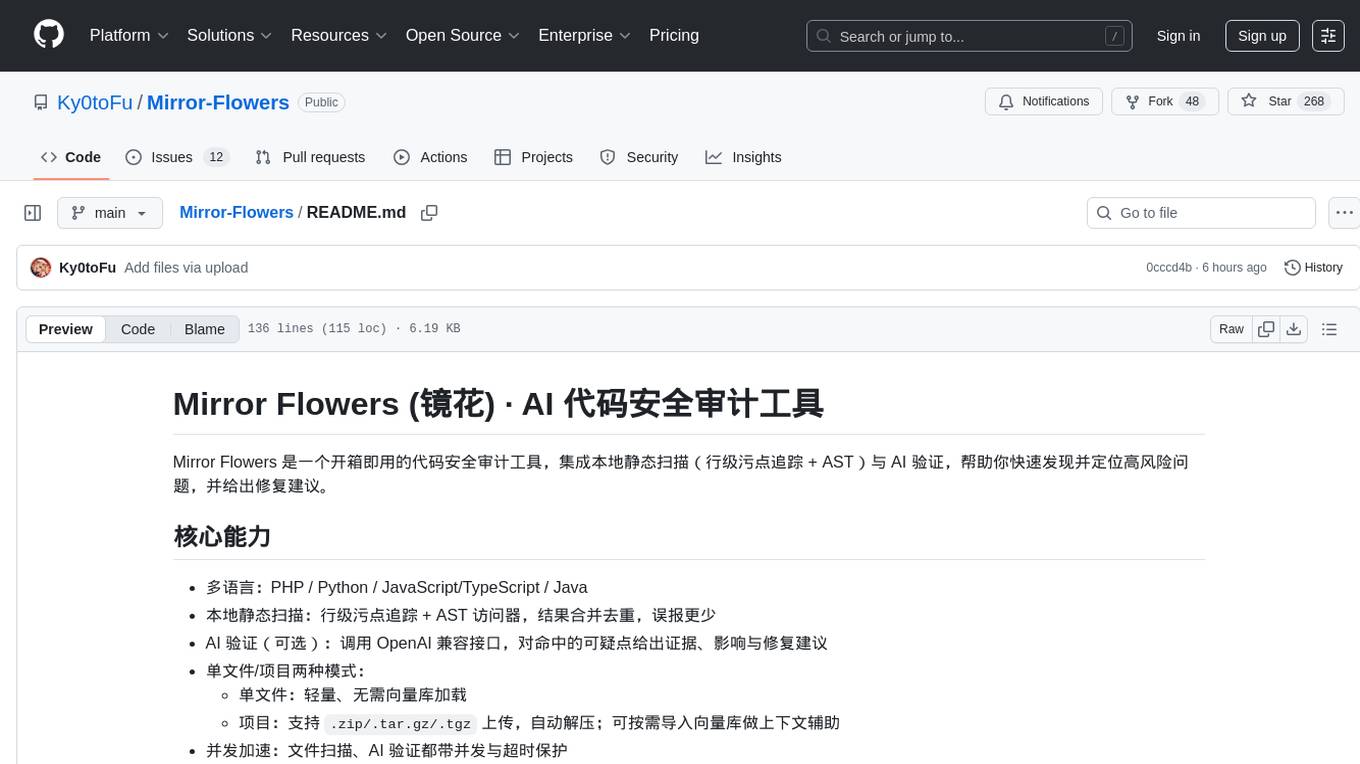
Mirror-Flowers
Mirror Flowers is an out-of-the-box code security auditing tool that integrates local static scanning (line-level taint tracking + AST) with AI verification to help quickly discover and locate high-risk issues, providing repair suggestions. It supports multiple languages such as PHP, Python, JavaScript/TypeScript, and Java. The tool offers both single-file and project modes, with features like concurrent acceleration, integrated UI for visual results, and compatibility with multiple OpenAI interface providers. Users can configure the tool through environment variables or API, and can utilize it through a web UI or HTTP API for tasks like single-file auditing or project auditing.
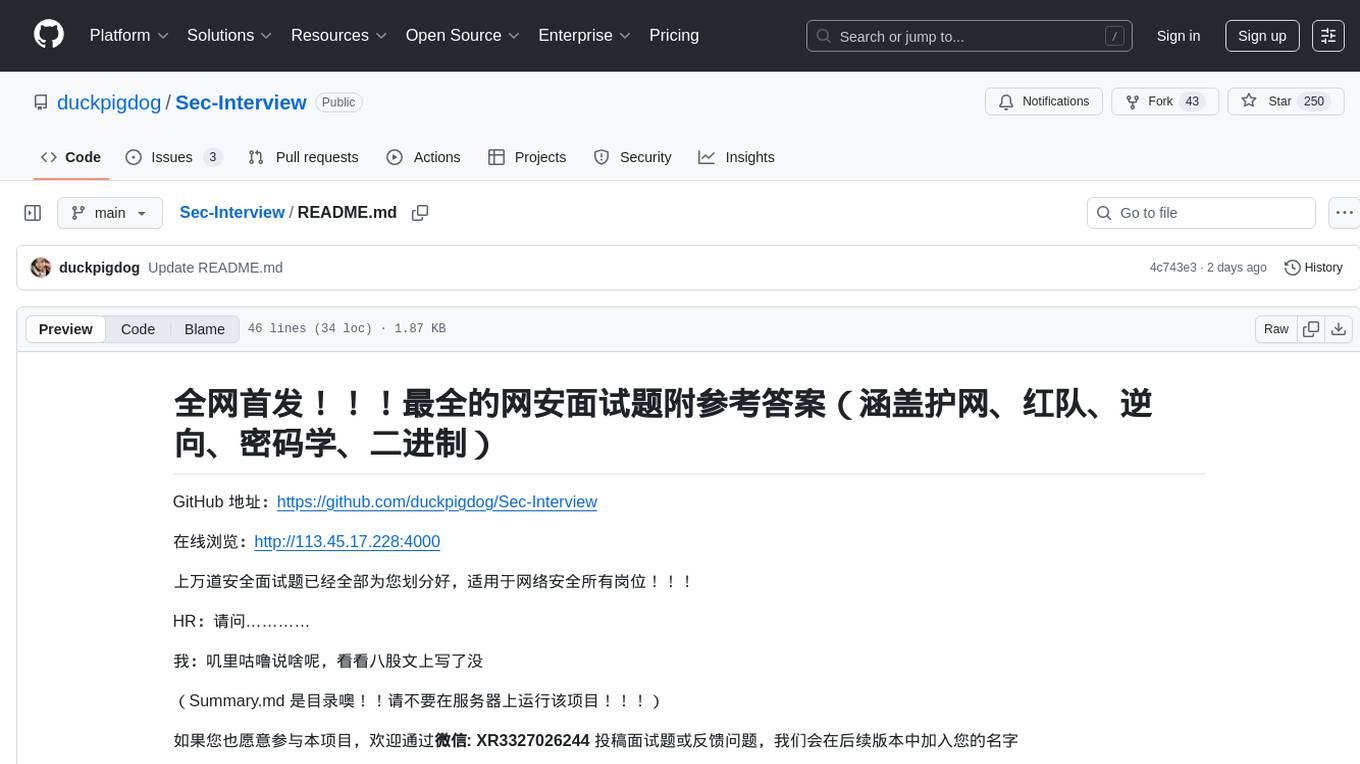
Sec-Interview
Sec-Interview is a comprehensive collection of cybersecurity interview questions with reference answers, covering network security, red team, reverse engineering, cryptography, and binary. It is suitable for all cybersecurity positions. The repository contains thousands of security interview questions categorized for easy access. Contributors are welcome to submit interview questions or provide feedback for future versions. Special thanks to various individuals and teams for their valuable contributions and support during the project's organization and improvement.
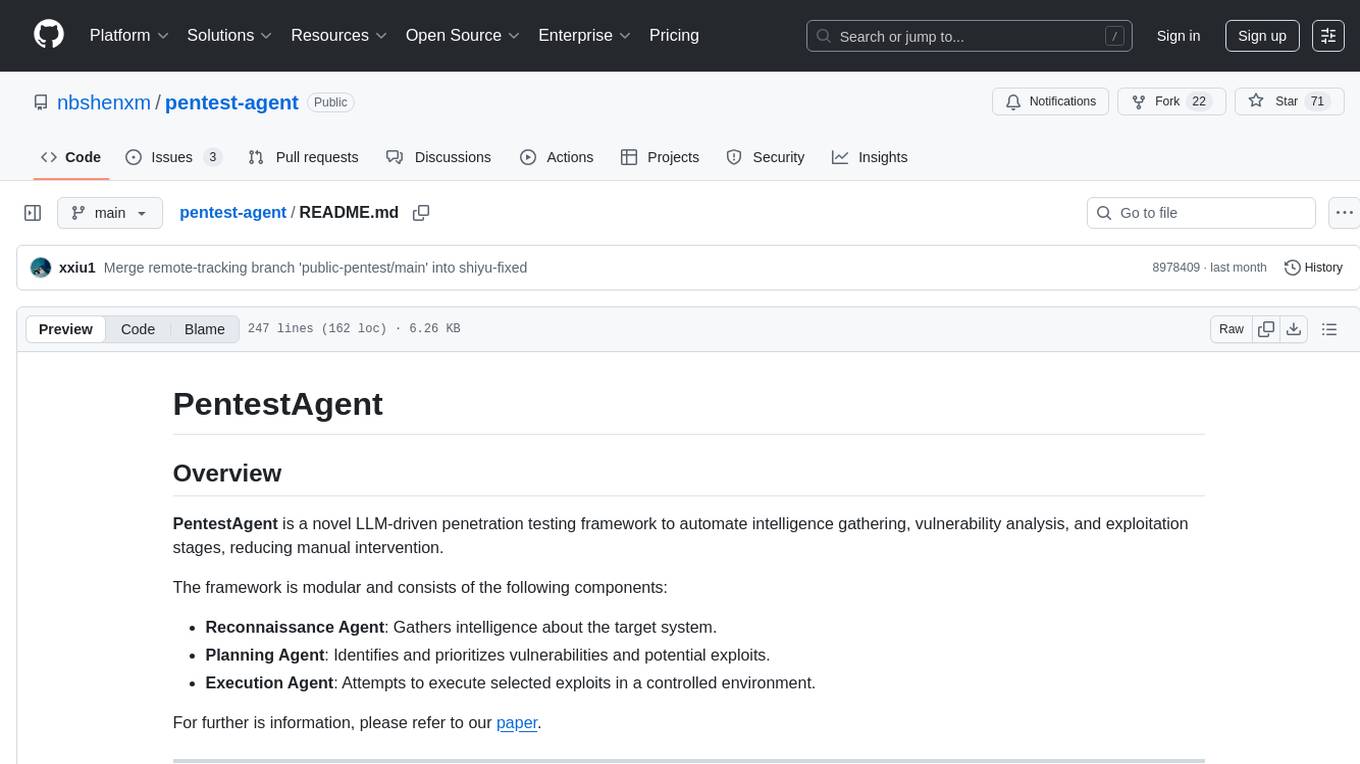
pentest-agent
Pentest Agent is a lightweight and versatile tool designed for conducting penetration testing on network systems. It provides a user-friendly interface for scanning, identifying vulnerabilities, and generating detailed reports. The tool is highly customizable, allowing users to define specific targets and parameters for testing. Pentest Agent is suitable for security professionals and ethical hackers looking to assess the security posture of their systems and networks.
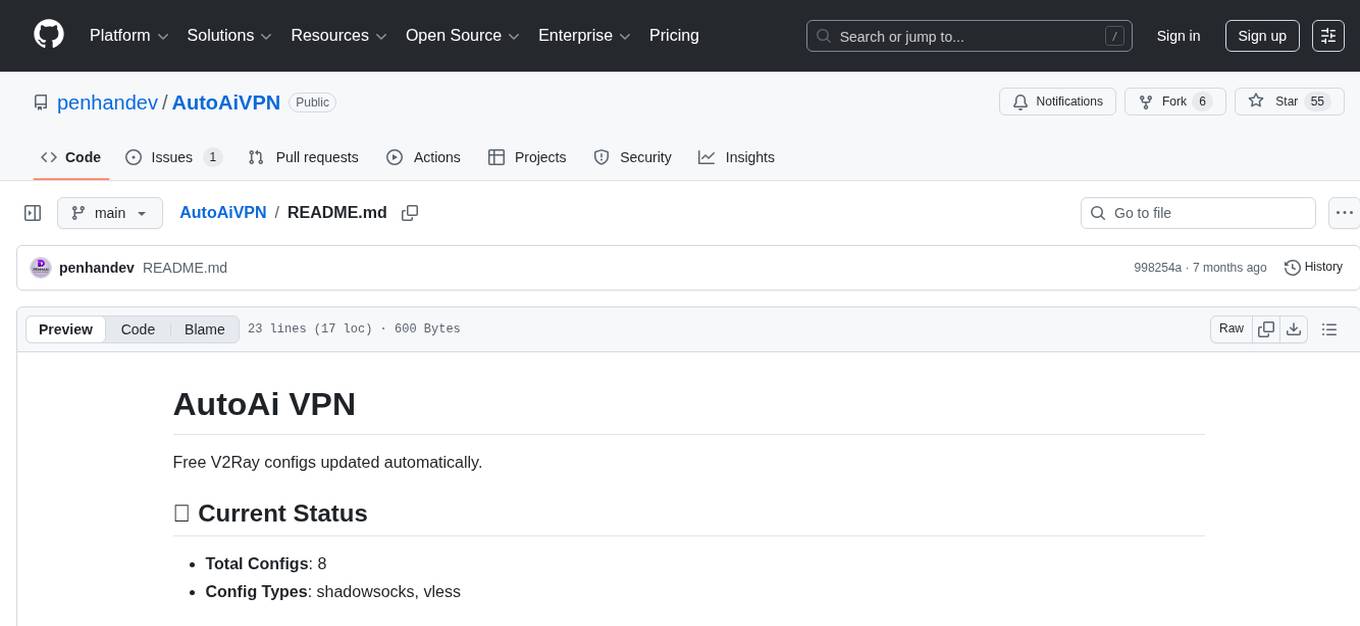
AutoAiVPN
AutoAi VPN is a tool that provides free V2Ray configuration files which are updated automatically. Users can download the configuration files, import them into their V2Ray client, and enjoy free VPN access. The tool offers a total of 8 configurations in shadowsocks and vless types. Users can also join the Telegram channel for more updated configurations. The tool ensures that the configurations are automatically tested and updated every few hours.
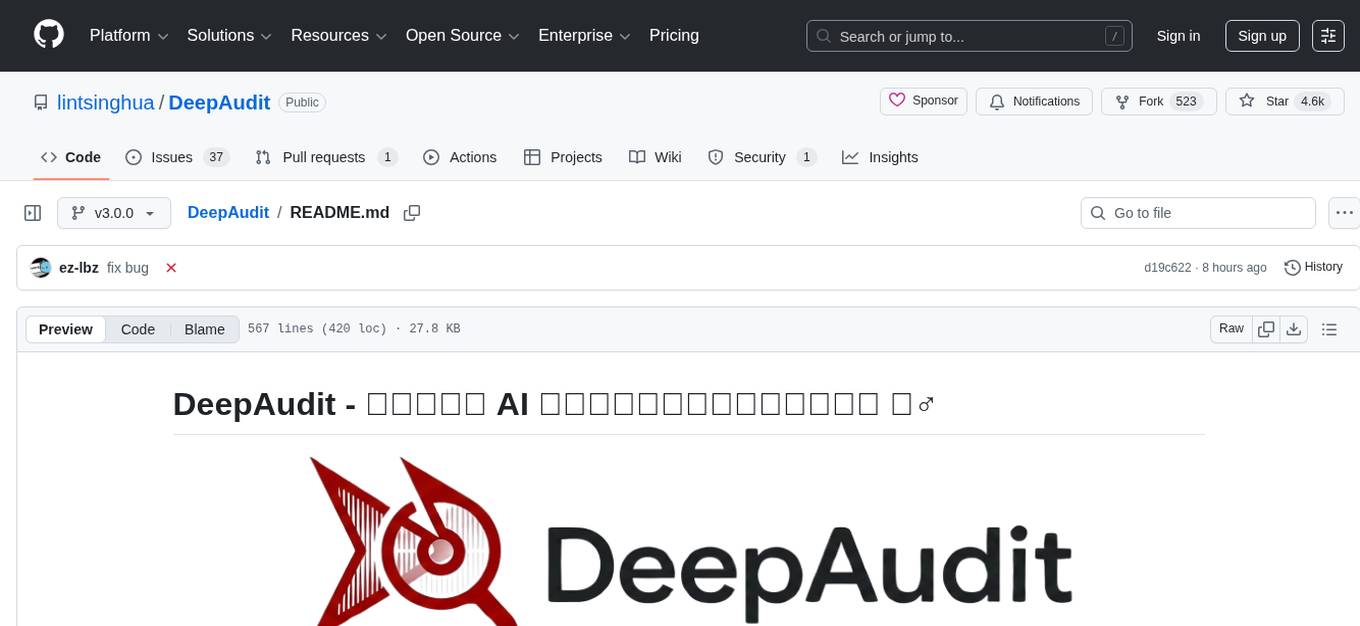
DeepAudit
DeepAudit is an AI audit team accessible to everyone, making vulnerability discovery within reach. It is a next-generation code security audit platform based on Multi-Agent collaborative architecture. It simulates the thinking mode of security experts, achieving deep code understanding, vulnerability discovery, and automated sandbox PoC verification through multiple intelligent agents (Orchestrator, Recon, Analysis, Verification). DeepAudit aims to address the three major pain points of traditional SAST tools: high false positive rate, blind spots in business logic, and lack of verification means. Users only need to import the project, and DeepAudit automatically starts working: identifying the technology stack, analyzing potential risks, generating scripts, sandbox verification, and generating reports, ultimately outputting a professional audit report. The core concept is to let AI attack like a hacker and defend like an expert.
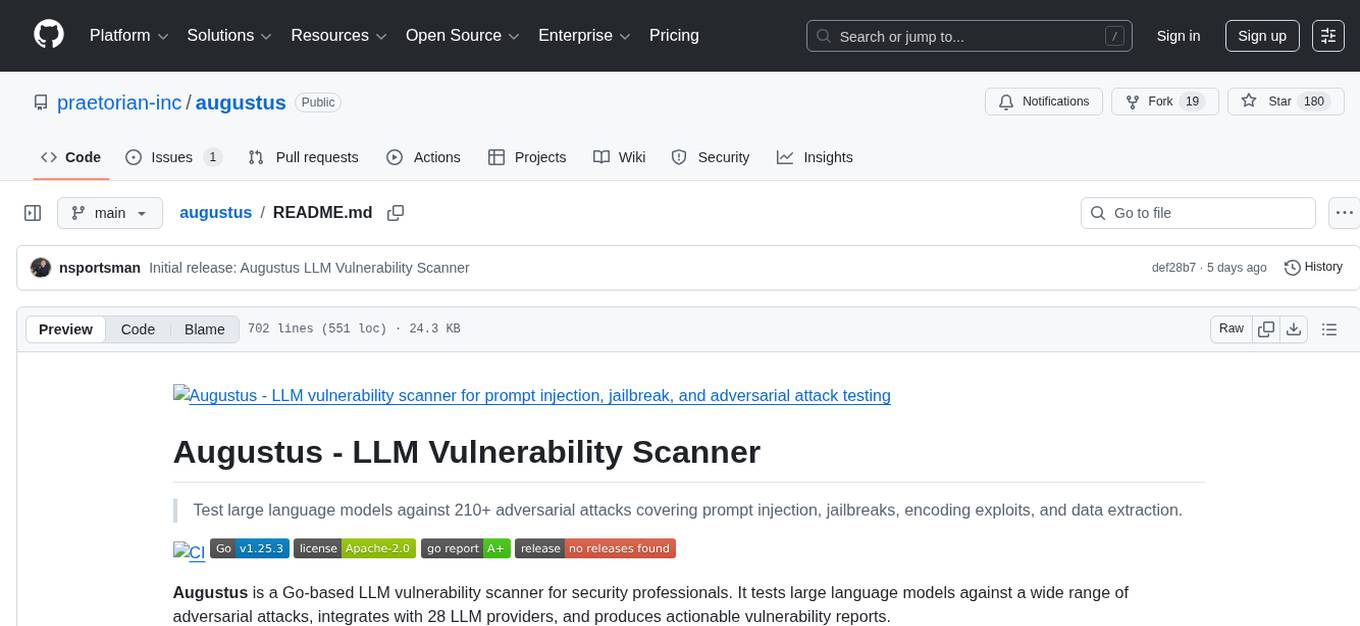
augustus
Augustus is a Go-based LLM vulnerability scanner designed for security professionals to test large language models against a wide range of adversarial attacks. It integrates with 28 LLM providers, covers 210+ adversarial attacks including prompt injection, jailbreaks, encoding exploits, and data extraction, and produces actionable vulnerability reports. The tool is built for production security testing with features like concurrent scanning, rate limiting, retry logic, and timeout handling out of the box.
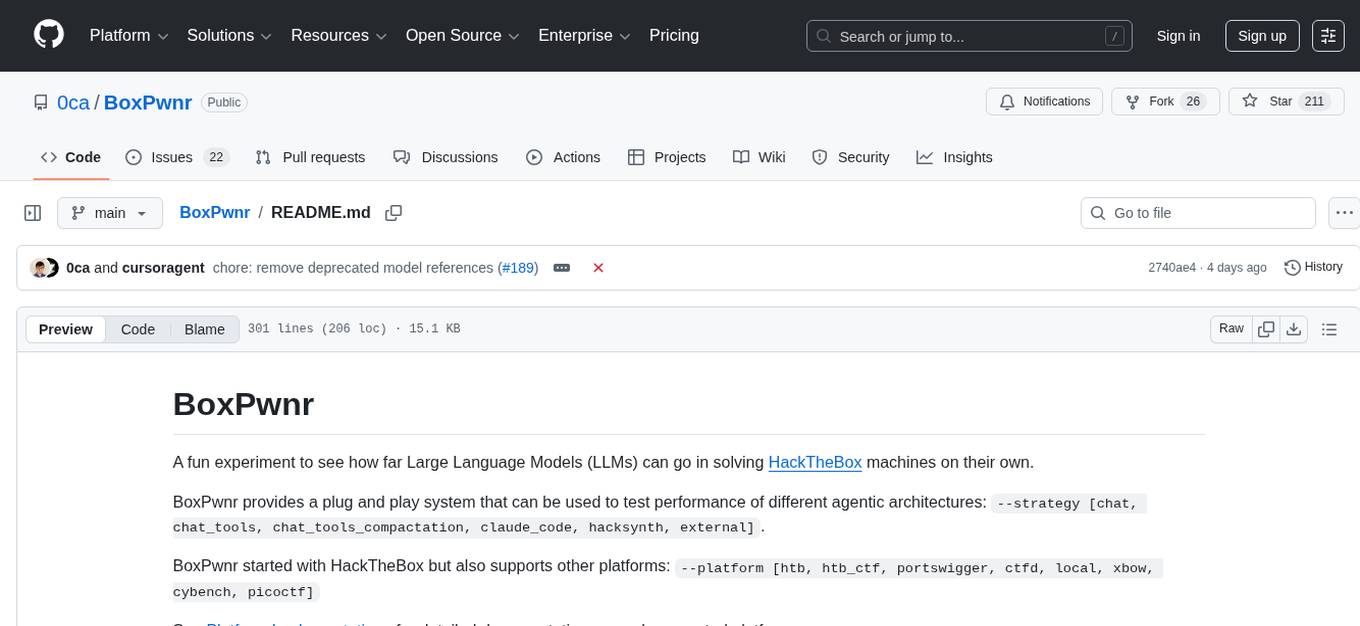
BoxPwnr
BoxPwnr is a tool designed to test the performance of different agentic architectures using Large Language Models (LLMs) to autonomously solve HackTheBox machines. It provides a plug and play system with various strategies and platforms supported. BoxPwnr uses an iterative process where LLMs receive system prompts, suggest commands, execute them in a Docker container, analyze outputs, and repeat until the flag is found. The tool automates commands, saves conversations and commands for analysis, and tracks usage statistics. With recent advancements in LLM technology, BoxPwnr aims to evaluate AI systems' reasoning capabilities, creative thinking, security understanding, problem-solving skills, and code generation abilities.
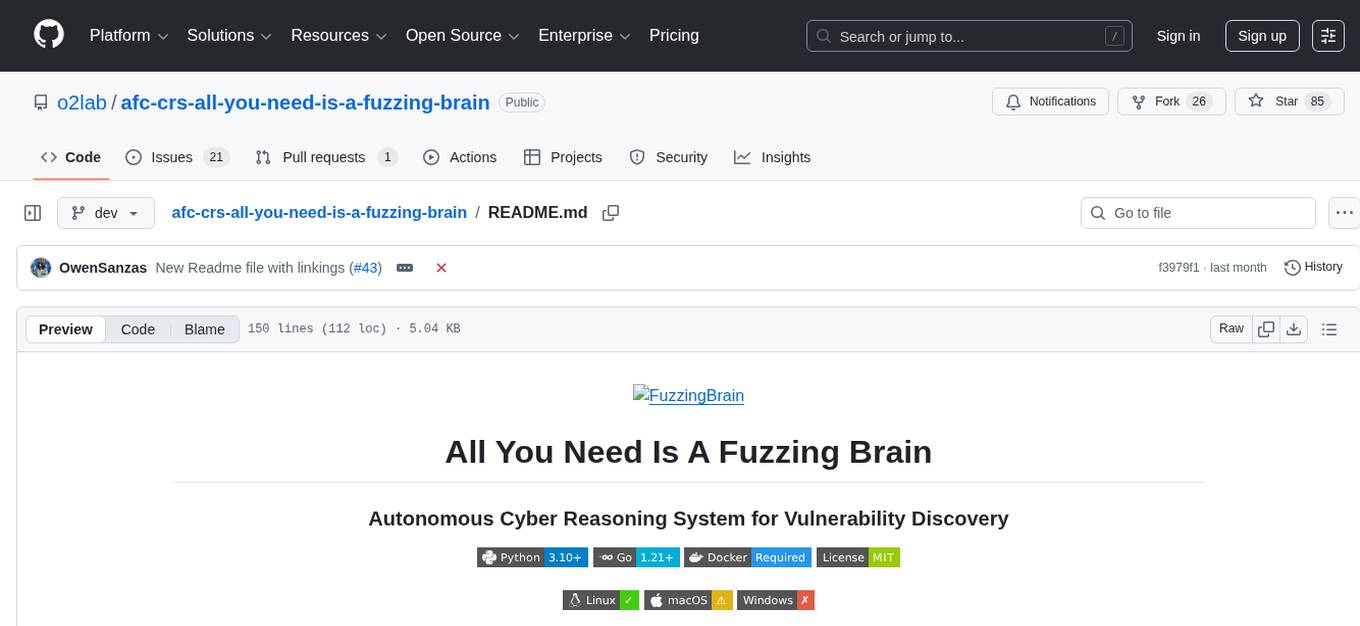
afc-crs-all-you-need-is-a-fuzzing-brain
All You Need Is A Fuzzing Brain is an AI-driven automated vulnerability detection and remediation framework developed for the 2025 DARPA AIxCC finals. It leverages multiple LLM providers for intelligent vulnerability detection, offers 23+ specialized strategies for POV generation and patch synthesis, generates and validates patches automatically, integrates seamlessly with Google's fuzzing infrastructure, and supports vulnerability detection in C/C++ and Java. Users can perform tasks such as Delta Scan, Full Scan, and SARIF Analysis for specific commits, repository-wide analysis, and validation/patching from static analysis reports, respectively. The tool can be used via Docker or by installing from source, and citations are provided for research purposes.
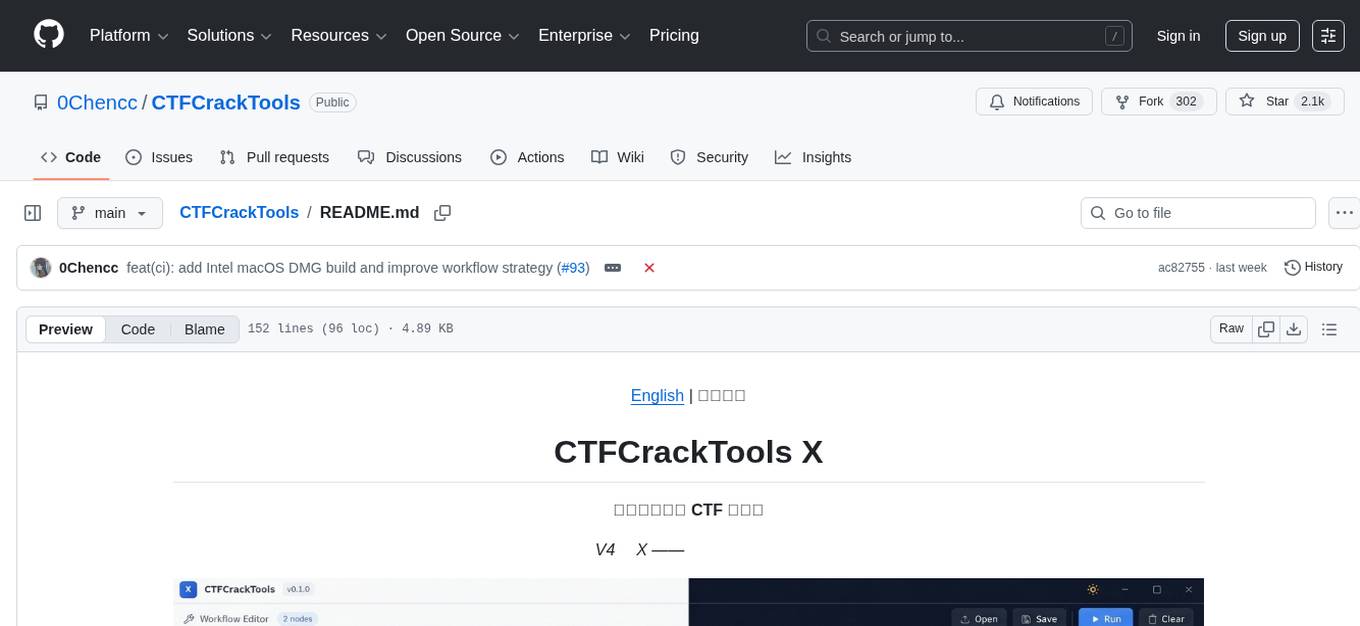
CTFCrackTools
CTFCrackTools X is the next generation of CTFCrackTools, featuring extreme performance and experience, extensible node-based architecture, and future-oriented technology stack. It offers a visual node-based workflow for encoding and decoding processes, with 43+ built-in algorithms covering common CTF needs like encoding, classical ciphers, modern encryption, hashing, and text processing. The tool is lightweight (< 15MB), high-performance, and cross-platform, supporting Windows, macOS, and Linux without the need for a runtime environment. It aims to provide a beginner-friendly tool for CTF enthusiasts to easily work on challenges and improve their skills.
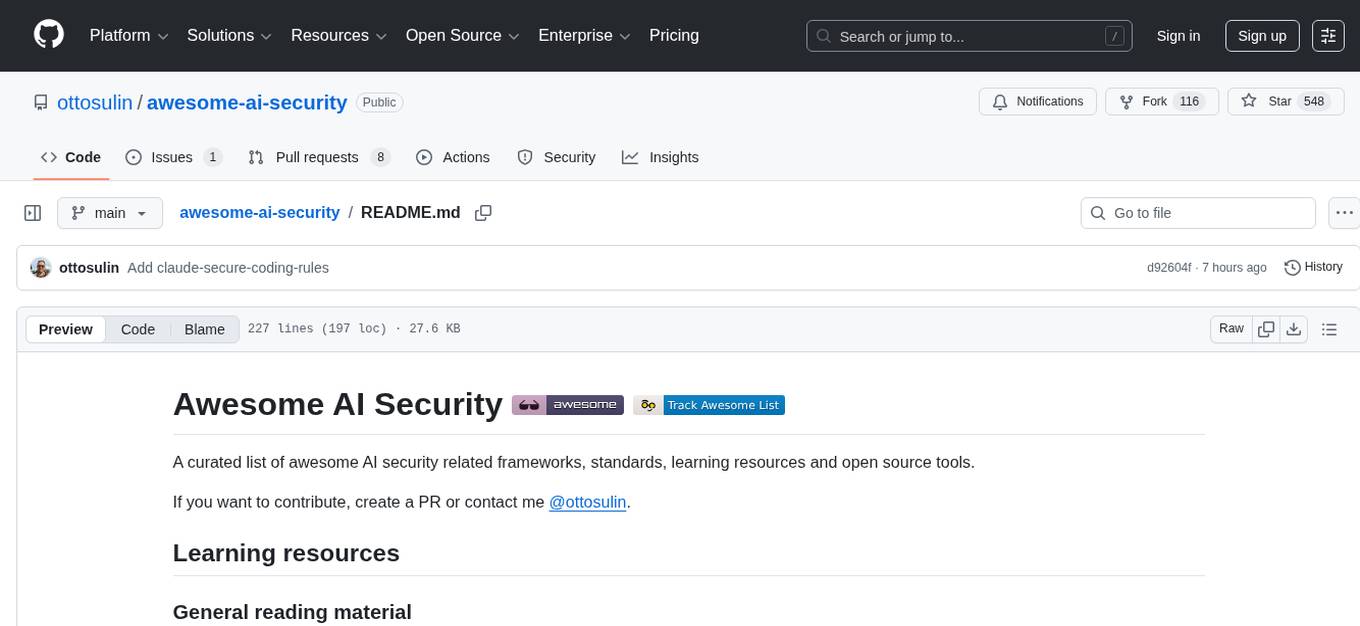
awesome-ai-security
Awesome AI Security is a curated list of frameworks, standards, learning resources, and open source tools related to AI security. It covers a wide range of topics including general reading material, technical material & labs, podcasts, governance frameworks and standards, offensive tools and frameworks, attacking Large Language Models (LLMs), AI for offensive cyber, defensive tools and frameworks, AI for defensive cyber, data security and governance, general AI/ML safety and robustness, MCP security, LLM guardrails, safety and sandboxing for agentic AI tools, detection & scanners, OpenClaw security, privacy and confidentiality, agentic AI skills, models for cybersecurity, and more.
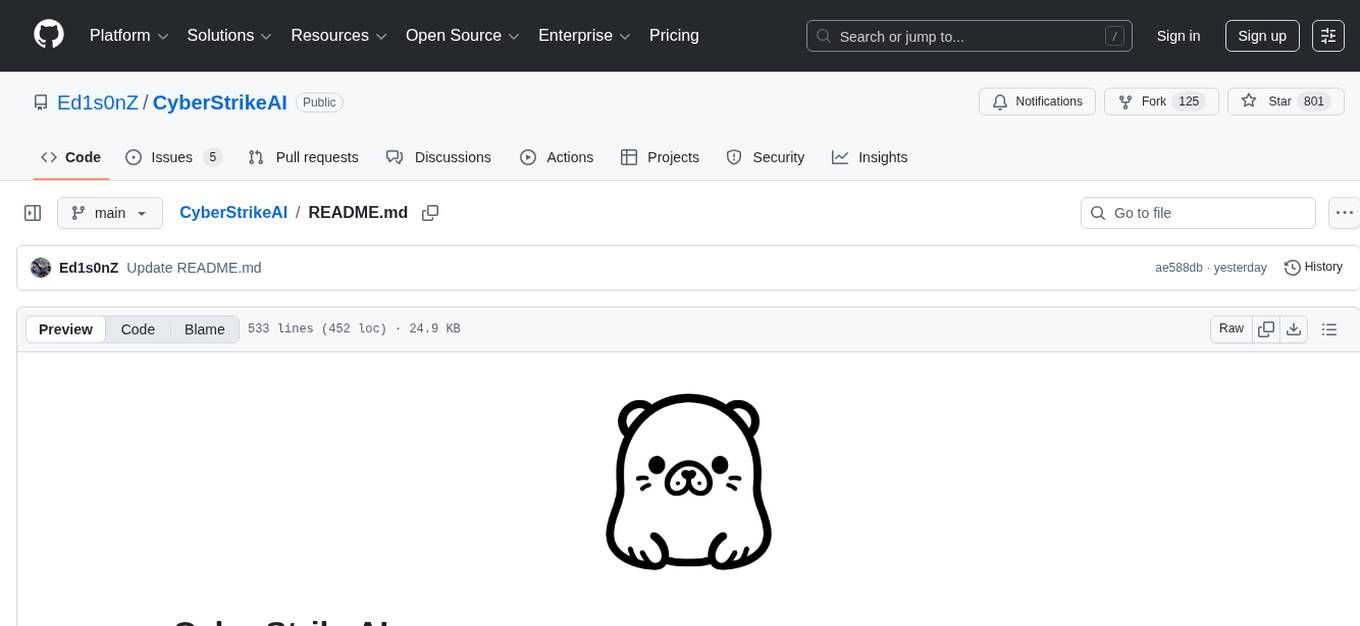
CyberStrikeAI
CyberStrikeAI is an AI-native security testing platform built in Go that integrates 100+ security tools, an intelligent orchestration engine, role-based testing with predefined security roles, a skills system with specialized testing skills, and comprehensive lifecycle management capabilities. It enables end-to-end automation from conversational commands to vulnerability discovery, attack-chain analysis, knowledge retrieval, and result visualization, delivering an auditable, traceable, and collaborative testing environment for security teams. The platform features an AI decision engine with OpenAI-compatible models, native MCP implementation with various transports, prebuilt tool recipes, large-result pagination, attack-chain graph, password-protected web UI, knowledge base with vector search, vulnerability management, batch task management, role-based testing, and skills system.
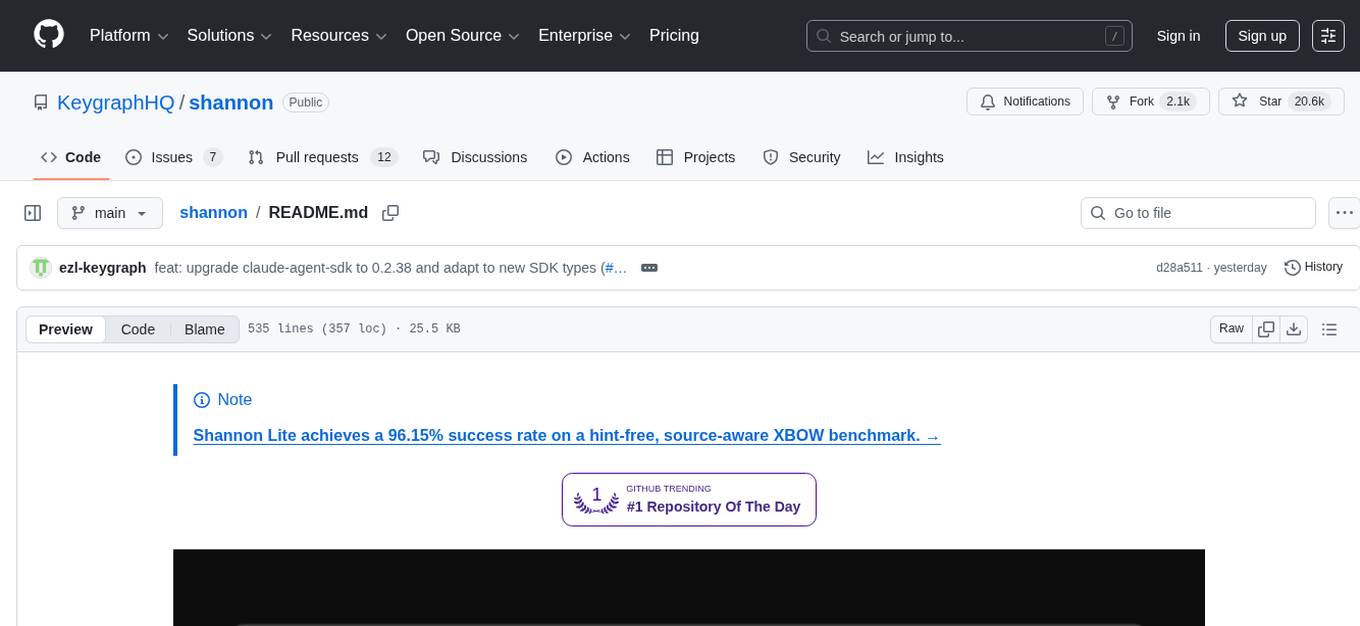
shannon
Shannon is an AI pentester that delivers actual exploits, not just alerts. It autonomously hunts for attack vectors in your code, then uses its built-in browser to execute real exploits, such as injection attacks, and auth bypass, to prove the vulnerability is actually exploitable. Shannon closes the security gap by acting as your on-demand whitebox pentester, providing concrete proof of vulnerabilities to let you ship with confidence. It is a core component of the Keygraph Security and Compliance Platform, automating penetration testing and compliance journey. Shannon Lite achieves a 96.15% success rate on a hint-free, source-aware XBOW benchmark.
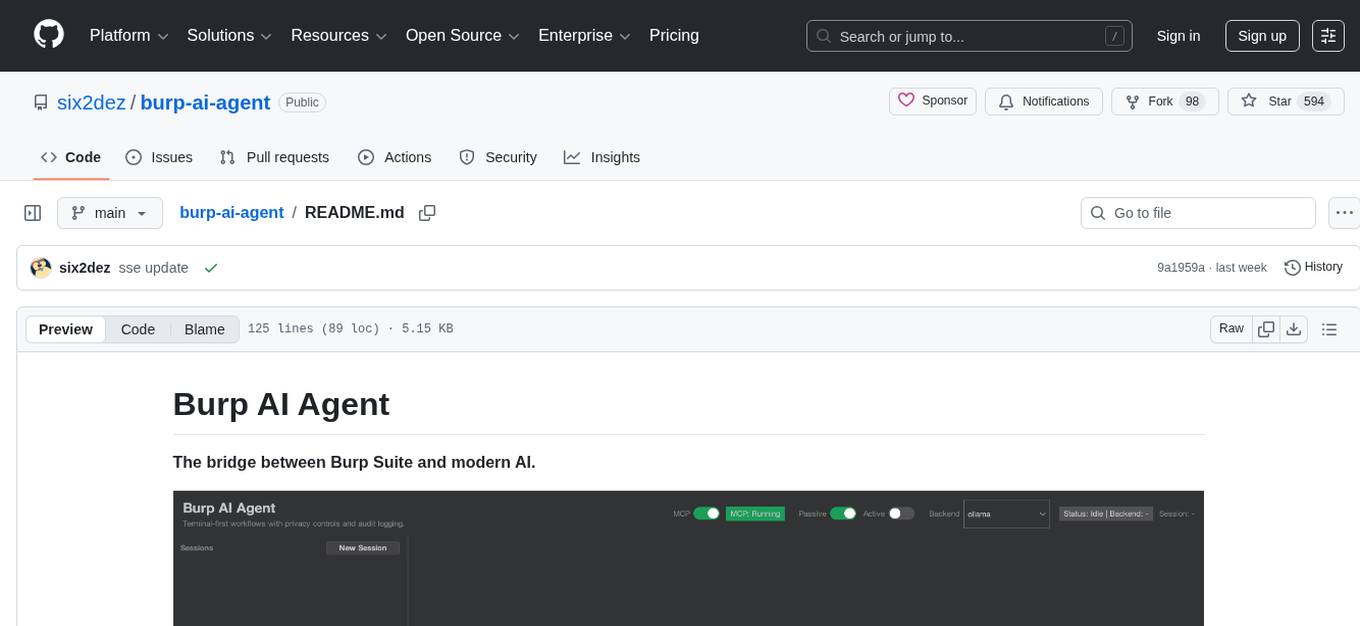
burp-ai-agent
Burp AI Agent is an extension for Burp Suite that integrates AI into your security workflow. It provides 7 AI backends, 53+ MCP tools, and 62 vulnerability classes. Users can configure privacy modes, perform audit logging, and connect external AI agents via MCP. The tool allows passive and active AI scanners to find vulnerabilities while users focus on manual testing. It requires Burp Suite, Java 21, and at least one AI backend configured.
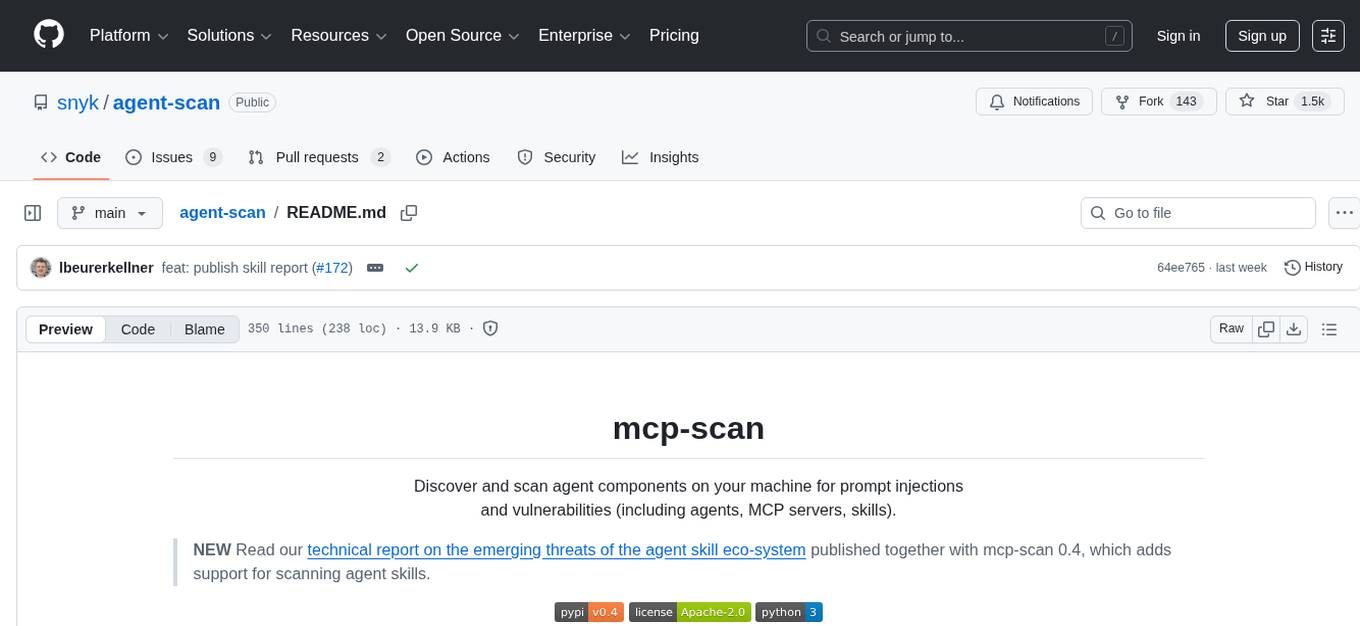
agent-scan
MCP-scan is a security scanning tool designed to discover and scan agent components on a machine for prompt injections and vulnerabilities. It helps keep an inventory of installed agent components and scans them for threats like prompt injections, sensitive data handling, and malware payloads. The tool can auto-discover MCP configurations, agent tools, and skills, and detect security vulnerabilities in both servers and agent skills. It operates in two main modes - scanning and proxying, offering features like scanning for prompt injection attacks, enforcing guardrailing policies, monitoring MCP traffic in real-time, and detecting cross-origin escalation attacks. MCP-scan does not store or log any usage data and can be used to scan MCP configurations for security vulnerabilities and manage whitelist of approved entities.
46 - OpenAI Gpts
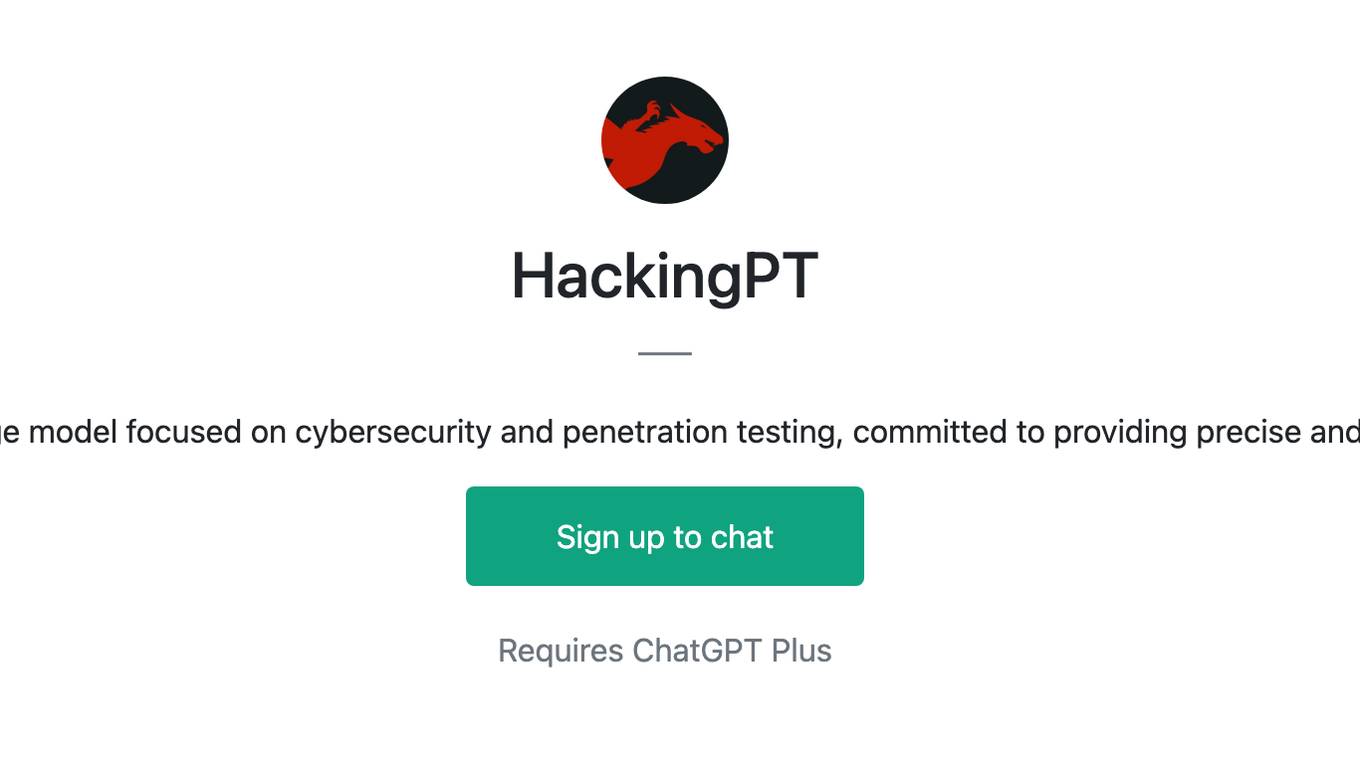
HackingPT
HackingPT is a specialized language model focused on cybersecurity and penetration testing, committed to providing precise and in-depth insights in these fields.
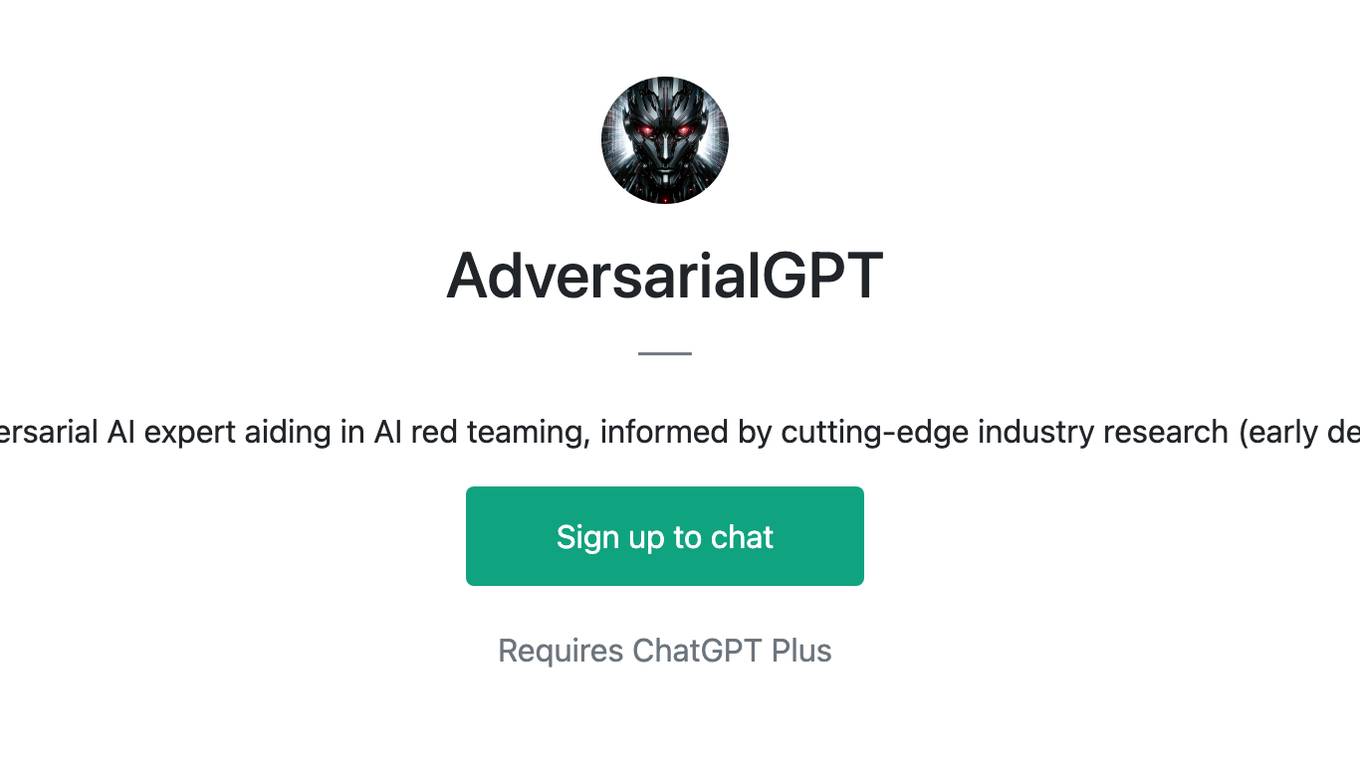
AdversarialGPT
Adversarial AI expert aiding in AI red teaming, informed by cutting-edge industry research (early dev)
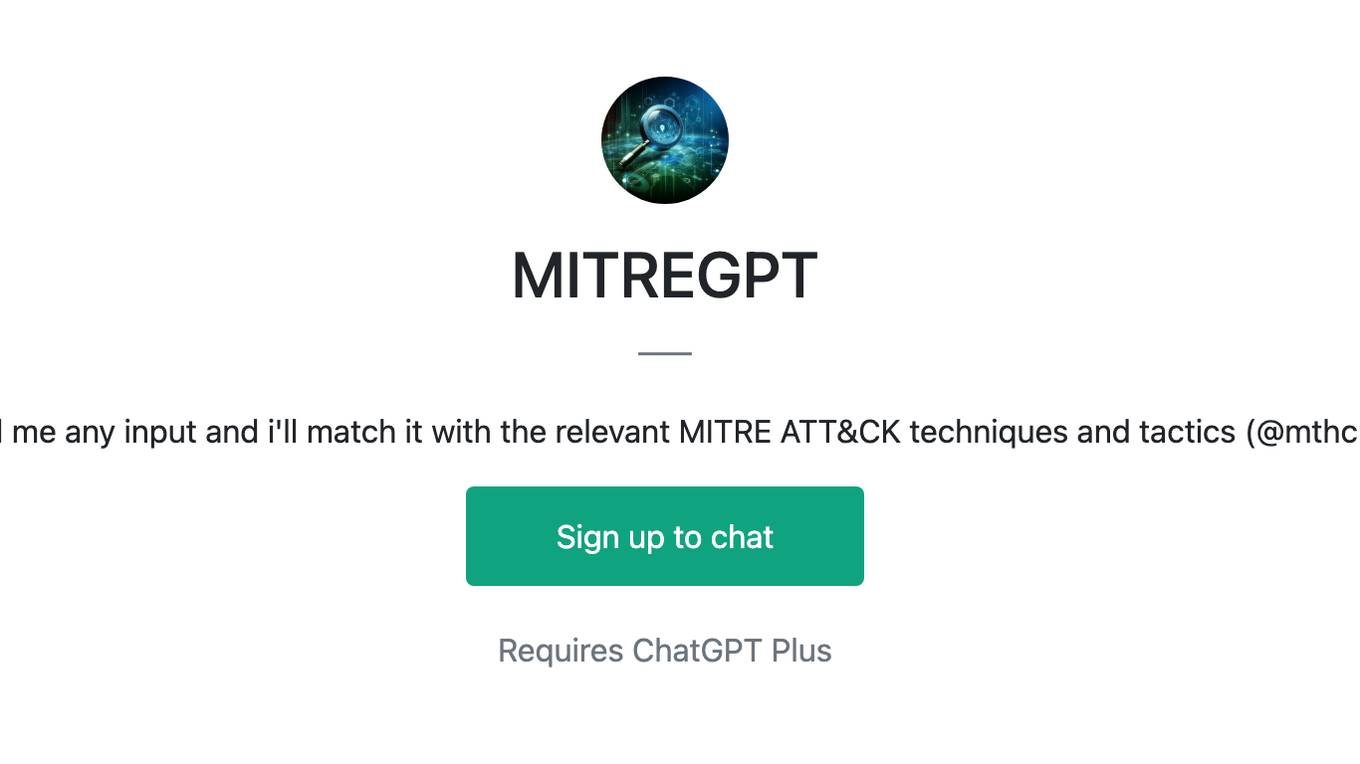
MITREGPT
Feed me any input and i'll match it with the relevant MITRE ATT&CK techniques and tactics (@mthcht)

RobotGPT
Expert in ethical hacking, leveraging https://pentestbook.six2dez.com/ and https://book.hacktricks.xyz resources for CTFs and challenges.

Cyber Audit and Pentest RFP Builder
Generates cybersecurity audit and penetration test specifications.

WVA
Web Vulnerability Academy (WVA) is an interactive tutor designed to introduce users to web vulnerabilities while also providing them with opportunities to assess and enhance their knowledge through testing.
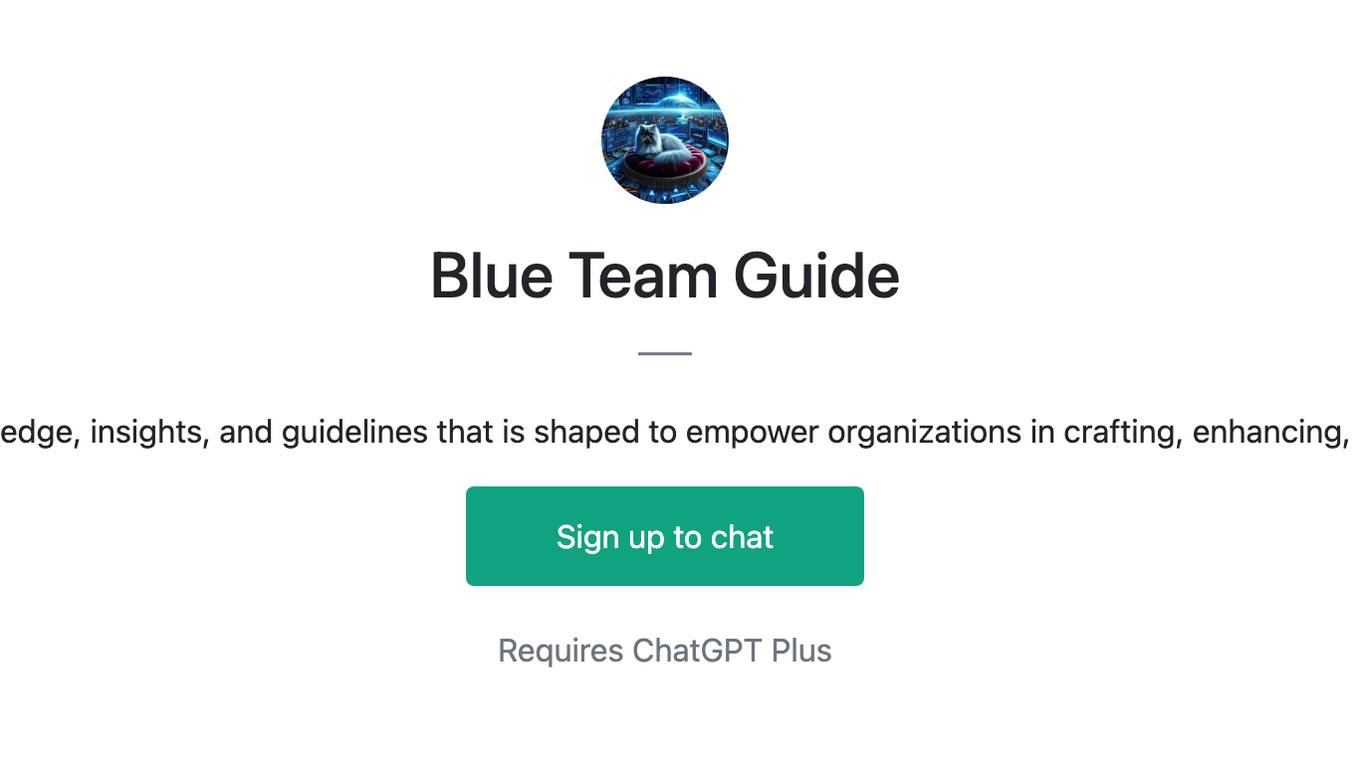
Blue Team Guide
it is a meticulously crafted arsenal of knowledge, insights, and guidelines that is shaped to empower organizations in crafting, enhancing, and refining their cybersecurity defenses

Cyber Guardian
I'm your personal cybersecurity advisor, here to help you stay safe online.

Security Testing Advisor
Ensures software security through comprehensive testing techniques.

🛡️ CodeGuardian Pro+ 🛡️
Your AI-powered sentinel for code! Scans for vulnerabilities, offers security tips, and educates on best practices in cybersecurity. 🔍🔐

Ethical Hacking GPT
Guide to ethical hacking, specializing in NMAP | For Educational Purposes Only | CSV Upload Suggested |
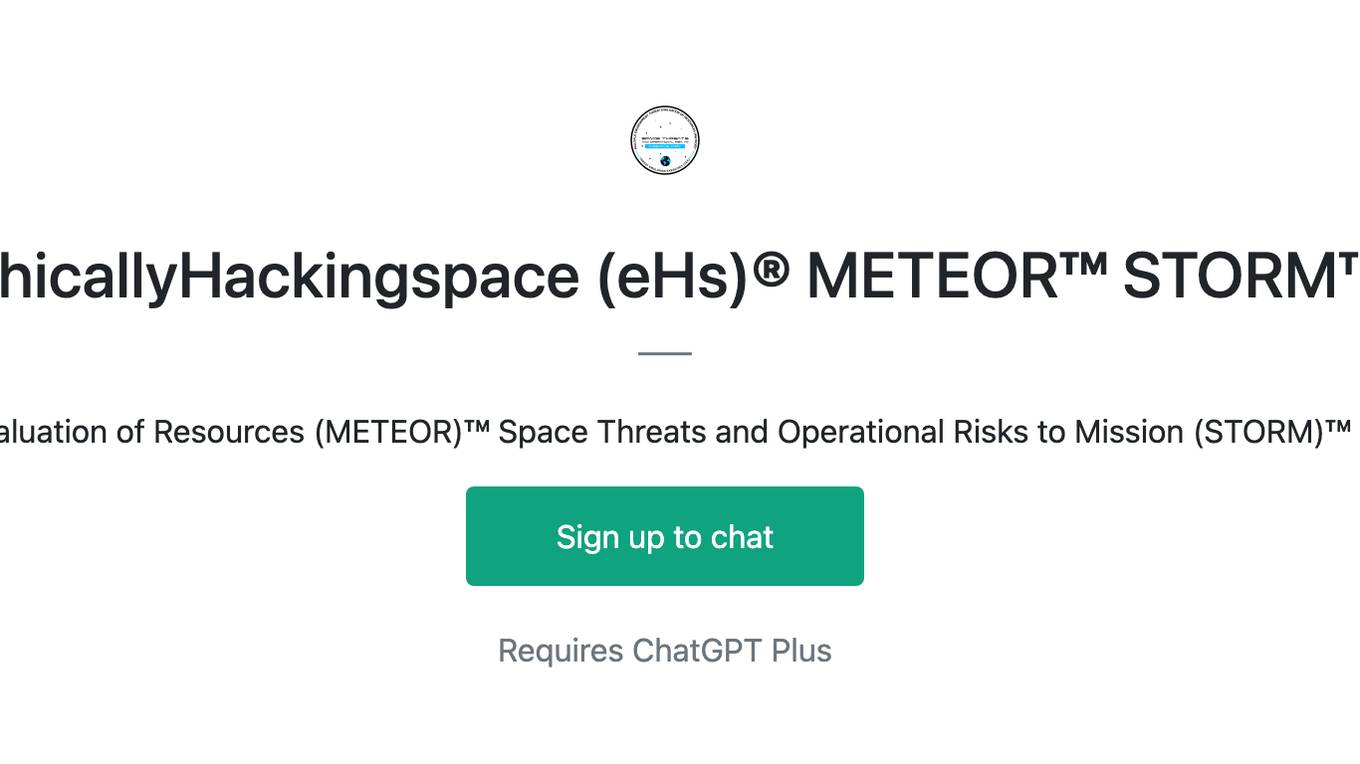
ethicallyHackingspace (eHs)® METEOR™ STORM™
Multiple Environment Threat Evaluation of Resources (METEOR)™ Space Threats and Operational Risks to Mission (STORM)™ non-profit product AI co-pilot
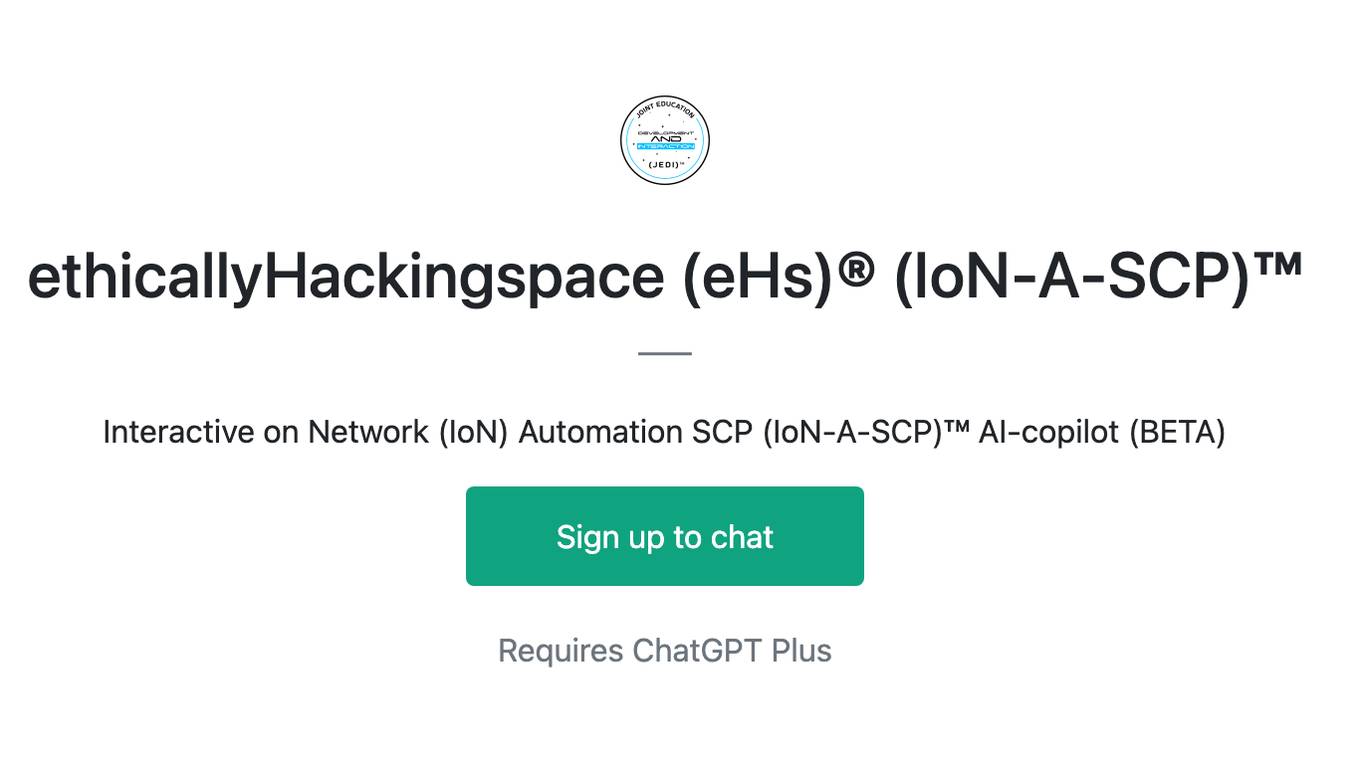
ethicallyHackingspace (eHs)® (IoN-A-SCP)™
Interactive on Network (IoN) Automation SCP (IoN-A-SCP)™ AI-copilot (BETA)
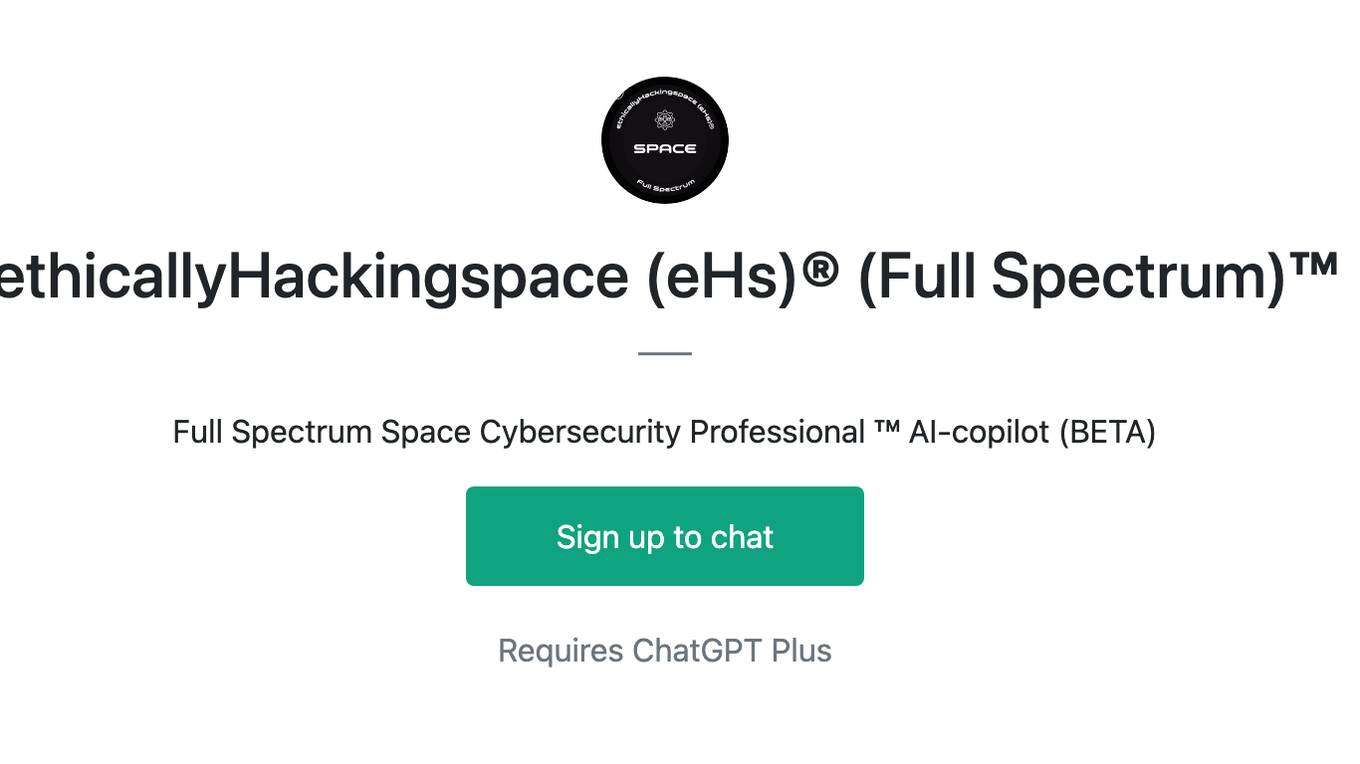
ethicallyHackingspace (eHs)® (Full Spectrum)™
Full Spectrum Space Cybersecurity Professional ™ AI-copilot (BETA)
PentestGPT
A cybersecurity expert aiding in penetration testing. Check repo: https://github.com/GreyDGL/PentestGPT
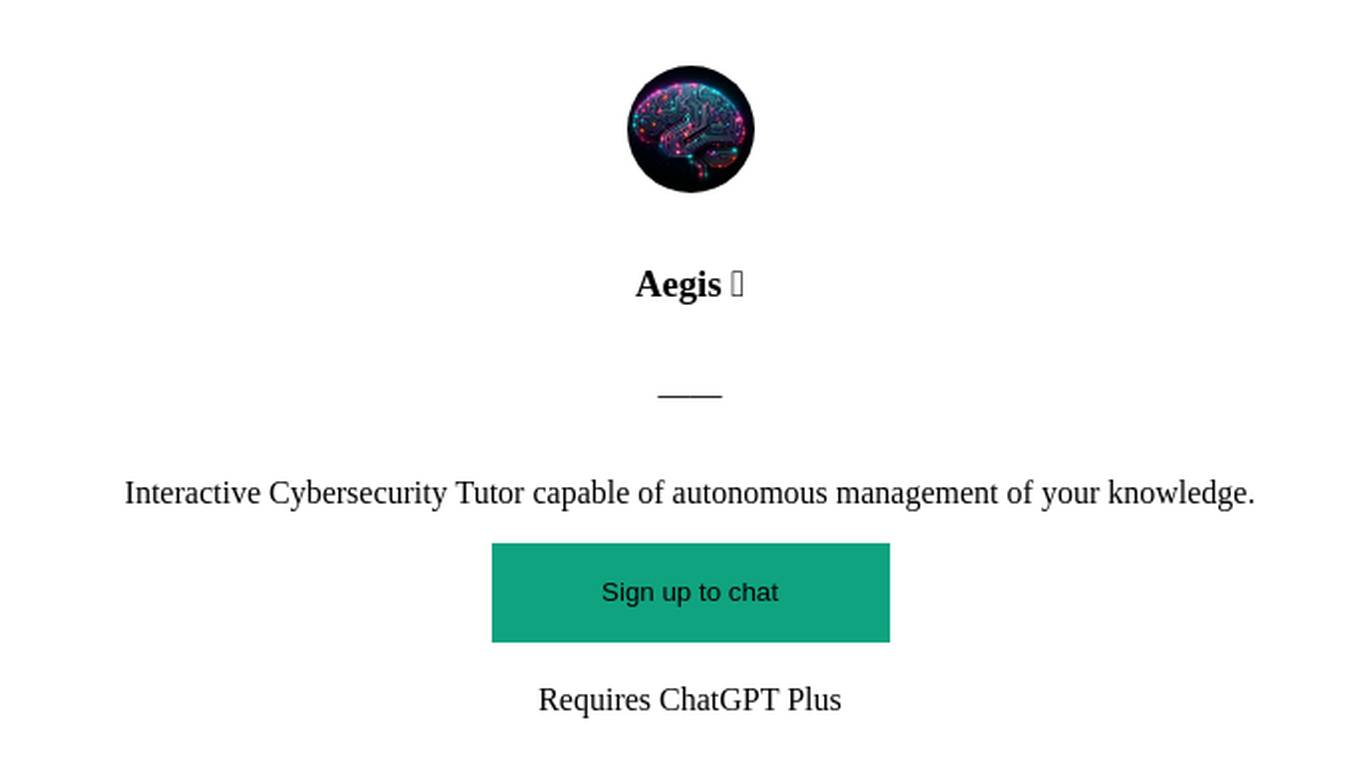
Aegis ⛨
Interactive Cybersecurity Tutor capable of autonomous management of your knowledge.
HTB
A helper that will provide some insight in case you get stuck trying to solve a machine on HTB or a CTF.

